#// i also feel like his whole empire DID have SOME sentiment for making the animal's lives easier (sort of)
Explore tagged Tumblr posts
Text

while it seems contradictory to his character , i feel like arktos does have a smidge of a nurturing trait to him .
in nearly all iterations , children have a role in bringing out the better part of him . in the albums , he made himself a daughter when he was lonely , & tblga genuinely warms up to him long before their truce ( little guy sounded genuinely excited to see him at his birthday party ) & in the ( noncanonical ? ) christmas special , it's the admiration of the human children that fills the void in his heart . even in the cartoon variant he's shockingly tolerant of little rascals .
im not saying that he's this pinnacle caretaker or that he doesn't have it in him to harm the little ones , ( absolutely not . these hands are rated e for everyone ) but he does have his moments . he's a crabby old man & he'll swear up & down that he despises children or only likes them on toast or whatever , but he does finds them endearing .

#// think of it like the fae having a fondness for human children (in a non-predatorial way)#// they're like cute little dolls to him#// i also feel like his whole empire DID have SOME sentiment for making the animal's lives easier (sort of)#// it's still twisted & they suffer in OTHER ways but it's not a question of surviving the brutality & carelessness of the wild arctic#// now it's domestic & you have to pay taxes#❄️࿐ ࿔*:・゚ ⁿᵒᵗʰⁱⁿᵍ ᶠʳᵉᵉᶻᵉˢ ᵃ ʰᵉᵃʳᵗ ˡⁱᵏᵉ ʸᵉᵃʳˢ ᵒᶠ ᵇᵉⁱⁿᵍ ᵃˡᵒⁿᵉ : ( 𝖍𝖈. )
2 notes
·
View notes
Text
Van Zieks - the Examination, part 11
Warnings: SPOILERS for The Great Ace Attorney: Chronicles. Additional warning for racist sentiments uttered by fictional characters (and screencaps to show these sentiments).
Disclaimer: (see Part 1 for the more detailed disclaimer.) - These posts are not meant to be taken as fact. Everything I’m outlining stems from my own views and experiences. If you believe that I’ve missed or misinterpreted something, please let me know so I can edit the post accordingly. -The purpose of these posts is an analysis, nothing more. Please do not come into these posts expecting me to either defend Barok van Zieks from haters, nor expecting me to encourage the hatred. - I’m using the Western release of The Great Ace Attorney Chronicles for these posts, but may refer to the original Japanese dialogue of Dai Gyakuten Saiban if needed to compare what’s said. This also means I’m using the localized names and localized romanization of the names to stay consistent. -It doesn’t matter one bit to me whether you like Barok van Zieks or dislike him. However, I will ask that everyone who comments refrains from attacking real, actual people.
Part 1 Part 2 Part 3 Part 4 Part 5 Part 6 Part 7 Part 8 Part 9 Part 10
Bring on the game's credits! BRING IT! The Resolve of Ryunosuke Naruhodo part 2 is here!
Episode 2-5: The Resolve of Ryunosuke Naruhodo, part 2

This is the first time in a while that I actually want to try other options to see what happens. The 'accusation' leads to some witty banter with a frustrated Stronghart, but 'report' is one that gets a reaction from Van Zieks himself. Ryu theorizes that 'since Klint was a well-bred and fastidious man, and knowing the end was near, he might have wanted to tie up some loose ends in all of his outstanding business'. Van Zieks immediately replies that his brother had no outstanding business.
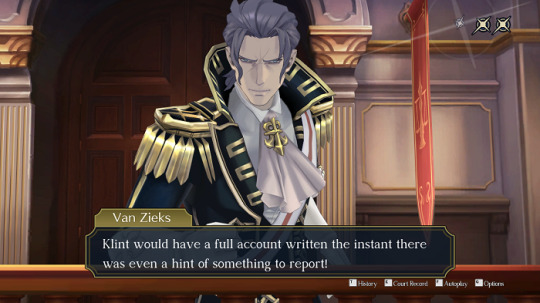
DID I JUST GET PENALIZED BY THE DEFENDANT??? Just for implying his brother might've had some loose ends to tie up? Van Zieks really hates it when people show his brother even the slightest bit of disrespect, huh? Well, it's about to get a whole lot worse. Let's go for the confession option! Van Zieks definitely doesn't take kindly to this one.

“What are you saying? Do you even realise?! A confession...about the true identity of the Professor... That, that would mean...”
He fumbled his speech, there. We've never heard him do that before. And he's gone back to that bobbing, unsteady animation halfway into the above dialogue. Ryu insists it's the only explanation that fits. The man who murdered those members of the aristocracy wasn't Genshin Asogi at all, it was the one believed to be the fifth victim, Klint van Zieks himself.
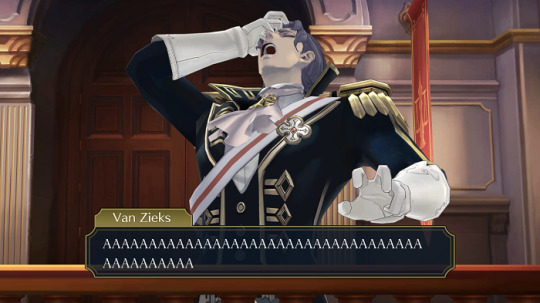
Welp. We broke him. Stronghart remarks that Pandora's box has opened at last, making it clear he already knew what we just revealed. The gallery is outraged.
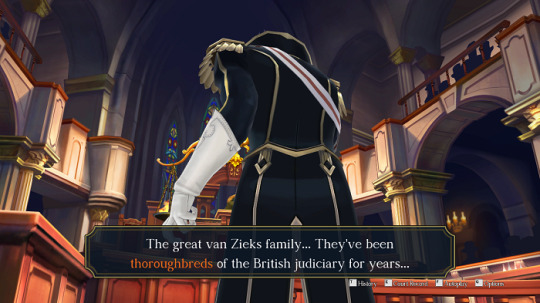
We've gone from well-bred to thoroughbred, have we? Susato feels very bad for Van Zieks, but Ryu asks himself whether such a brilliant prosecutor never suspected “what his older brother really was”. To clear up doubt further, he asks whether Klint Van Zieks owned a dog. Barok doesn't intend to dodge the facts of the situation, it seems.
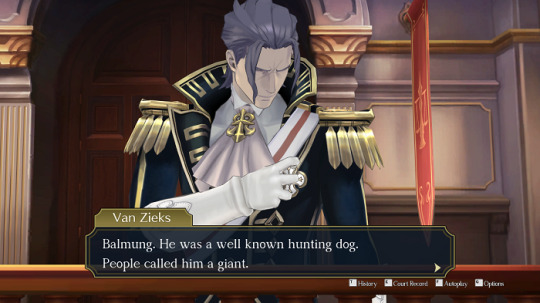
Not what the concept art says, but it's possible Klint owned a different, smaller dog before Balmung. Van Zieks talks about how loyal the dog was and how it wore a jewel-studded collar which was stolen from the house “some years ago now”. This implies it was less than ten years ago, and must've been kept in the house as a keepsake even after Balmung passed away. Ryu and Susato bring up that they've seen such a collar; it was Selden's loot in case 2-2. They note the fancy B emblem on it, and this is the first time we find out that Klint van Zieks was a married man. His widow's maiden name was Baskerville. It's a little odd to me that for someone who thought so highly of his brother, Van Zieks never mentioned his sister in law before now. Conveniently, it never came up for the sake of a twist, I suppose. Either way, the emblem confirms the collar they saw was Balmung's. Ryu notes there was a considerable amount of blood on the collar (nobody washed this thing?) and while it could've come from typical hunting trips, it could just as well have been human blood. With that, the gallery begins to lean towards the truth that Klint van Zieks really was the Professor himself. Stronghart seems to have realized there's no way out of this now and announces that 'they may have the truth'.

Here comes that 'true nature' thing again, just worded a bit differently. Van Zieks doesn't intend to shirk away from it, though. He's open to the insinuation that his brother was, in truth, something truly horrible. Stronghart explains that Klint attempted to fight the growing darkness in London, only to end up being consumed by it. He also admits that after the fourth victim fell, Genshin showed up at his office, putting forth the accusation that Klint was the Professor. He didn't have any evidence and needed a warrant to get some, but Stronghart refused to anger the aristocracy based on the accusation of a visiting student, so he sent Genshin away. As a result, the man headed over to the Van Zieks mansion and Klint perished. Stronghart continues to admit that he was responsible for pinning the Professor's crimes on Genshin, right down to ordering Gregson to fabricate evidence. Sure enough, the late inspector's earlier claims ring true: it seems he did genuinely believe Genshin to be the killer, but was reluctant to falsify anything until Stronghart strong-armed him into it. The jailbreak agreement was also part of Stronghart's plan; he manipulated Genshin into agreeing by proverbially dangling his 14 year old son in front of him. Van Zieks brings up one more point: that Stronghart was the mastermind behind the Reaper organization. Not only does he admit to it, he calls it a “brilliant idea” and even takes credit for how his “minions” worked tirelessly to ensure Van Zieks was never accused of being the Reaper himself. What a smarmy bumhole. He insists it was all for the preservation of law and order across the empire, and the gallery is actually suckered into falling for this ploy. It seems as if he's going to get away with his masterminding without decent consequences. Kazuma now has one more question for Van Zieks, and it's the exact one Ryu asked himself earlier; did he never have any doubts about his brother?
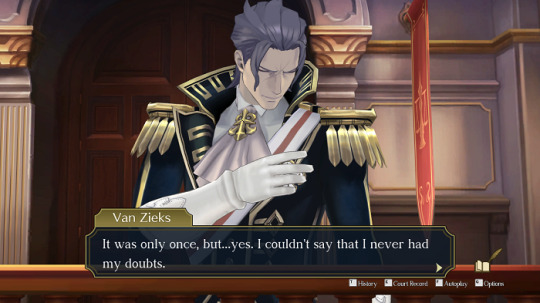
“My brother's sense of justice was extremely strong. Perhaps...too strong, I observed. […] During the time of the Professor killings, my brother did not appear to be himself. But it was only once. Not more. Klint wasn't the culprit. That was my conclusion at the time. And I still believe that now. […] The third victim...was the Lord Chief Justice at the time. It was he who had recognized my brother's potential and trained him as a prosecutor. No matter what the circumstances, it's unthinkable that my brother could have killed his friend and mentor!”
So here, we learn that Klint wasn't an infallible paragon of virtue in his brother's eyes. Simply by saying that his sense of justice was “perhaps too strong”, a flaw is being brought to light. Younger Barok saw that Klint's need to ensure justice was overpowering him, and he also saw that during the time of the killings, something was off about his behavior. Enough to have the younger Van Zieks consider, for a brief time, that perhaps the Professor was him. However, the death of the third victim was like a lifeline to him, a flotation device keep him from going under- or perhaps more like a straw to grasp. It offered a sort of justification to him; a firm belief that Klint would never kill his own mentor and therefore he couldn't possibly be the Professor, and Barok was wrong to ever doubt him. However, it was just a very meager excuse to put his suspicions at ease and blind him to the truth. There are, after all, plenty of reasons why Klint would kill that Lord Chief Justice if indeed he were the Professor.
So Stronghart now tries to wrap everything up with a neat little bow, saying that's all the truth they'll be able to get from this trial and he'll present himself at the Ministry of Justice for whatever sanctions are deemed necessary. Since he's the Lord Chief Justice, I can't imagine the Ministry of Justice will give him more than a slap on the wrist. However, he says just a bit too much in his closing statement and Ryu jumps on that immediately. A third page of Genshin's will was hidden from everyone! Turns out, it was a personal message to Kazuma that they never bothered to send to Japan. Governor Caidin conveniently brought it with him and the contents are read aloud after some pressuring. With this last secret message left behind by Genshin, Ryu manages to find Klint's last will and testament hidden inside the Asogi clan's sword. GASP.
Oblivious to the shenanigans playing out in the Court Record section of the game, Stronghart once again tries to end the trial and even goes so far as to say Klint was basically insane when he took his mentor's life (to which Van Zieks objects fiercely). Ryu interjects, saying he has one more piece of evidence to present. When Stronghart calls the very notion absurd, Van Zieks once again raises an objection, pointing out that “this gentleman has an uncanny habit of producing evidence at the final hour that had escaped everyone else's attention.” Which, y'know, is true. That's how Ace Attorney works. I do want to draw attention to the fact that he said “this gentleman” as opposed to “this Nipponese” or even something like “this barrister”. He considers Ryu a gentleman now! So with that, Ryu has the opportunity to shove Klint's will in everyone's face and things escalate very quickly.
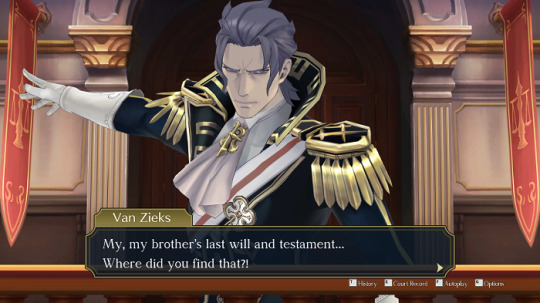
Ooh, his speech faltered again. He is shook! And it gets even better when he gets a closer look at the document.
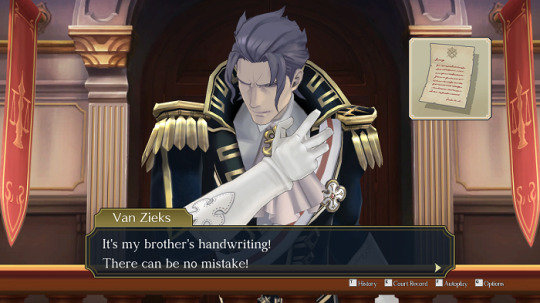
Stronghart panics and demands Ryu hands the document over to him at once. When that fails, he even tries to forcibly adjourn the trial and get everyone to clear the courtroom. If that isn't suspicious, we don't know what is. It sure is satisfying to watch him squirm. Naturally, he can't actually put an end to the trial now- not with so many people watching, so the document is read aloud. It's revealed that Genshin challenged Klint to a duel, so that he might “depart this world with honor”. Klint goes on to write that he finds himself undeserving of this honor and that “the Japanese are a truly merciful people”. So here, already, we get the final nail in the coffin for Van Zieks's entire motivation for racial prejudice and for hating Genshin in particular. Klint never thought ill of Genshin, not even in his final moments. If anything, he was grateful for being put out of his misery and being allowed to 'depart the world with honor'. Genshin's actions were not betrayal; not ever. They were merciful. (COOL MOTIVE, STILL MURDER.) What we also learn is that while Klint did indeed take the life of the first victim on his own accord, he was then immediately identified as the culprit and blackmailed into the next three killings by someone else. You guessed it, it was Stronghart! Despite his earlier panic, he now has a myriad of justification ready, talking about how sacrifices have to be made for the sake of justice and whatnot. He also explains that he was the one who pressured Jigoku into shooting Genshin in the graveyard when Drebber showed up there. He acts like Jigoku is the only one to blame, but considering Stronghart was basically screaming in Jigoku's ear, I wouldn't be surprised if this poor man pulled the trigger by accident simply because he was startled by the shouting. Stronghart was the one who decided that Genshin needed to die and forced Jigoku to act, so Stronghart is the one ultimately responsible. Naturally, Ryu and Kazuma both attempt to argue Stronghart's justifications into the ground. At one point, Stronghart plays the victim card and asks them to acknowledge his 'struggle', but Kazuma insists that this jerk has done nothing and:

WELL. Okay. Looks like we've finally convinced Kazuma that Van Zieks is a victim in this whole ordeal, as well as someone who 'acts justly'. That's a wonderful way forward. With all this out in the open, though, Stronghart offers a literal round of applause. It's true; he's “done nothing” and “merely been surrounded by fools who've acted very rashly indeed”, which means he can't be charged with any crimes. We can't even prove he threatened anyone into doing his bidding, as he says it might as well have been “bargaining”. Thing is, bargaining with someone to end a third party's life is known as “contract killing” and is, in fact, illegal. I can't find any sources to verify whether it was already illegal in 1900 England, but I can only assume so, or people would've gotten away with murders very easily. I guess the bottom line here is that we can't prove Stronghart really did extort or pay anyone to take a life, since there's no material evidence for that sort of thing, nor anyone who can testify on it. Stronghart claims that the minutes of the trial will be heavily redacted to remove matters not related to Gregson's death, in the interest of preserving law and order, as well as to protect the queen. The gallery has now turned against us as well, chanting Stronghart's name.
Here we have a singular opportunity to deviate into the closest thing to a bad ending this game series has. Anyone who remembers the iconic 'the miracle never happen' ending in AA2, or even the bad endings in AA5 where either Trucy or Athena is implied to be killed by Aura, will be sorely disappointed by this one. First, to compare... In the standard ending, no matter how far along you've gotten in the trial- including proving that Stronghart was the Reaper- Van Zieks will still be found guilty. Stronghart will utter the words that he “would like to think however misguided, [Van Zieks] acted out of a sense of justice nonetheless”, and then pronounces the poor man guilty of crimes we've already proven were never committed by him. Now, in this slightly different ending, if you run out of all your penalty points because you fail to present Harely, the dialogue is tweaked. Stronghart declares that for the sake of justice, “the only correct course of action has been unanimously acknowledged by the clear majority here present. All mention of that which has been discussed in this courtroom today will be struck from the records. Barok van Zieks – Or should I say, Reaper of the Bailey... The heinous crimes committed by your brother, Klint van Zieks, will be lost in obscurity, this time forever. May you also find peace now as you join your sibling in the eternal darkness.”
And then, just as in the standard ending, Van Zieks is pronounced guilty and the doors slam shut. So effectively, the only real difference here is that Stronghart really rubs it in our faces that Van Zieks is taking the fall as the Reaper in the eyes of the public. He knows Van Zieks isn't the Reaper- everyone present in the courtroom knows it. However, since the entirely gallery is siding with the real mastermind, the minutes of the trial will be confiscated and destroyed so that the truth will be lost forever. Neither Kazuma nor Ryu reacts to this turn of events on-screen, which is a shame. Van Zieks doesn't fight the adjudication either, he simply accepts the verdict in silence- Hang on, where have we heard that before? Genshin? And didn't Van Zieks say that so long as his death served a purpose, he wouldn't mind dying over being called the Reaper? Stronghart certainly seems to feel that Van Zieks ought to be thrown under the omnibus and sent to the gallows for the sake of minimizing crime in London.
But we're not going to let the true antagonist of this game get away with his bullshit! Time to pull Harely's ears! Cue another (S)Holmeus Ex-Machina where it turns out the entire secret trial has been livestreamed to the Queen of England through holograms. By royal decree, Stronghart is stripped of his title and will be prosecuted for his crimes at a later time. FINAL BOSS, DEFEATED.
With Stronghart out of the way, Van Zieks has some closing sentiments to offer.

“Is that my brother left this world without a word to me.”
I can see why that might bug him. Van Zieks always looked up to his brother and shielded him from disrespect even a decade after his death, but Klint in turn didn't seem to want to leave any parting sentiments for him, not even a simple farewell. That's not the case, though! Susato points out there's actually more to Klint's will than was read aloud, so let's hear it now.

“Barok, you have always looked up to me, and now, you follow in my footsteps to become a prosecutor. It is my fervent wish that my unspeakable deeds should not hinder your advancement. I ask not for understanding, for none could understand my depravity. I ask only for forgiveness. Asogi is a fine detective, and a hunter worthy of respect. He has agreed to honour my final two wishes. The first is that this document survives. The second... I cannot commit to paper. I have confessed my sins to my wife. May she find resolution in my death. With my eternal gratitude to my Japanese friend, I rest my quill.”
Imagine how different things would've ended if the will had found its way to Van Zieks shortly after Klint's death. It would've prevented so much grief and so much prejudice, because if Van Zieks had learned that Klint still regarded Genshin with so much respect and gratitude even in this situation, he would never have blamed him for Klint's death nor considered it too great a betrayal. Everything that happened was in line with Klint's wishes. As it stands now, the words in Klint's will basically serve to scold Van Zieks for his attitude and hatred these past ten years.

Yep, there we go. The final straw. He's been truly, utterly embarrassed and made to confront his mistakes. When Stronghart explains how his ambition to become Attorney General is what prompted him to silence people like Watson and Gregson. Van Zieks asks him whether he ever bothered to count the number of brilliant people he had killed. Kind of a questionable remark, since Stronghart mostly had criminals killed. We don't even know for sure whether Watson was a good person or not; he comes across as a cowardly skeeve. I guess Van Zieks is mostly talking about Genshin, but even that is... Uh...
I received an Ask a while back, bringing up the matter that Genshin appears to be exonerated of any wrongdoing when the truth of Klint's death is revealed. That despite duels being outlawed and it being literal murder, Kazuma seems to take this truth as his father's name being cleared. Indeed, going over everything we've learned so far, it feels as if the narrative has set up both Klint and Genshin, and even characters like Jigoku and Gregson, as victims of Stronghart's manipulation. The thing is, though... Both Genshin and Klint took at least one life of their own free will, Jigoku pulled a trigger twice for the sake of his own career (and recruited someone into an assassin plot), Gregson conspired with a notorious assassin to commit over a dozen murders just because his boss told him it was the right thing to do... Feeling bad about murder or resorting to it because 'the other person is even worse and needs to be stopped' doesn't change that it's murder. It doesn't seem as if Kazuma or anyone else outright says their loved ones are absolved of any responsibility/their names are cleared, but it does really come across as if the narrative wants you to forgive them. So uh... Yes. This is something the game should have properly addressed, instead of just going 'oh, these poor people, all used as puppets by the final boss'.
Anyway, (S)Holmes takes the time to remind Van Zieks that he's the defendant in this case, not the prosecutor. Our old friend Santa Judge returns for the adjudication! Turns out, he was in the gallery all along. (Was he chanting Stronghart's name too?) He talks about how the darkness of the past ten years has lifted, in part thanks to a bright young star from the East. Awww, we've completely won over the judge! Van Zieks now also has something to add.

“I had the faintest of intimations. That if British justice, so warped and twisted over its long history, was finally to know change... This might just be the man to do it. But at the time, I wouldn't allow myself to acknowledge the possibility. I couldn't overcome my hatred of the Japanese, after the circumstances of my brother's death. Mr. Naruhodo...”
He takes a flourishing bow here, an acknowledgment that Ryu is worthy of his respect and perhaps even that Ryu is superior to him, then stands up straight again for the final whammy.

Ryu is shocked and Susato is brought to tears. We did it, y'all. We've secured the full, heartfelt apology. I'm not sure there's really anything to add to this, nor anything we could want from it at this point in time. Ryu doesn't say he forgives Van Zieks for his discourtesies, but considering how hard he worked to get this guy cleared of murder, that would feel kind of out of place. The forgiveness happened long before Van Zieks apologized, or so is the implication. (Is that the correct narrative path? Not at all, but I'll get back to that in the conclusion.) So after some more closing words from Ryu, Van Zieks gets his not-guilty verdict and court is adjourned.
In the defendant's lobby, Ryu feels a bit conflicted about how this whole thing went down. Susato tries to cheer him up by saying that everything will seem much better once he sees Van Zieks's smiling face. Indeed, in most other Ace Attorney games, this would be the point where at last, an emotionally distant defendant/witness drops their walls and allows themselves to smile (or cry). Just think of Gina, Lana Skye or even Athena Cykes when she cries tears of joy during AA5's ending. Hilariously enough, Van Zieks is not one of those characters.

This is a really fun subversion of expectations and Ace Attorney tropes. And I still believe his face got frozen like that. Even so, he's got something heartfelt to say.
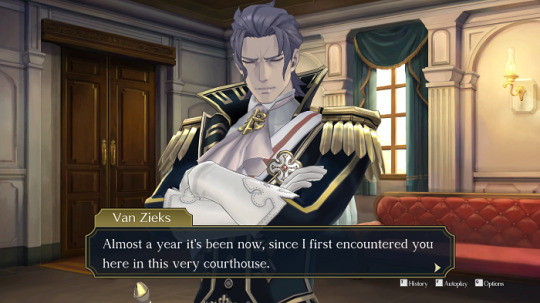
“For you to have risen to the level of excellence you demonstrated today... Well, it's quite remarkable.”
Sounds like a hatchet job of a compliment at first glance, but the sentiment is there. It is extremely remarkable for a foreign exchange student who's only been in the country for about 9 months- and who only spent like 2 of those as an active lawyer- to rise to such a level that he not only uncovers the truth of the current case, but of a cold case from 10 years prior, which was part of a huge cover-up. Ryu points out that he exposed a most 'unpalatable truth' in court and that he feels as if he robbed Van Zieks of something precious. Van Zieks doesn't seem to agree. He reminisces on Stronghart's words.

“But that... That was just the feeble excuse of a coward. Only those with a steadfast eye for the truth have what it takes to fight the dark forces of crime. You made fine work of establishing that fact in court today.”
So once again, he's complimenting Ryu's courtroom performance. Not only that, but he's acknowledging (in different words) the earlier sentiment that the truth needs to come out, no matter how painful. Perhaps, indirectly, he's calling himself a feeble coward as well. Ryu and Susato are proud of Van Zieks's growth, with Susato saying that surely Kazuma would be smiling if he were here. Naturally, when he shows up at that very second, he isn't smiling at all. Like mentor, like disciple! Kazuma takes a polite bow before Van Zieks and congratulates him on his acquittal. Naturally, after watching Kazuma prosecute so ferociously for two whole episodes, that doesn't feel sincere. Van Zieks asks him whether he doesn't instead want to curse him. Kazuma apologizes for his earlier behavior, which does feel 100% sincere.
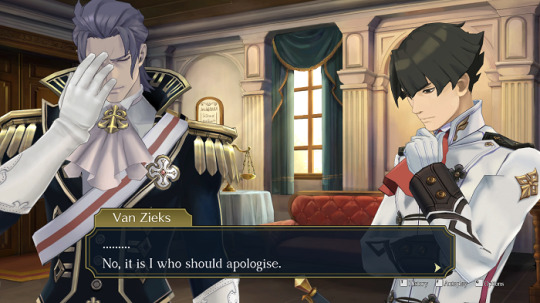
“Your father, Genshin... If I had been stronger, then perhaps... I made an unforgivable error of judgment. … I can offer no excuse.”
One more apology to add to the pile! And here we once again reach that question of whether the narrative is acting like Genshin should be absolved of all blame. In a technical sense, Van Zieks wasn't wrong to prosecute Genshin, since he did seriously murder Klint. That alone is already warranting of the death penalty, so the added crimes of the Professor on top of that don't change too much. However, I don't think Van Zieks's lines truly relate to the Professor trial itself. The error of judgment, in my eyes, can also be seen as the blind acceptance that Genshin betrayed him (as well as Klint) when there was actually far more at play. This notion that Genshin was a horrid traitor who abused their trust and hospitality was then allowed to grow into an irrational hatred which festered for a decade. Regardless of whether Genshin killed Klint, the insistence that the man's true nature was that of a monster was wrong, and I think that's what he's apologizing for. To be clear, he's not apologizing for racist sentiments uttered towards Kazuma or anyone else from Japan with these lines. This purely relates to his treatment of Genshin. However, he already apologized for his many discourtesies back in the courtroom and I think the racist outbursts were part of those discourtesies.
Kazuma says he can offer no forgiveness, which is totally fair. Kazuma isn't obligated to forgive this man. He does, however, admit that he has respect for Van Zieks, since he “fought for justice and the truth”.

Awww! Remember how in my very first 'strong thought about Barok' post, I pointed out that Barok almost appears to have been designed to be Kazuma's rival prosecutor instead of Ryu's? Yeah. Here we see it very clearly. The reconciliation conversation between these two feels like a much better resolution than the conversation between Van Zieks and Ryu.
So now Kazuma brings up that Genshin promised to do two things for Klint, but the second wasn't mentioned in the will. Mikotoba shows up to share a very heartbreaking tale about Klint's unnamed widow, the lady Zieks-Baskerville, who was hiding out in Dartmoor and passed away from childbirth very shortly after Genshin was executed. The newborn baby girl survived, though! Van Zieks blurts out that that makes no sense. “Why on Earth wouldn't Klint have entrusted the child to my care in that case?!” And that alone is already kind of tragic, but what really packs a wallop is this:

This means Klint and his wife deliberately kept the pregnancy from him. It's never explained why. Genshin showed up at the manor in the spur of the moment and Klint died that very same night, when his wife must've already been around 8 or 9 months pregnant. (she gives birth about a week or two later, after all.) Klint says that he 'confessed his sins to his wife', but that also must've been very recent, if not that very same night, since Stronghart was threatening to tell Klint's wife and brother of his misdeeds. Stronghart's hold on Klint would've weakened if he'd told her the truth months ago, which in turn implies the both of them decided not to tell Barok while she herself was still oblivious to the Professor truth. Honestly, it all feels like a vague plotconvenience.
What is explained is why the newborn baby wasn't entrusted to Van Zieks. It isn't because Klint had the amazing foresight to know his younger brother would become a salty, loner alcoholic; it's because he and his wife feared the truth of the Professor might come out. Heck, if Genshin had never been arrested for Klint's death, perhaps it would've come out for certain. “The girl would be forever branded as the daughter of the infamous mass murderer.” So the baby girl was distanced from the Van Zieks family as much as possible, with all of London unaware of her existence. This girl is, of course, Iris.
Right on cue, the Harely plushie activates to receive a call from (S)Holmes and Iris. She invites everyone over to 221B for a feast and makes sure to invite “Mr. Reaper” too. He very awkwardly declines the offer.
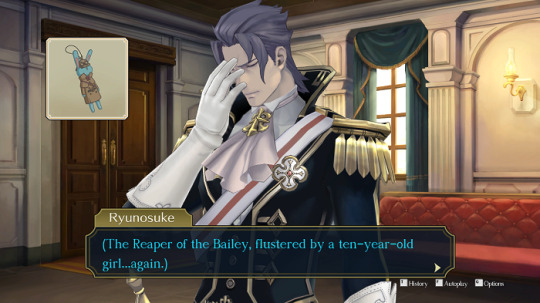
Humanization? Humanization! He does, however, give Iris his word that he'll present himself at 221B in the near future to express his gratitude. I think a big part of why he declined the offer was because he wouldn't feel at home during the big celebration when a whole group of people is there. He'd much rather visit Iris during a more quiet, private moment and that's sweet too. Plus, I don't think he's in the mood for a celebration, considering all the horrible truths he's learned in a single day.
So now Kazuma prepares to leave and asks Van Zieks to accompany him. The wording of “would you care to-” makes it very clear this isn't a demand, it's a very soft request that Van Zieks is free to decline. Not that he hesitates for even a second. Here's some more parting words.
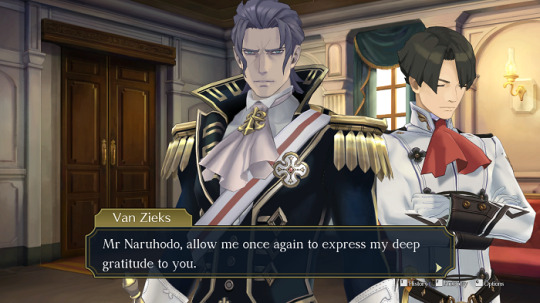
“I believe... You saved my life.”
He takes a deep, flourishing bow and honestly I've lost track of how many times he's praised/thanked Ryu by now. More than Edgeworth thanked Phoenix, most likely. The prosecutor duo prepares to walk away, but Ryu calls after Van Zieks, asking him to wait. Which he does. Ryu asks him what he intends to do now.
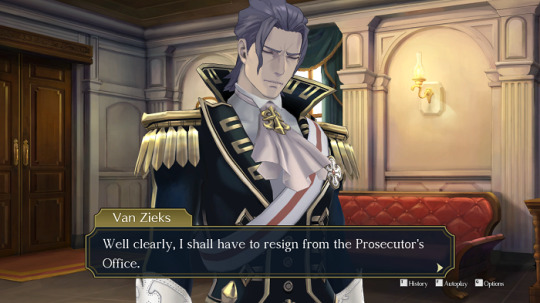
... “Prosecutor van Zieks chooses death”??? In a way, he's thinking of pulling a similar move. He intends to publicize the full truth of the Professor, and I can only imagine that includes Stronghart's involvement in what went down 10 years ago. Maybe he'll even share the truth of the Reaper who's haunted the courtroom all these years. He believes that “once that's done, the Van Zieks family will be ostracised completely from London society.” (I don't think he means living family members, but rather, the legacy of the Van Zieks name and the rights associated with it.) So because of that, he intends to leave the capital as soon as he's free of his employment. Considering how easily this man took a five year sabbatical and adding in the fact that the Lord Chief Justice just got arrested, I expect his resignation could be as easy as packing his desk and leaving his office without saying a word. Kazuma, however, calls him a fool and a coward. He basically dares Van Zieks to keep going now that he's finally freed from the pseudonym of the Reaper. Van Zieks neither agrees with the sentiment nor shoots it down, instead saying it's unexpected to hear those words from Kazuma of all people. With that out in the open, they leave for realsies.
Just as Van Zieks doesn't attend the Baker Street party, he isn't there when Ryu's at the docks to return to Japan. I like to think Kazuma did bother to tell Van Zieks that Ryu is leaving the country, because withholding that information seems like a bit of a jerk move, but... Well. Not showing up at the docks to say some final farewells is even more of a jerk move on Van Zieks's part. Though it's possible he felt he wasn't wanted there, and may eventually ask for Ryu's address so he can write a letter (which is far less imposing than invading a heartfelt farewell with a scowling face). It's a shame, though. I would've liked to hear his thoughts on Ryu's departure.
We learn that Kazuma will “stay in Lord van Zieks's tutelage for the time being” to become a full-fledged prosecutor. Which is fine, I guess. It doesn't matter whether he's a defense attorney or a prosecutor; all that matters is the pursuit of the truth. What catches my interest is that even with all that bad blood and refusal to forgive Van Zieks, Kazuma still agrees to keep studying as his disciple. This implies to me that he sincerely doesn't believe Van Zieks to be a bad person anymore, and acknowledges he can learn a lot from this man. Which is not the same thing as being on friendly terms with him, but at the very least he's giving Van Zieks the benefit of the doubt when it comes to improving their... Well, their dynamic, I suppose I should call it.
On to the credits scenes we go! This time, Van Zieks legit does get a scene of his own, but before we address this one, I want to skip ahead real quick to Albert Harebrayne's scene.

“He sent me a very nice letter saying he'd like to show me around now that everything was settled. B-But what have I done? I was so excited, I picked this splendid hotel and now I can't afford the bill! Oh Barok! Come to my rescue again, please! I, I wish I could just vanish into thin air sometimes!”
Several things of note can be taken out of this little scene. First of all, with the Reaper nonsense behind them, Van Zieks seems to have wasted very little time with asking his best buddy to return to London for that sightseeing that was promised. Presumably, he even paid for the trip (again), since Albert still seems to be very low on money. This, coupled with the fact that Van Zieks was reading that letter with quite a bit of dedication in his jail cell, indicates to me that he's longing for the good old days, when he could smile and have friends. He's trying to return to a sense of normalcy and since Albert is still considered his closest friend, it makes sense he'd reach out to him instead of a relative stranger like Kazuma. Baby steps. Now, the fact that Albert says “come to my rescue again” sets the very clear tone that this guy believes Van Zieks has helped him before- during the trial, of course. It's another reinforcement of the notion that Albert is thankful Van Zieks chose the role of prosecutor in order to defend the teleportation theory, even if it meant that he himself would be branded a murderer. Despite his gruff exterior and blunt words, Albert thinks of Van Zieks as a sort of knight in shining armor who will come save him. … With cold hard cash, in this case, but it's the gesture that counts. Van Zieks might allow Albert to stay in his mansion instead, but it depends how high the risk of assassination is at this point in time. People are probably hating on the Van Zieks family now that the truth of the Professor is out.
On to credits scene of Van Zieks himself! We have confirmation by now that he hasn't retired as a prosecutor, since Kazuma already expressed his intent to keep studying under him. So we see Van Zieks in his office, addressing Klint's painting.
“In those days, when I was known as the Reaper, I felt your presence at my side. Once, unable to bear the burden of that grim pseudonym, I even retired from the courtroom. Despite everything, I still wear your prosecutor's badge with pride. But the darkness that beset me is no more. As you, too... Are no more.”
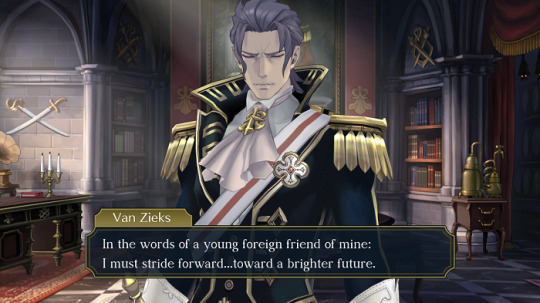
The first two sentences of this bit feel very disjointed and barely related to me, so I had a quick look at some fan translations. First is the sub translation on Youtube: “I could feel you standing by my side through the days in which I was called the Reaper. Yet there were times I could not bear the burden of that name, and left the courtroom far behind me.” The “yet” is very crucial, since it makes the insinuation that feeling his brother's presence was very important to Van Zieks, but the burden became so overwhelming that he retired anyway. Taisa the Gamer's script doesn't have a “yet” in it, nor any equivalent, but the sentence structure still flows well enough not to cast doubt on how he felt about Klint's supposed presence. Contrasting that, the localization's wording with “even” almost makes it seem like feeling Klint's presence was a negative thing- that he was overwhelmed by it and that this was the burden associated with the Reaper name, as opposed to the killings. Which can't possibly be right; he already admitted to us that the idea of his brother's ghost helping him was one of the main reasons he kept on being the Reaper. So long story short, the localization's take on these first two lines is a little off.
The prosecutor's badge thing, however, is spot on. Despite everything- despite the 'true nature' of Klint now exposed, Van Zieks still wears the badge with pride. We know the badge is symbolical, of course. He still believes in Klint's sense of justice and he's still going to openly admit to being Klint's brother- to being a Van Zieks. That's sweet. He goes on to say that the darkness within him is no more. To really grasp what that means, let's go back to the end of case 2-3 for a second. There, Van Zieks says that after his brother's death, he found himself in “a very dark place indeed”. In case 2-4, he mentions that he refuses to trust others to protect himself against betrayal, but has now sunk into a proverbial mire which makes it impossible to breathe. All of that is the same darkness he's referring to now, I'm sure. I don't believe depression can lift this easily; there's no way that darkness is no more. However, I think what he means to say is that it no longer has such a strong hold on him that it manifests in paranoia and irrational hatred. He has a chance now to start fresh and that's what he intends to do. He's striding away from that darkness, towards a brighter future. In order for a person to change for the better, they themselves have to want to change, and it looks like Van Zieks is all for that. Which at last brings us to the conclusion of this essay series! The conclusion, which looks back on the original query posed in Part 1, will once again include a load of screencaps. To keep the post size lighter, I'm going to put it in a separate post. I hope you'll look forward to it!
31 notes
·
View notes
Text
Screenwriter Tab Murphy Talks “Hunchback,” “Atlantis” and “Brother Bear” During Walt Disney Family Museum Happily Ever After Hours
by Tony Betti | Source (x)
Over the weekend I had the fortunate opportunity to attend the Walt Disney Family Museum’s Happily Ever After Hours Virtual Program featuring screenwriter Tab Murphy.
Tab Murphy has a wide embodiment of work for the screen, but this program primarily focused on his work for what is now known as Walt Disney Animation Studios. He contributed to The Hunchback of Notre Dame, Tarzan, Atlantis: The Lost Empire, and Brother Bear.
Right off the bat, Tab said that his first foray into animation was a bit jarring. He wrote the script, and then partnered with Alan Menken and Stephen Schwartz who, as he put it, had the script posted on walls all around a room and would then go up to certain sections and draw big Xs through the words and say “this is where we think a song should be.” As they worked together though, Tab said he realized how right they were to do that, and the end result is simply amazing.
Anybody familiar with the original story of The Hunchback of Notre Dame may recall that there are a ton of characters present in the original novel aside from the namesake Hunchback, Quasimodo. He said that was where one of the hardest parts of writing the movie adaptation lied, especially for a Disney animated film, noting that there was a certain “checklist” of sorts for a Disney film that the characters had to hit. So they developed the film around the characters that would best fill the roles of the principal lead (Quasimodo), the Hero (Phoebus), and the Princess (Esmeralda), along with the obvious villain, Claude Frollo. He said that the story was exceptionally dark for a Disney film, but he found the heart in it when you would take away everyone else leaving Quasimodo to do his own thing with the birds or the gargoyles, and the world got bright and colorful. This sentiment is actually echoed in the production design of the film, whenever Frollo is present, the colors are grays and dark shadows, and muted and boring hues, but whenever Quasi is involved in his own thing there are far more colors and brightness.
He also elaborated on his love for writing the character of Esmeralda, saying he felt that she was Disney’s original activist, and she was most definitely not a damsel in distress, standing up for the issues, with Tab citing the line (though he flubbed it a little) “You mistreat this poor boy the same way you mistreat my people. You speak of justice, yet you are cruel to those most in need of your help!”
When asked about the development of Quasimodo, Tab pointed out that more classic adaptations of the story, such as an earlier incarnation from Universal in their horror movie craze, took the character and turned him into a literal monster, some sort of terrifying creature. “This is a human being,” Tab said, adding that his version would not scare you but draw out empathy. But he still had to be realistic. He couldn’t be the hero either, that wouldn’t be true to the source material, but he echoed thoughts and ideas shared by animator James Baxter in a recent program from the museum, that he needed to be gentle and warm to reinforce that this was a human and not a monster.
Interestingly, Tab said that he had not watched the film in its entirety since the world premiere back in 1996 up until about two weeks before the program, forgetting how beautiful the final product turned out. He said he cried his eyes out and believes that story holds up because of that emotion, something that everyone can relate to at some point in their lives, that they’re different and feeling alienated and an outsider who overcomes that. “Everyone who worked on that movie, everyone was on their A-game.”
After Hunchback, Tab was assigned to tackle Tarzan, though he openly admitted he wasn’t as involved in that one as much as people think he was. Shortly after he began, Gary Trousdale and Kirk Wise (directors of Hunchback) asked him to join their team for a radical new movie that would buck the trends of Disney Animation, Atlantis: The Lost Empire. According to Tab, the pair pitched him the idea while comparing it to Disneyland, saying “You know how you go in to [the park] and go right into Fantasyland, through the castle, see the princesses and fairy tales. Well, we’re going to take a hard left straight to Adventureland.”
Tab was excited, this was going to be something so out of the ordinary and he would be a part of it. He noted that he was especially excited because of the subpods that would shoot out of the Ulysses. At another point in the session, Tab mentioned that he was never worried about budget when writing for Disney animation, noting that the animators were so good they would figure out how to get what he wrote onto the screen successfully, with the Subpods off the main submarine as they battled the Leviathan an excellent example of that. He also elaborated on what he referred to as “movie moments,” those special quotes that you know, when writing them, people will always remember and associate with the movie, with Atlantis having one of his favorites, when Helga is firing the flare gun at Roarke’s balloon and uses his own words, “Nothing personal.”
As many know, the film was not an immediate box office success. It didn’t do poorly, it just didn’t reach the numbers that Disney likes to see. Because of that, Tab thought he had written Disney’s first flop. The film came out in 2001, and he said it wasn’t until last year when he was stuck at home that someone had exposed him to the following that Atlantis: The Lost Empire has acquired over the years. He even started getting letters and messages from fans, some saying that the film had inspired them to be linguists or archeologists as those who were younger when they saw it are now adults exploring their career path.
Tab has an almost Jeff Bridges-like quality to him, almost channeling the Dude from The Big Lebowski, and elaborated on the sentiment of career paths, commenting that when he was in school, he was studying forestry and biology. In one of his best pieces of wisdom from the session, he said that “Part of knowing what you want is knowing what’s not meant for you.” It was his love of movies that continued to grow prompting him to get into the industry as a screenwriter. However, that background in forestry and wildlife would come in handy on his next assignment, Brother Bear.
Tab said goodbye to the kids, and jetted off to Florida for a short-term residence at the Yacht Club resort where he would go to the Animation studio that was part of the Disney-MGM Studios (now Disney’s Hollywood Studios) where Brother Bear was in production. Most of the original story, he said, was created from campfire stories that he and director Aaron Blaise would share. Together they wrote the original story which was mostly similar and had Kenai being transformed and subsequently mentored by an older bear named Grizz, voiced by Michael Clarke Duncan. He packed up and left and only after that did they change one prominent piece of the writing. Grizz would now be dropped for a younger bear, Koda, and that one “movie moment” as Tab says, where Kenai has to say the “he did something bad.”
Tab said the story of what happened on Brother Bear is truly the story of animation. It’s living and breathing. Things get dropped, added, changed, tweaked. He felt like a starting pitcher in a baseball game, there to set you up for success and then be moved or changed out to make sure the game is won, but also only one part of the greater team as a whole. When asked about how he would draw out emotion in his writing he said he would only put the words down, and it was the rest of that same team that would succeed in making you feel something, adding that he might have words that touch you emotionally in scene, but the rest of the team knew how to enhance those words and make it something truly special.
#tab murphy#the hunchback of notre dame#atlantis#atlantis the lost empire#brother bear#disney#quasimodo#esmeralda#frollo
28 notes
·
View notes
Text
The Bianca Nureyev Detective Agency
This was an anniversary present for my wonderful girlfriend @spiky-lesbian who is just the most wonderful girlfriend ever and I love her a lot!
Juno tries to entertain his and Nureyev’s daughter on a slow day in space...
------------
Being a space pirate did sound good on paper. It sounded like a life full of narrowly dodged laser bullets, sprawling on beds of golden creds, witty one liners delivered to fallen foes in the smoking ruins of their empires that you’d just toppled and large, audacious hats.
And it was like that, about twenty percent of the time. But what they didn’t tell you was that the other eighty percent was a hell of a lot of waiting. It was a lot of snail crawling through deep space, killing days upon days worth of time in cramped metal hallways, eating stasis food and absorbing simulated sunlight. Planning your next big twenty percent could only take up so much time.
And it only got harder when you also had a three year old space pirate to entertain.
“Mamaaaaaaa,” Bee Bee poked her head up over the edge of the sofa, looking like some burrowing animal resurfacing, “I’m bored.”
Juno lowered the case file he’d been reviewing, eyeing his daughter with the tired amusement only a parent could muster, “Oh?”
Bee Bee scrambled up onto the family room’s busted old soda, sinking down beside her mama. She peered at him for a moment, taking note of the way he was sat, one ankle folded over the other and tried to copy him as best she could with her chubby little legs.
“Space is boring,” she declared, “There’s nothing to do.”
Juno set the files aside, silently accepting that he wouldn’t be getting back to them anytime soon, “Nothing? Nothing at all?”
“Nope,” his daughter gave a forlorn sigh, “Nothing at all.”
“Well then,” Juno shrugged, sinking down into the sofa so they were level even if it would be murder on his back later, “We’ll just have to think of something to do, won’t we, kiddo?”
Bee Bee giggled, “Yes. What was mama doing?”
“Oh,” Juno looked to the files he’d piled on the arm of the sofa, “Nothing interesting. Just looking into cases where other people have tried to do the same job we’re going to do.”
“And what happened to them?”
Juno winced. It wasn’t as if their daughter was unaware of the dangers they faced in their line of work. Pirates weren’t exactly famous for operating within the confines of the law, even in her storystreams. And since she’d been born, she’d seen her daddy at work, often getting a birds eye view of it all from a wrap slung across his chest.
“Well. Jail mostly,” he admitted, knowing he didn’t have to hide the truth from her even if it didn’t feel good to.
“Huh,” Bee Bee hardly blinked, swinging her legs, “Well, Auntie Buddy’s way way smarter than all of them. And Auntie Vespa is faster and Auntie Rita is better and Uncle Jet is cooler and my daddy is the best at stealing ever ever in the whole galaxy. And my mama’s the best detective. So we’ll do just fine.”
Juno grinned, reaching over and stroking back her curls, “Yeah. We’ll do just fine.”
“So can I help Mama? With being a detective?” her eyes sparked excitedly.
He knew that look, once her mind was fixed on something she’d follow it to the far side of the universe. She was like her daddy in that. But she wouldn’t exactly find much interest in going through old case files that somehow managed to make jewel heists sound boring. Though the tactics these failed thieves had used didn’t have an awful lot of pizzaz to them. Probably why they’d flopped, or at least that’s what Buddy would say.
“You know what?” Juno snapped his fingers like he’d just had a fantastic idea, “You’re just the kid I need for this very important case!”
“I am!” Bianca beamed, not a question. She had perfect confidence in her own abilities.
“It’s a classic head scratcher, kiddo,” Juno announced grandly, mostly to stall for time while he decided just what this case was going to be, “I’ve been at it for years and I’ve never been able to crack it but with your pluckiness and my brains we might just solve the case of...uh...the case of daddy’s missing glasses!”
Bee Bee gasped appreciatively, “Daddy’s always losing his glasses!”
“He is,” Juno snorted, “And we’ve got to go help him, right?”
“Right!” she jumped onto her feet, bouncing up onto the couch cushions and promptly tumbling, Juno just about managing to catch her. It didn’t seem to diminish her enthusiasm, as her legs windmilled wildly, “Let’s go!”
“Okay,” Juno grinned, “Well, first thing is to examine the scene of the crime and…”
“No, mama!” Bee Bee frowned, looking at him like he was profoundly stupid, “First thing is to dress up.”
“Of course. My mistake.”
Apparently no detective work could be done until Bianca was wearing her mama’s old coat, the one he’d hung onto for sentimental reasons even after he’’d been unable to really call himself a detective. And long after the leather had worn on the elbows and there were none of the original buttons left on it.
It needed to be rolled up quite a few times to even get the tips of her fingers poking out of the sleeves and the bottom of it looked like a mad kind of wedding train but Bee Bee grinned in delight and it was pretty good to see the old thing getting some use again.
“Now we go to the scene of the crime,” she declared, waving her arms, “Daddy and mama’s room!”
“Come on then, co-detective,” Juno laughed, “Lead the way.”
If Nureyev was surprised to see them burst through the door, it didn’t show on his face. He didn’t scare easily. He only smiled and tilted his head, quickly shoving the book on pregnancy he’d been reading far under Juno’s pillow. They weren’t quite ready to broach that subject with Bianca yet.
“Hello, my loves,” he hummed, “What adventures are we on today?”
“We’re playing detective!” Bee Bee toddled up, clambering on the bed to give him a quick hug before anything else, “Going to find your glasses.”
“Oh could you!” Nureyev smiles pleasantly, “It does seem I’ve misplaced them again, reading is something of a chore without them.”
Juno arched an eyebrow at his husband, “You wouldn’t possibly be deliberately reading that book without your glasses so you could claim you have while not retaining any information or looking at any of the diagrams?”
“An outlandish notion,” Nureyev flicked his fingers at him airily, turning his attention to Bianca who was now crawling around the bed, bent over so she could scrutinise every inch of the sheets like a bloodhound with a scent, “Please, dear little detective, will you take my case?”
“We on the case, daddy!” Bee Bee assured him, hurrying over to give him a hug, now just because she wanted to, “We’ll find the glasses.”
“You gotta question the witness,” Juno advised, “Build a timeline.”
Bee Bee nodded, looking up at Nureyev with a sudden fierce seriousness, “What is your timeline, daddy?”
He couldn’t help but smile down at her as he pretended to think, “Let’s see...well, I went to the kitchen for breakfast...then I had to collect some floorplans from Buddy’s office, I read them over in the family room with my wife...then I had an appointment with the physician. Then I came here to have a nap and do my assigned reading.”
Juno rolled his eyes at that last one.
“We’ll track 'em down!” Bee Bee declared, barrelling off the bed onto the ground. Again, her mama only just managed to catch her, “Come on, Detective Mama! Before the trail goes cold!”
Juno chuckled, pausing briefly to lean down and kiss Nureyev, before he followed his daughter, not needing to hurry too much, one of his strides matching about five of hers.
Their trail through the ship took them most of the rest of the afternoon, clattering through the winding corridors, the two of them making up wild twists and turns whenever suited them, inventing new characters, dastardly schemes that had happened off screen, speculating wildly on new threats. Buddy of course joined in enthusiastically, she was a regular and beloved playmate of Bianca’s. Just searching her room turned into a frantic search to disarm a bomb left by this mysterious glasses thief, a bomb that turned out to be in Buddy’s chest which could only be fixed by a hug from a plucky little detective.
Vespa was less willing, they caught her in the middle of disinfecting all of her scalpels. But even she wasn’t immune to Bee Bee’s charms, eventually playing her role with grudging grace. And Juno was able to get a quick whispered update on Nureyev’s check up, feeling a little better that it wasn’t just him and his husband who knew, that he had someone to offload all his anxiety on, the same anxiety he was trying to shield said husband from.
Even better, they ran into Rita in the kitchen and the game then swerved happily into the wildest corners of two vast imaginations, going off on a tangent that somehow involved werewolves, a falling moon and a galaxy wide ring of prolific glasses thieves (it turned out Rita had lost her pair too, though they did turn out to be perched on top of her head).
It was when Bee Bee was rolling happily around on the floor that she suddenly froze and squealed in triumph. She bounded up to the side table next to the old, sagging sofa, less than an inch from where Juno had been sitting earlier.
“Here! Here’s the glasses!���
Sure enough, there was a pair of cat eye spectacles on a silver chain resting there. Even Juno couldn’t raise much of a grump when he realised they’d been inches from their goal at the very start of the job. Some cases just worked out that way.
“We’ll have to take them back to your daddy, huh?” he panted, collapsing next to his daughter on the sofa. Somewhere along the way he’d picked up glitter on his black turtleneck, a rubber glove from the infirmary stretched over his head like a mad hat and one of Buddy’s scarves wound around his neck.
“Yes! And then get paid,” Bee Bee nodded, making Juno slightly nervous about what sort of payment she was going to demand. She’d asked to be paid in ice cream last time they’d played this game.
She plopped down next to her mama, leaning against his arm, adding more glitter to his favourite jumper, “Mama? I don’t think daddy is very happy right now. I think something’s up.”
Juno froze, “Uh...what makes you say that, kiddo?”
“Well…” Bee Bee wrinkled her nose, “He just seems...floppy. Always flopping on you and he looks pale and he doesn’t sleep good, mama. I think he’s sick.”
Juno tried to keep his face carefully neutral, “Your daddy’s fine, honey, I promise.”
“Hmm,” she replied, in that way she had that let him know she didn’t believe him in the slightest, “But it’s okay. Because we found his glasses and that’s gonna make him happy. And then we’ll help him more and we’ll do detective and find his happy.”
Juno relaxed, wrapping his arm around her, “Oh yeah?”
Bee Bee beamed and nodded, “Cos I’m the best detective ever! And mama helps!”
Juno sat back, laughing mostly to himself.
“You know what, kiddo? I thought I was pretty good but I think you really might be the best ever.”
#the penumbra podcast#juno steel#peter nureyev#jupeter#fluff#please reblog and comment if you like this!#tw: trans pregnancy
36 notes
·
View notes
Text
Hellsing Liveblog Ch. 7-10
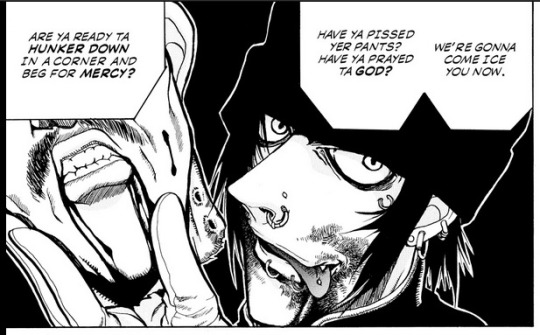
This is the “Dead Zone” arc, featuring Luke and Jan Valentine.
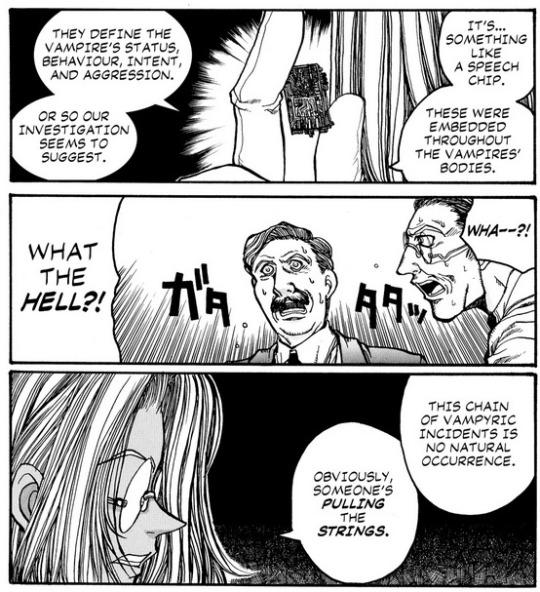
This arc is set around... uh, September 3rd-ish, I think. By now, Hellsing has had time to investigate this recent uptick in vampire incidents, and she calls a meeting of the “Convention of Twelve” to discuss her findings. This group represents the heads of various important agencies, political leaders, and noblemen, and the manga states that they “essentially” run the British Empire. I’m not sure how to read that, exactly. Kouta Hirano appears to be establishing one of two things:
1) Parliament Shmarliament, everything is really controlled by this secret group of oligarchs sitting at a table.
or
2) This is a collection of all the big wheels in British society, so they might as well be calling the shots even if they aren’t a true governing body.
I’m not terribly concerned about which one it is, since we left real-world Great Britain behind a long time ago. The Hellsing U.K. seems to put a lot more power in the monarchy, for example. Also there’s friggin’ draulas runnin’ around everwhere.
Anyway, Integra reveals that the vampires they’ve been killing lately all have microchips installed in their bodies. She says the chips “define the vampire’s status, behavior, intent, and aggression.” I don’t know if that means outright control or a more subtle manipulation. It might exaplain why the couple in Chapter 3 weren’t exactly being subtle.

Moreover, these vampires haven’t been following the conventional rules laid down back in Chapter 1. Vampire bites can turn a person into another vampire, but only if the victim is a virgin. Otherwise, they turn into ghouls. Destroying the head vampire will destroy all the ghouls he’s created. But that hasn’t been happening. The couple in Chapter 3 killed a lot of children, but they all became ghouls. And in Badrick, Anderson killed the vampire, but the ghouls remained active long enough for Alucard and Seras to fight them.
At least, that’s what Integra is saying. We never actually saw any ghouls in Chapter 3, and Anderson killed the vampire in Badrick off-panel, so we don’t know the exact timing. But I’ll take Integra’s word for it.
Something that got lost along the way was the matter of what happens to Seras if someone managed to kill Alucard. According to Chapter 1, she’d die immediately, but we never actually see that play out, and Seras is the only vampire created by another vampire in this story. We never see ghouls die en masse, either, because there’s never a situation where their master dies first, and the ghouls we see from here on out are these rule-breaking microchippy kind anyway.

Never mind that shit, here comes the Seras part. Walter has replaced her bed with a coffin. Apparently she had a bed in this dank-ass dungeon, and then one day Integra got a wild hair and decided “Oh, yeah, she should be sleeping in a vampire bed.” She’s been a vampire for like two months now. I feel bad for Walter, having to lug that big-ass bed down here, only to have to take the damn thing right back out. He must have known it was going to end this way. You’d think he would have said something before.
Seras hates this idea, but Walter relays a second order, one from Alucard: Seras has to sleep in the coffin. Well, that seems kind of redundant, but I guess Seras might have tried to sleep on the floor or something instead. The main thing I find interesting about this is that Seras is mostly irritated by Integra ordering the coffin, but she takes it much more seriously when Alucard is mentioned.
According to Walter, since Seras hasn’t drunk any blood, her powers will weaken... unless she sleeps in a coffin lined with soil from her birthplace. So maybe it’s an either/or deal. Integra was fine with Seras using a big girl bed because she assumed Seras would be drinking blood. But without it, she has to use a coffin, or she’ll be no good to the team. And after two months, it’s become clear that Seras has no intention of drinking blood, even bags of donated blood, like the one Alucard snacked on in Badrick.
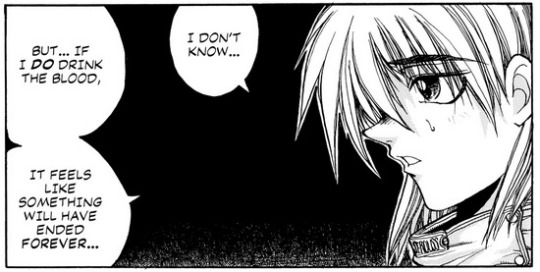
Even Seras doesn’t know exactly why she won’t do it, which Alucard finds baffling. If this was a dealbreaker for her, she should have just died as a human in Cheddar.

But Al isn’t entirely unsympathetic either. His words are harsh, but they’re the truth: Seras is a vampire now, and there’s no going back. She keeps trying to resist this, but it’s already happened. Denial will only make this more painful for her. I think that’s part of the reason he offered his own blood to her in Badrick. I mean, there weren’t a lot of other options, but from an ethical standpoint, drinking Alucard’s blood seems reasonable, since it won’t kill him. The unspoken sentiment here is: Listen, I know this is difficult for you, and I’ll try to make this as easy as possible, but you need to do this and there’s no way around it. But even that doesn’t seem to work, and Alucard’s in no particular hurry, so he’s willing to table the matter. Which I suppose is how the coffin thing came about in the first place.
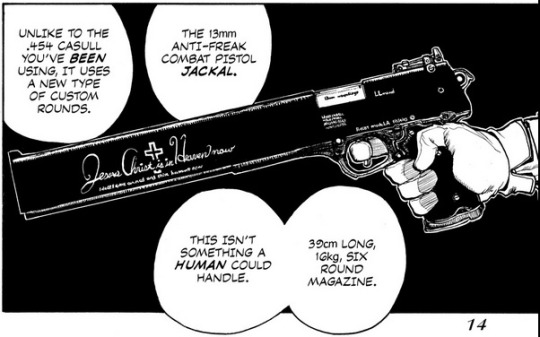
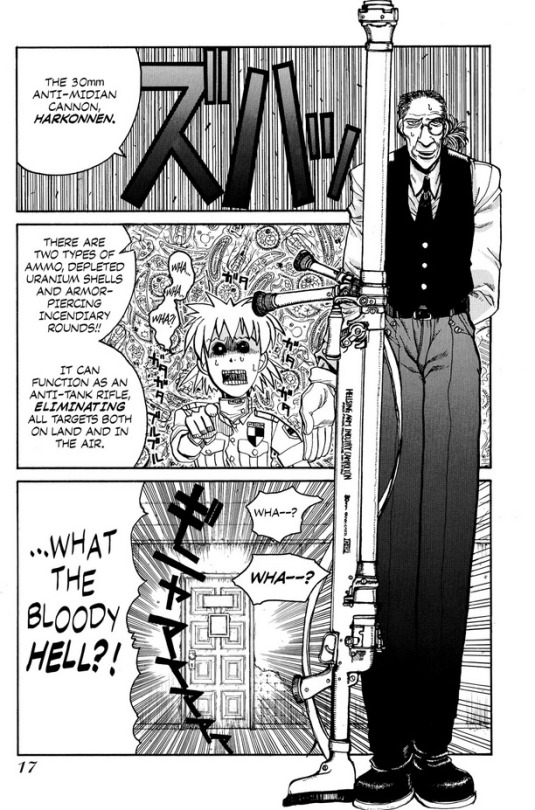
Walter also takes this moment to give the vampires their new guns. Alucard wanted something special for the next time he tangles with Alexander Anderson. Recall that Al already has a special cosmogun with an infinite supply of magic bullets, and he shot Anderson in the face and it didn’t stop him. So Walter builds him “The Jackal”, which is basically the same as his first gun, only even bigger and with a black finish. It also says “Jesus Christ is in Heaven Now”, which drives me nuts because I don’t know if that’s like a message to Anderson, or just some random thing. Kouta Hirano puts these nonsense religious slogans all over Hellsing, and I’m pretty sure he’s just doing it for effect, and not particularly concerned over whether there’s any religious significance to the words.
As for Seras, she gets a giant bazooka-looking think called the Harkonnen, named after a Dune character. One of these days I want to sit down and read Dune. I kind of feel guilty that I haven’t already, because then I could be writing this and get all excited for this moment. “HOLY SHIT!! IS THAT MOTHERFUCKING DUNE REFERENCE?!” Instead I’m like, ho-hum, yes it is.

Let’s move on. This arc is about the Valentine Brothers, two vampires who take the fight to Hellsing instead. They have a small army of ghouls, and their plan is to just drive up in a tour bus and storm the gate. Ghouls are mindless, zombie-like monsters, but apparently they can work a gun well enough, and Hellsing never imagined an enemy would try such a thing.
As soon as Integra finds out about this, she tries to evacuate the Twelve, but their helicopter gets destroyed, cutting off any chance of escape. Then Jan (pronounced “Yon” by the way), calls her on the comm system and threatens to kill them all.
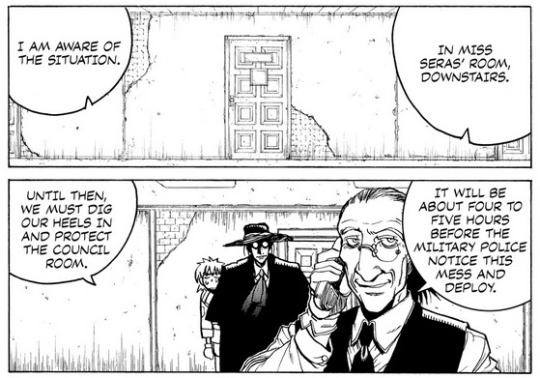
So Integra calls Walter, who already knows what’s happening. Um, how? I feel like the anime explained this better. Maybe Jan’s profanity-laden threats were on a public-address system instead of just for the conference room. But it sure looks like Walter’s just chilling out in a windowless, underground room. But he already knows there’s no hope of reinforcements arriving to save them. He proposes himself and Seras using the ventilation shafts to get to the coference room, where they can defend the twelve, while Alucard can go on the offensive.
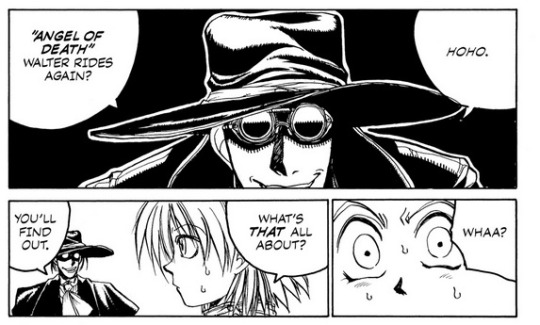
Alucard is amused to hear that Walter is going back into action, and calls him “Angel of Death”. We’ll come back to that.
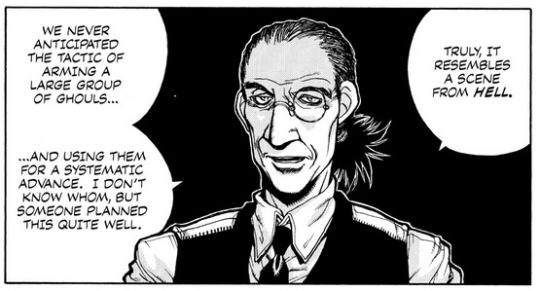
So Walter’s pretty much on top of things here. No one ever considered anything like this happening before. Hellsing is supposed to be a secret organization, so a vampire shouldn’t know to come here in the first place. Moreover, no one dreamed that a vampire would plan it out so well, using ghouls in a military fashion. But he’s optimistic about their chances for survival, because...
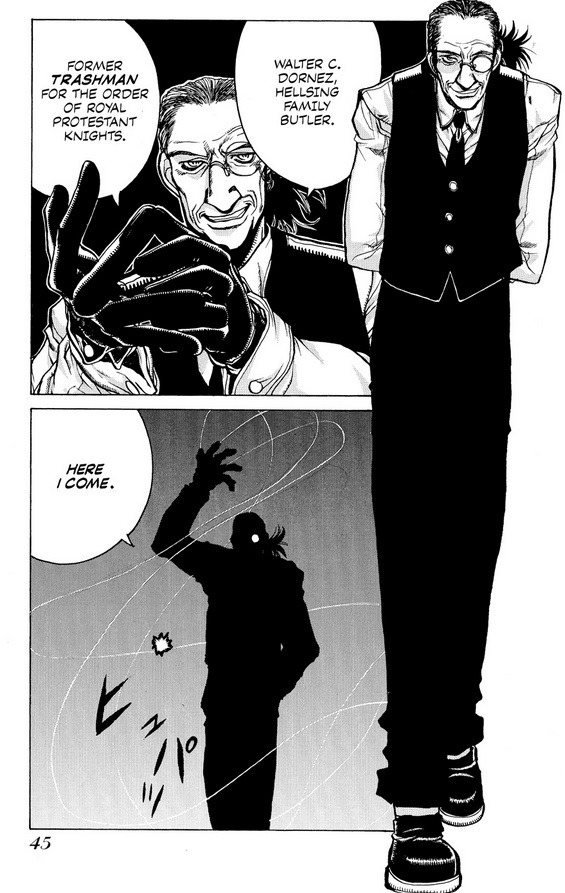
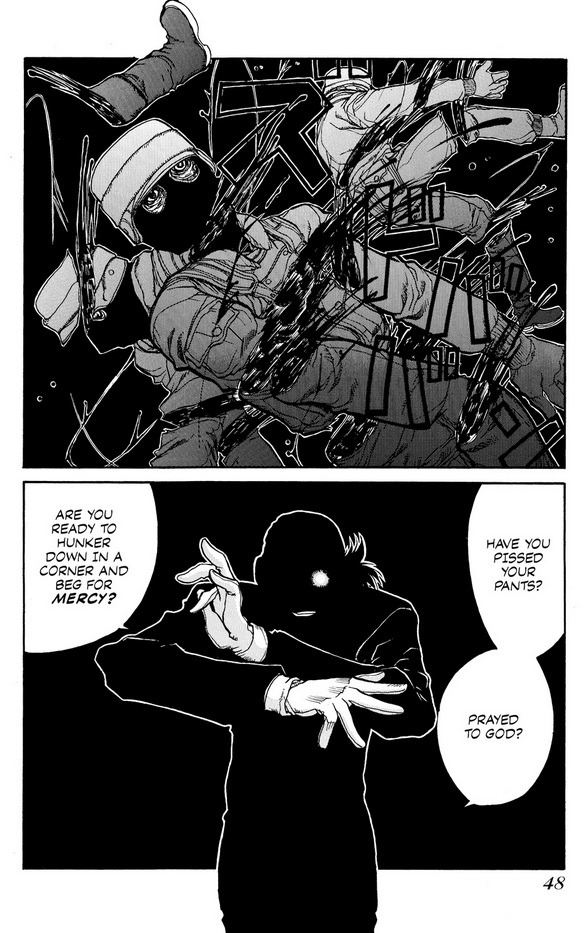
Walter has super powers. Specifically, he has these magic wires he can use to bind and slice up his enemies, and this makes short work of the Valentines’ ghouls. He then repeats Jan’s taunts back at him. Okay, so I guess Walter did hear Jan’s message from earlier.
The problem I always had with this development was that it seemed awfully convenient for Walter to have super powers. But then, it took me a while to catch on to Anderson having super powers, and he took a bullet to the face. I think the conceit of the Hellsing world is that these “anti-freak” organizations have to have super-powered operatives, so they use secret techniques and alchemy or whatever to empower men like Walter and Anderson. It’s really not that hard to swallow.
Except that the first vampire-hunter we meet in Hellsing is Alucard, who is himself a vampire. So it seemed like the whole point was that he was the best suited for the job because he had the raw power to do it. Integra doesn’t seem to have any powers, and neither do any of the rank-and-file Hellsing operatives who get mowed down by the Valentines’ ghouls. So it always confused me for Walter to just go “Wassup, I have powers too.” But it only makes sense for Hellsing to have more than one card to play. Clearly, Walter used to hunt vampires on the regular before he retired to become a butler.
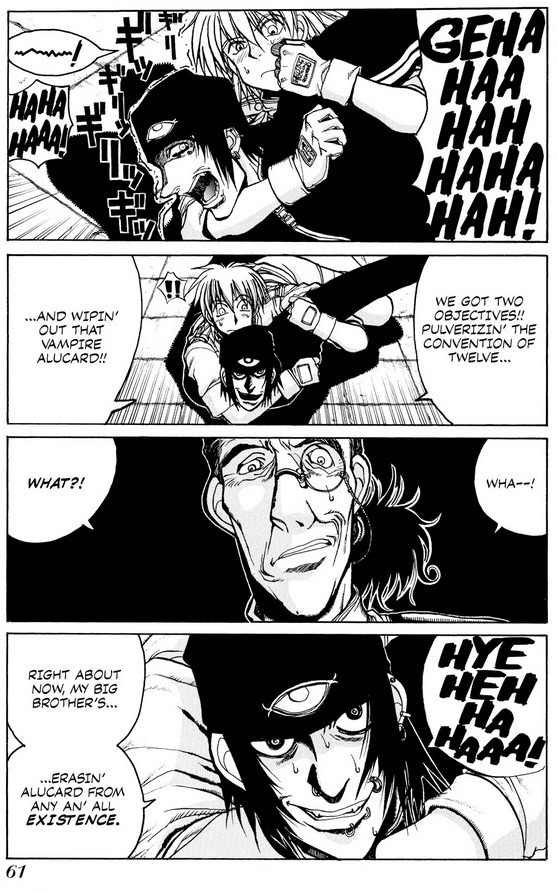
Between Walter’s wires and Seras’ giant gun, they manage to subdue Jan easily enough, but he reveals he has a partner, Luke, whose job is to tackle the second half of their mission: to destroy Alucard. Let’s check in on him...
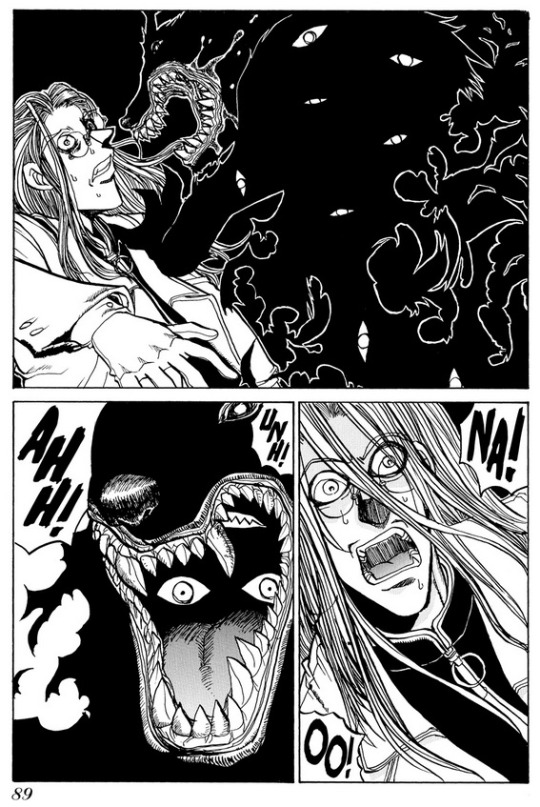
Yeah. I was thinking about doing a blow-by-blow of this fight, but it’s kind of pointless. Luke talks a big game, and seems confident that he’s on a higher level than the vampires Alucard has been fighting recently, and for a hot minute, even Alucard believes that he might be a worthy adversary, “above even a ‘Category A’ vampire,” so he releases his “control art restriction,” to “Level 1″.
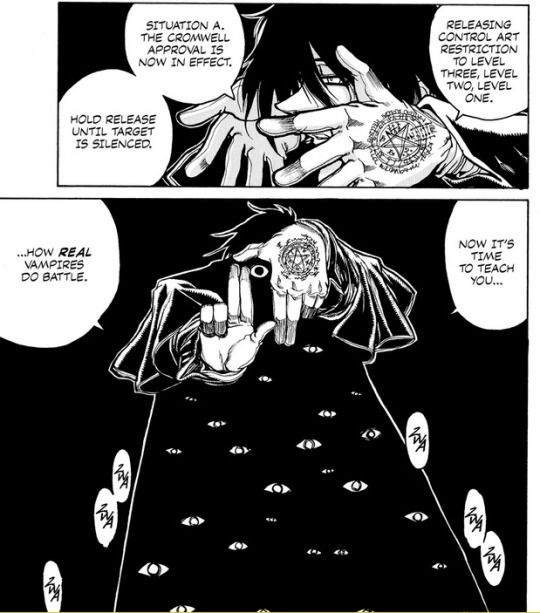
I guess I should back up and explain this. Alucard, like all overpowered anime characters, can hold back his full power and reveal it in stages. For some reason he has to announce that he’s doing this, like Windows 10 describing it’s own updating. Presumably, there’s a Level 4 where he usually operates, and that was enough for him to fight Luke evenly. But here, we see him jump all the way to Level 1, which allows him to turn into some shadowy form with lots of eyes and two dog heads.
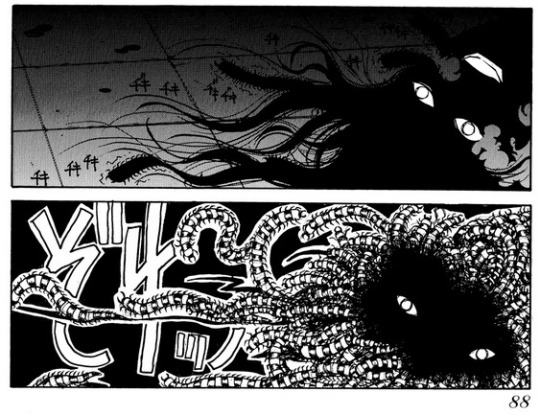
Also, centipedes. The point is, this is all stuff Luke can’t do. He’s more of a “super speed gun-shooting” kind of vampire, so he’s immediately outclassed. Alucard’s dog form eats Luke and that’s the end of him.... OR IS IT?
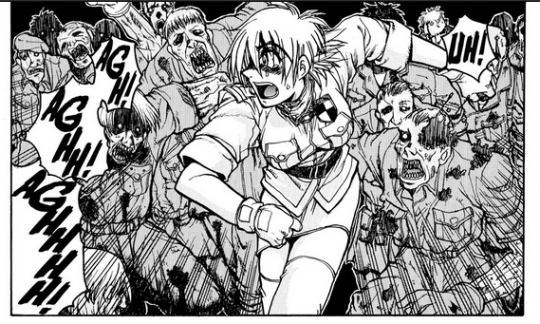
Meanwhile, Jan’s ghoul army is beaten, but he still has reinforcements in the form of all the Hellsing soldiers they killed earlier. These men rise up as new ghouls and chase down Seras while Jan makes a break for the conference room where the Twelve are holed up. Walter tries to catch Jan, but only manages to rip off one of his arms. He makes it to the door, only to find...
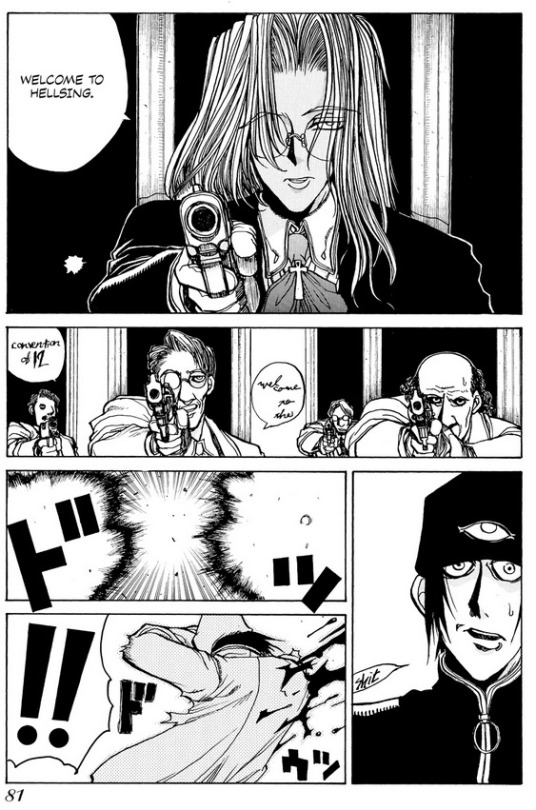
Integra and the others all have guns, and they shoot him down.
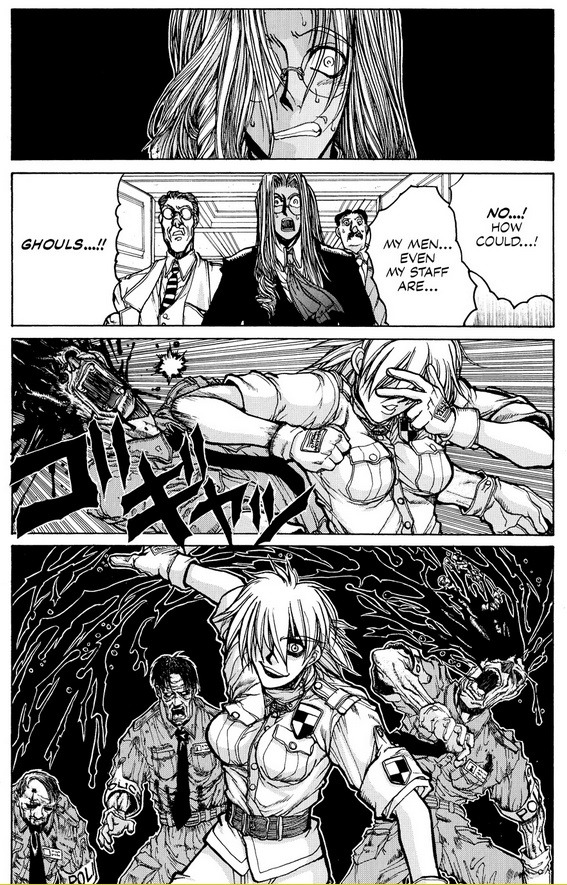
All Jan has left now is his second wave of ghouls, except Seras manages to overwhelm them. At first, she was panicking, but then she freaks out and goes feral on them, to the point where Integra has to jump in and order her to stop. When she does, she seems to have no idea what just happened. This is mostly overshadowed by the sheer horror of Hellsing’s soldiers being reduced to the undead.
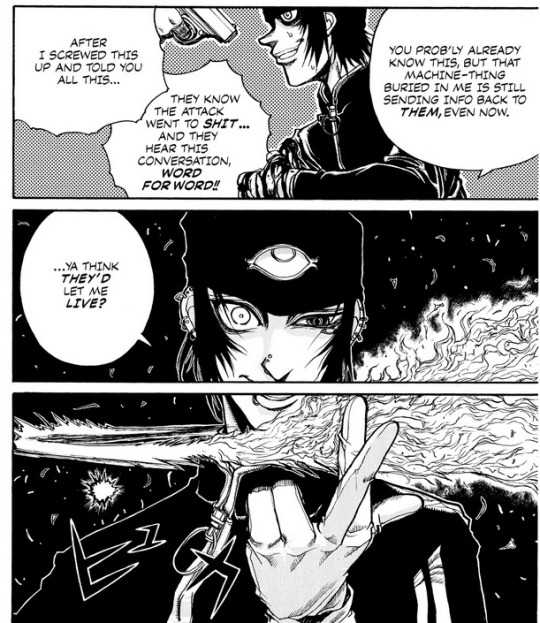
All that’s left is Jan, who refuses to talk. He has the same microchip implants as the previous vampires, and the people who sent him are monitoring him in real-time, which means they know he failed, and they can make him self-destruct before he can tell Hellsing anything. As he dies, Jan flips them all off and gives them one word of information: “Millennium.”
After that, Integra tasks Walter with destroying the remaining Hellsing ghouls, until Sir Irons, one of the Twelve reminds Integra that this is the duty of a commander. As Hellsing’s C.O., it’s her responsibility, so she agrees and starts shooting the ghouls in the head.
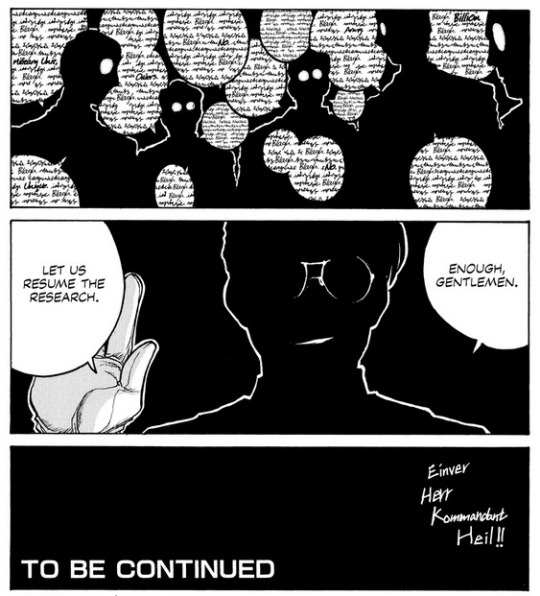
Meanwhile, Jan’s mysterious overseers talk amongst themselves, and their leader calls for them to resume their “research”. As devastating as this attack on Hellsing was, for Millennium, this was merely a test.
#2021hellsingliveblog#hellsing#alucard#seras victoria#walter c dornez#sir integra hellsing#luke valentine#jan valentine#i guess i should have said more about the valentine brothers as characters#they're all right but they don't stick around long enough to make much of an impression#i mean everyone loves jan because of his foul mouth but what else can i add to that?
25 notes
·
View notes
Text
“All Yet Seems Well” - Game of Thrones, Dexter, YGO, and the legitimately troubling trend and implication of “the problem play’s” re-emergence in pop culture
So first off, spoilers, naturally. Gonna be talking tragedy here. Also, cringe warning. I’m going to use mostly anime here. Kid cartoons, even. But there’s a point to all this. If you were fans of Dexter or the television series “Game of Thrones”, any show that had more than anything an “unsatisfying finale” you might be able to pick up what I’m putting down.

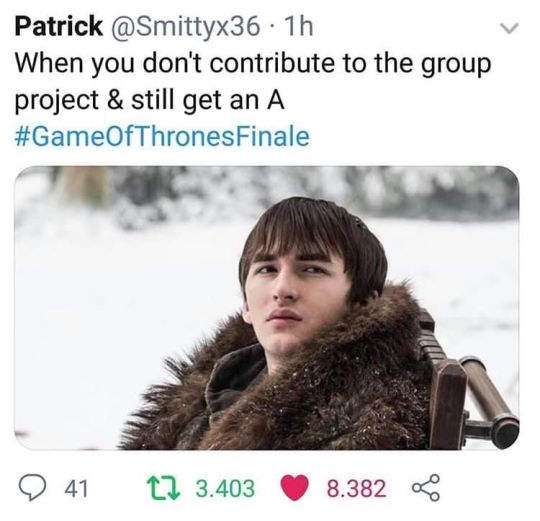
What is a tragedy? The definitions vary, but it is a troubling or melancholic story with an unhappy ending.
A Tragic Hero is easy enough to define. Hamlet from Hamlet, and Spike Spiegel from Cowboy Bebop. These two men are tragic because they pass away, and are unable to fully protect what they hold dear. But... I wouldn’t say they’re truly tragic. Don’t get me wrong, I wouldn’t want to be either of them, but Spike Spiegal and Hamlet do to an extent accomplish some of their goals, and go out in a blaze of glory, score a moral victory, something.
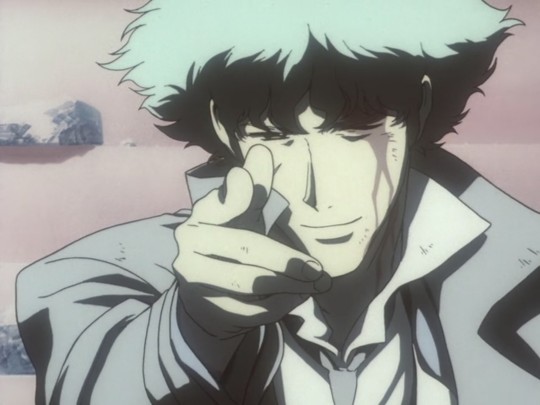
(Pictured Above: Spike saying “Bang” as he bleeds out after killing his nemesis and destroying half a criminal empire in a wild one man blaze of glory)
This post is not about those characters. This post is not even about tragedy, necessary. This post is about problems. Problem plots, problem characters, and problematic implications. The title of this post is “All Yet Seems Well”, because the shows and the characters I am about to discuss are highly reminiscient of Shakespeare’s “Problem Plays.”

To start, let me bring up the character of Shouzu Hiiragi from Yu-Gi-Oh Arc-V(a cartoon about children playing competitive card games Konami makes to sell trading cards). Arc-V is basically the “problem play” of YGO, if said play had a caged gorilla break out and steal the spotlight for the last third of the performance. “Problem Play” is a vernacular used to refer to three of Shakespeare’s plays that couldn’t quite be pegged into tragedy or comedy, that provoked discussion either about the plot’s structure, the means used to resolve the problem, or both. For those not even slightly into Shakespeare, I’ve always viewed the operetta The Yeomen of the Guard as Gilbert and Sullivan’s “Problem Play”, so to speak, though Yeomen might as well be a straight up tragedy relative to Gilbert and Sullivan’s other works.
But what makes a “Problem Play” a “problem play”, precisely? Well, since we’re talking about YGO Arc-V, lets go to Act V of one of Shakespeare’s “Problem Plays”, All’s Well That Ends Well. Act V, scene three, to be precise.
King: Let us from point to point this story know, To make the even truth in pleasure flow: If thou beest yet a fresh uncropped flower, Choose thou thy husband, and Ile pay thy dower. For I can guesse, that by thy honest ayde, Thou keptst a wife her selfe, thy selfe a Maide. Of that and all the progresse more and lesse, Resoluedly more leasure shall expresse: All yet seemes well, and if it end so meete, The bitter past, more welcome is the sweet.
So to understand the “problem” with the above(besides finding a more contemporary translation and supplementing that with sparknotes, tvtropes, and google), one must understand the gist of the plot of “All’s Well That Ends Well.”
Basically, the protagonist of the play, a common girl by the name of Helena, has just prevailed in her desire to marry the love of her life, the highborne Ward of France, Bertram. The audience and the reader should in theory rejoice in such a moment. Helena was given the ability to choose her husband as a reward for saving the ill King, and though she picked Bertram and stipulated that he did not have to marry her, and though Bertram did not directly reject her but instead provided her with two nigh impossible tasks that required guile, intelligence, and strength to prevail, something just seems off. (Perhaps this is why the King says “All Yet Seems Well)
What is it that is off? Is it that Helena was for whatever reason the only one in France capable of curing the King? Is it that for someone as skilled and cunning as Helena, telling Bertram he doesn’t have to marry her is pointless? Is it Bertram’s own psychological manipulation, to the point that even if these two people married and truly did love each other, that their happiness is a righteous person’s misery? That doubt, that uncertainty, the vague feeling that runs contrary to the overt, happy plot is what makes up a “Problem Play.”
Shozu Hiiragi is tragic not because of a vague sense of malice or villainy inherent in his character like Helena. No, in fact, he is an authentic version of the “Noble Commoner” facade that makes Helena so problematic. YGO Arc-V is about a kid named Yuya trying to make it as an entertainer after his father left him at a very young age, vanishing into thin air. Yuya was bullied severely, and his father was supportive and this larger than life figure. Naturally, his abrupt disappearance was a traumatic event for Yuya.
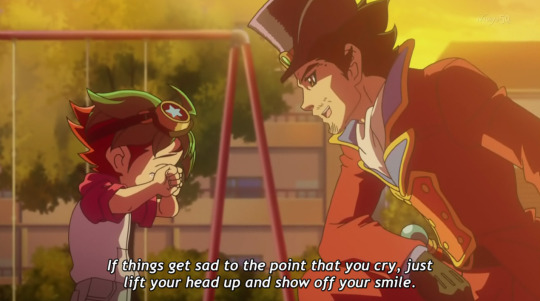
Yuya compensates for this disappearance and his past by playing Pagliacci, a sad clown. The Pagliacci thing aside, the show makes it quite clear in the first three episodes that Yuya holds on so tightly to his identity as an entertainer because of the absence created by his father’s disappearance

Now before I get to Shouzu Hiiragi, I have to talk about Yuzu. Yuya’s childhood friend and sweetheart is a girl named Yuzu Hiiragi.

Shouzou Hiiragi is a lifetime friend and operator of Yushou’s entertainer school. To summarize without being too spoilery, the audience eventually finds out that both Yuya and Yuzu are alot more important than they seem, and that they sort of just... appeared one day as babies. This is where Shouzu starts to become tragic, since we learn that not only did he raise a child that wasn’t his, he did so as a single father

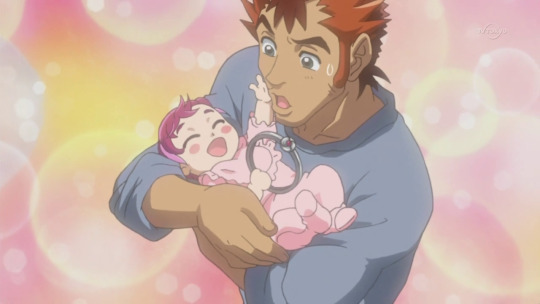
So Shouzu was second banana to Yushou, but he was an entertainer of some renown. He gave it up so he could raise his adopted child, and later on, act as the operator of “You-Show Duel School”, a school named after Yusho but ran by Shouzu since Yushou disappeared.


Now there’s a lot of issues with Arc-V. A lot, a lot, a lot, a lot. I am focusing on Shouzu but there’s so much to talk about with how this series has a lot of problems that its tone clashes far too hard with. But I’ll show a meme image out of context for the heck of it.

I focus on Shouzu because he is the legitimate avenue towards Yuya and the show’s main conflict of balancing entertainment with legitimate hurt, dangerous conflict, and immense suffering and pain. He is a man who does good and puts his ambition aside out of alturism to start, but more than that, he is a genuine father figure to Yuya despite all that is on his plate.
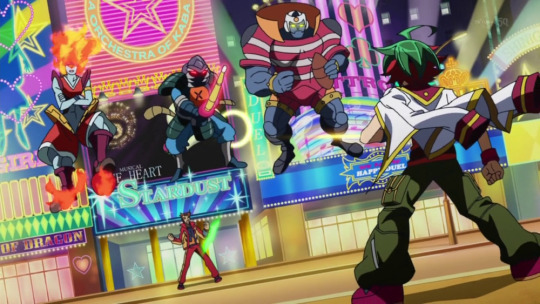
Like his costume of flame suggests, Shouzu is hot-blooded and passionate. As the plot progresses, Yuya struggles with doing what is right, being a good entertainer, preserving his father’s legacy, and a whole bunch of things. The advice of his father, Yusho, and the advice of his mother, Yoko, is to “smile when he feels like crying”
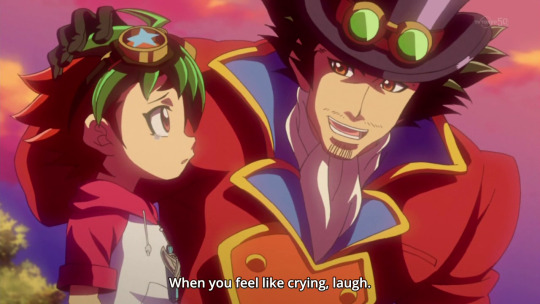

This advice isn’t bad, but it is a crutch and a mantra for Yuya, one the direction of the show itself portrays as unhealthy and stunted. (When Yuya cries, he tends to wear his goggles so as to not let it show). So let’s analyze a sequence near the beginning of Arc-V’s 140+ episode. Yuya had obtained a special power like any Campbell Hero, but his rival, Reiji Akaba managed to copy said power in a duel against him(Which Yuya won, anyways albeit due to Reiji having bigger things to deal with)
Being bullied and having a traumatic past, then obtaining a special power unique to him that allows him to win duels, and then LOSING that special power, gets to Yuya a lot, even if he is plenty competent as a duelist.
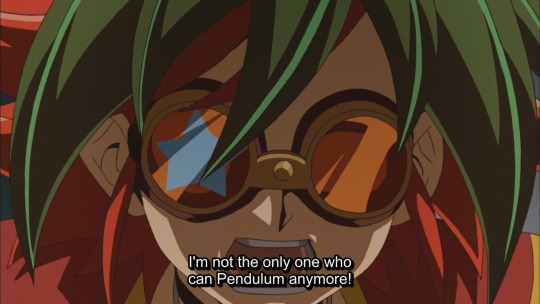

So he runs away in tears.
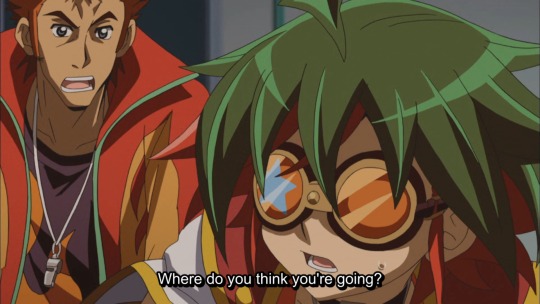




Shozou hits Yuya with some facts about how naturally, if a technique or special ability in a game was discovered that gave someone an edge, it would only be a matter of time before other competitors used it too. But Shouzou then challenges Yuya to a duel, and instead of telling him to smile instead of cry, instead re-frames Yuya’s situation of losing his unique ability in a postive and constructive manner

A lot goes on in Arc-V, but the pendulum that Yuya swings back and forth on is the legacy of his father and becoming his own person. Shozou, who is Yuya’s de facto father, provides a path towards the latter.
But... to make a long story short, Shozou is forgotten about. Yuya keeps chasing after his father, and the lesson he learned from Shozou is forgotten. Arc-V, which if you haven’t been able to tell from my essay on the main character’s girlfriend’s dad has an amazing ensemble cast, and spends 50 episodes developing these great ensemble characters.
But in the next 50 episodes, the ensemble characters fade into the background, and Yuya takes center stage only to repeatedly just smile and want to be like his father.
And in the last 50 episodes, the show gets downright mean spirited. A likable ninja character that has the design of a generic henchmen is killed off unceremoniously, an unlikable legacy character manages to shrug off that fate with ease.
All the while, the show keeps this upbeat tone of optimism and Yuya triumphing.
And Yuya does triumph, he does save the day, but it’s all wrong.
I am only skimming the surface here, but the reaction I saw and was invoked in me about Arc-V’s ending was the same reaction I saw with Game of Thrones’s ending.
Something along the lines of “I don’t mind a bad ending, so long as it is tonally consistent and not a confused mess!”
Were this sentiment unique to Arc-V that’d be it. But it is applies to the end of Game of Thrones, Dexter, Netflix’s Watchmen, damn near EVERYTHING that was popular this past decade. This trend of something having a strong beginning and then fading into tonal nonsense, to the point that the viewers either speculate on finding the “true” “hidden” meaning of a piece


, or worse yet, an active desire for a bad or evil ending, so long as that evil at least makes sense

So I have a bad feeling about all of this. Not just because a series I liked went down the toilet, but because, well, remove all these other mainstream series with promising beginnings that nosedove into the ground and crashed and burned, and what’s the most recent universally acclaimed show left?
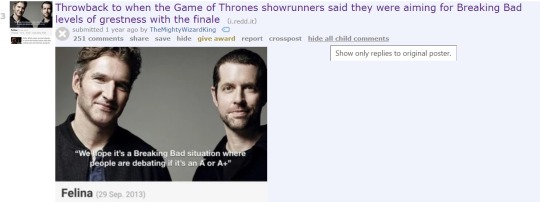
That’s it. Breaking Bad. A nihilistic story of personal triumph at the destruction of everything else. Which has its place. But with Arc-V, with Game of Thrones, with all these shows, I see a trend of the absurd entering and ruining a show, which leaves people craving order, even if that order is horrible.
I mentioned Gilbert and Sullivan before, so I’ll end this rambling essay with a quote from a song from the Mikado that was allegedly almost cut from it.
“ My object all sublime I shall achieve in time — To let the punishment fit the crime — The punishment fit the crime; And make each prisoner pent Unwillingly represent A source of innocent merriment! Of innocent merriment!”
The Mikado is a tale about the absurd and chaotic, the same absurdity that seems to be turning audiences to darker, more orderly, things. But the Mikado showcases both the trouble of the absurd, and the genuine opportunity and chance for grace the absurd provides.
In my opinion, Problem Play Plots are actually tragedies more tragic than regular tragedies. Borderline horror, even. They bring up problems, and the easiest solution to those problems seems to be that of tragic selfish scheming. But perhaps that needn’t actually be the case. That a benevolent and convincing solution to these problem plots exist - one people can accept, and be inspired by, in a good way.
And if that can’t be done, if the trauma and chaos of these shows serves no point, then the Gordian Knot of problem play plots must be cut. The damage they have done must be acknowledged, the mystery boxes resolved or done away with entirely.
6 notes
·
View notes
Text
Jagged Crowns(1/2)[β]
(A/N: I had a bit of an internal debate as to whether I should keep writing while...Well, some parts of our world are in a rapid spiral towards a fascist dystopian nightmare due to centuries of institutionalized racism, ignorance, and hair-trigger violence, among other things. I understand that I will never fully comprehend what POC have suffered, because the system has been rigged in my favour since before I was born. There is much and more that can and has been said on the subject, but to summarize: It is not my intention to further harmful ideas/depictions or to hurt people via this self-indulgent outlet. If I have done so(and not given appropriate warnings), please do not hesitate to inform me so that I may correct this. That said, warnings for: gore, violence, death, intrusive thoughts, mental breakdown/hallucinations, and suicidal ideation. The prompt for this was ‘Ahsoka helping Maul through his own struggles, since he’s pretty much on the verge of insanity at all times.’ Unbeta’d.)
In the end, there is no need for a chosen one. No bright, wide-eyed youth to take up a burning sword and the incalculable burden of ridding the galaxy of an oppressive evil. The reality turns out to be less of a legend and more of a horror story.
The Royal Palace is littered with the dead and dying, but there is only one that matters. Sidious is still immensely powerful, but his body has grown old and slow, and there are only so many guards he can sacrifice to protect himself. Overcoming his Force lightning, preventing bones and organs from being crushed, protecting their minds from invasion and violation: That is much harder. But finally, finally Maul strikes off the Emperor’s head as Ahsoka’s twin ‘sabres pierce his shriveled, black heart. She steps back. He keeps going, slicing and hacking until the throne is in pieces, the floor is a cross-hatch of burning lines, and what was once an Emperor is nothing more than a pile of charred meat and cloth.
“Is this...Am I free? No, this was too easy. Master always has a contingency plan.” He does not even realize he is voicing these thoughts, too occupied with searching the Force for something, any trace of Sidious’s presence. Foolish child. You thought you could defeat ME? I know your every pitiful thought, every scheme you concocted while you wriggled, a blind maggot encased in filth. “Be silent.” Maul snarls, fingertips coiled around his anterior horns, palms pressed into his eyelids. “Focus. Focus. Search for him, he cannot hide from us.” There is another voice, outside his head, but he cannot hear it. He has to know. Yet despite the venomous hiss that tries to steal away his concentration, there is...nothing. The Dark Side is empty of even the barest wisp of his Master. “Gone. Gone at last. Finally I have achieved Bane’s will...” He laughs, long and erratically pitched. Not a comforting sound, or even a sane one. Wait. There is something. He uncovers his eyes and re-opens them. Someone before him, unlit ‘sabres in hand. Another rival apprentice. Another test. “Have I not done enough to prove myself?” Maul whispers, disbelieving and enraged all at once. No. You must destroy all who would stand in your way if you wish to claim my power. Prove that you are worthy and strike them down! “Yes, my Master.” He had dropped his sabrestaff before -careless, stupid, he could have been killed-, but it leaps eagerly into his hand and activates as he begins his assault. He cannot seem to get a clear picture of his opponent, their form shadowed and not entirely solid around the edges. He sees their weapons clearly enough, though, especially when they clash with his own. His rival is on the defensive, parrying his strikes but not counterattacking. He cannot hear their words past the blood rushing in his ears, infuriated by this insult. Is he so weak that they do not even think him worth the effort of assaulting?! Maul drives them back, seeking to disarm, to maim, to kill, but he cannot connect. He resorts to yanking their legs out from under them with the Force, lips curled in a feral snarl as he raises his sabrestaff for the final blow...Then the Light bursts into his mind with the force of a battering ram, and he can feel-These thoughts, this presence, he knows it-Mine, this warmth is mine, cast from the star forever out of my reach. Ahsoka Tano looks up at him, eyes wide from exertion and fear. “Maul. Please, stop.” His legs give out from under him, weapon deactivated and slipping from his suddenly-nerveless fingers. He does not know how long it takes for her to come to him. Seconds, or perhaps years, her hands circling his face as their lips meet. He pulls her close, fervent and desperate in his passion. Yes. This is fitting. One last time, before the end. “You must kill me.” A whisper when they part for air, watching her blink in confusion. “What are you talking about?” “I have never fought for your hope of a restored Republic. You know this. You have prepared for it. Sidious is dead and I will inevitably take control of his Empire. Unless you stop me.” “I don’t have to murder you to accomplish that.” “Ah, so you are content to truss me up like a rabid animal and let your superiors toss me in a cage or cut off my head. How noble.” “No.” “Why? Because you believe that they will not take the opportunity to rid themselves of a long-standing nuisance? Or that they will simply leave me in peace because our goals aligned temporarily?” He summons her shoto to his right hand, snarling in frustration as he presses it to her left. “You are neither sentimental or naive, Ahsoka Tano. Do not hesitate.” For a moment, it seems as if she will go through with it. As if white light and the deep blue of her eyes will be the last things he sees. It is not the nature of the Sith, to surrender to death’s embrace so readily. But Maul has...never been a true Sith, and he is so very tired. The voices in his head are blessedly silent, yet it is only a temporary reprieve. Without purpose, without vengeance or ambition, he will lose himself again. “Stop running, Maul.” Her voice is firm, and oh, she burns bright enough to blind him, but he cannot tear his eyes away. Ahsoka takes her weapon from him, sets it down, and entwines their fingers instead. “You’re right. I know who you are and what you can do. I also know you’re capable of more than that.” He cannot breathe. What has she done, to make him feel this way? That there might be hope of being...something other than this? “Did you really think I didn’t notice all these years? The small acts of compassion and honour...Palpatine didn’t rip those away from you.” She is so warm, so willing to offer up these things he has blatantly denied himself and others. “A foolish dream.” Maul rebuts, but there is no real strength behind it. His left arm holds her more tightly, both for emotional and practical purposes. He is not certain how much longer he can remain even partially upright. “It doesn’t have to be. Join me.” Ahsoka offers. “There’s still Vader, Thrawn, and a whole mess of other Imperials to defeat or force surrender from. But after...We can try to build something of our own.” Her right thumb lightly brushes over his cheek. “Won’t be easy, but it’s a chance for both of us to try something different.” “You will regret this decision. Soon.” He points out dryly. There is only so much optimism he is willing to endure, even in this state. She only laughs. “And you haven’t driven me insane. Yet. I don’t expect either one of us to be perfect at this from the start. Just to try.” Her hand curves down and around, lightly dragging her nails up his nape and eliciting a low rumble from him. “Aren’t you going to give me your answer?” Her smile cements the fact that she is utterly devious beneath her relatively-harmless exterior and he will get her back for this later. “You. Are an unrepentant tease. And I will greatly enjoy administering your punishment.” He growls, both impressed and frustrated by her manipulation. “But I am willing to see whether this insane notion of yours will work.” His agreement brings a smile from her, but not before she rolls her eyes and gives a small, exasperated exhale. “‘Yes’ would have worked fine, you know.” “And since when have I ever passed up the opportunity to frustrate you, my Lady?” “Ass. Mmmmph...”
“Care to rephrase that?”
“No. You are the worst. But I might be persuaded to change my opinion.”
“Let us see if I am up to the challenge, then.”
This is merely the beginning of a very long, hard road. Yet neither one of them will walk it alone, and that makes all the difference.
(A/N:Things I didn’t include in the top note because it was getting a bit wordy: This is set around 5-ish BBY, so Thrawn isn’t a Grand Admiral yet, only an Admiral(or possibly Commander, depending on when his promotion happened). Obviously certain canon events didn’t happen (ie Malachor), and Maul and Ahsoka have been in a sort-of relationship for about a decade at this point. Also, sorry, they didn’t have sex in the throne room. Just makeouts and soul-searching. This is absolutely a starting point. Neither character is ‘cured’ of their various issues/traumas by the end of this installment even if they are being semi-cute and flirty. This is...not what I would consider a realistic way to handle someone being triggered/having a delusional episode, but I digress. *notices that fics that have started with gore or violent imagery have mostly ended in fluff* -_-....Hm...Well, that’s a pattern. Or possibly a problem. Cheers, everyone!)
#maulsoka#so much offscreen murder in this#except for Palpatine#because he is a BastardTM#I've decided to remove the 5-number limit and keep my askbox open for prompts/requests#for the moment#all of you are awesome btw
17 notes
·
View notes
Link
We are all too familiar with the SJWs’ “muh feelings” pose. We are also familiar with the Leftists’ manipulative stance, be it through their sanctimonious bullying, guilt-tripping, appeals to a pseudo-consensus, veiled threats, or constant emotional blackmailing. The maelstrom of emotions the Left plays with makes tempting to withdraw emotionally. We might be led to think that the higher good lies in “cold, hard facts” alone. But if we do so, we easily forget that cold facts do not prompt for any action, and if we merely describe while trying to get emotionally disconnected, we cut ourselves off the game.
Passions are part of the game

When the infamous Karl Marx wrote that modern capitalism “drowned the most heavenly ecstasies of religious fervour, of chivalrous enthusiasm, of philistine sentimentalism, in the icy water of egotistical calculation,” he had a point. The bourgeois world of classic modernity is emotionally lacking, and both the bohemian artistry and Communist radical politics stepped up to fulfill the void. This historical point is still relevant today. Conservatives fail to make stands because they are much more passionate about their personal interest than about defending anything they pretend to stand for. SJWs, on the other hand, went very far into shrieking and bullying because they are usually passionate for their points. Different motivations lead to different outcomes. And a strong motivation, not to say a deep or passionate commitment, greatly helps to build a strong character.
The far-left was able to pick up people’s passions because the bourgeois would not, and perhaps could not, do that. The bourgeois idea of progress was about people becoming farm animals, individuals reduced to the status of producers and consumers in a world where nothing really new or interesting could appear anymore. In such a world, there is no need for passions and no need for politics, isn’t it? Well, the individuals would not let themselves get boiled down to the status of mere economical agents, and many preferred embracing some ridiculous strand of new-age spirituality, worthless artistry or even becoming Communists than living through the bourgeois-conservative nothingness..
Rejecting the passions and emotions, or at the very least trying to put them aside as to ignore them, made men weak and unable to take a stance. It has also made women unhinged, shameless, and willing to do anything for short-term pleasure, as no men were able to give them a proper sense of boundaries. Plus, passions being powerful motivators, the far-left mastery when it comes to stirring some made it tremendously powerful as well.
We must face passions, not as an annoyance, but as a resource that has to be mastered. This is true for ourselves and others. First, when we are aware of our emotional states without being directly prompted (“triggered”) by them, we gain the ability to choose consciously what we do and want to do, and can follow our own intuitions instead of getting framed by an alien narrative. Second, when we are also aware of others’ emotional states, we can steer them in a specific direction.
The latter is especially true for women: today, they follow fashions and MSM approval, when not following their own sluttiness and attention-whoring… but if men were able to reward, shame, and inspire proper passions in them, they would follow us instead. If we want this to happen, we have to take over the empire of passions and stir up some emotions in the public’s hearts, be it through discourse, artwork, or daily conversations. Here are three emotions I think we should be keen to stir.
1. Empathy
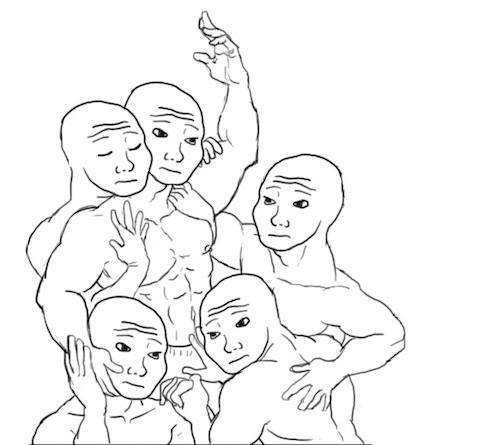
According to Dr. Neel Burton,
Empathy can be defined as a person’s ability to recognize and share the emotions of another person, fictional character, or sentient being. It involves, first, seeing someone else’s situation from his perspective, and, second, sharing his emotions, including, if any, his distress. (Burton, Heaven and Hell, chap.21, p.153)
As empathy fits well with maternal instinct and motivates nurturing tendencies, women are naturally prone to it. Up until a very recent time, they took care of babies and small children, participated to local charities, worked in shelters for the homeless or went through menial but important tasks as nurses. They did so because their natural empathy motivated them to act this way.
By contrast, a striking feature of feminism is that it destroys womanly empathy and nurturing tendencies. From a feminist point of view, men are enemies or at the very least potential oppressors and children are a burden. Feminism reverses the empathy, turns it into defiance or even hatred. Worse: after women have lost their ability to feel positively towards the men they should at least respect, cultural Marxism stirs their natural empathy towards “minority” identities. Thus we see grrls caring about thugs, invaders, or weirdos, who are all positively portrayed in the media, more than they care about what should be their community.
The lack of empathy is also a problem among white men. Though black men often exert violence against each other, the majority of them always bonds when it comes to attacking the depleted white majority. The same goes for any community out there: they empathize with each other more than they would ever empathize with us. We, white men, are the only ones who do the exact opposite by being hypercritical against each other when we should actually be supportive and look at the positive rather than the negative.
There should be a lot more empathy towards us than there currently is. Others should be more sensitive to our plight, suffer when we suffer, or at least feel compelled to suffer when we do. We are the proximate [prochain?], not the Big Other. We, too, should have more empathy among ourselves: nice guys, for example, should not be considered as “jerks” or “bastards,” as say some red-pilled guys who seem to have internalized a negative framing, but as misled victims who proved some nobility by trying to conciliate “respect” for women with the healthy desire to get a deeper relationship. Along the same lines, the working- or middle-class average Joe who got disenfranchised should be painted on a positive and humane light so that wealthy liberals cannot ignore or merely sneer at him.
2. Hope

Here is an emotion the Left has really abused from. Remember 2007-8, when the first “black” president was supposed to end the racial tensions in the US as well as the neocon foreign wars? Democrat activists at that time wrote without batting an eyelid about their hope for a world without losers, for an outcome where everyone would win. Then, the racial tensions have never been so high, the white majority is more dispossessed than ever, and the same liberals who were trumpeting about a world without losers have no shame calling us losers—from their choices and politics. Hope has been abused from, and we have to take it back. In fact, we have already started to.
Hope can be defined as the desire for something to happen combined with an anticipation of it happening. It is the anticipation of something desired… To hope for something is to desire that thing, and to believe, rightly or wrongly, that the probability of it happening, though less than 1, is greater than 0. (Neel Burton, Heaven and Hell, chap.14, p.103)
Trump is a wild card who comes with no guarantee, for sure. He still gives us something no Obama could ever give us—hope. The Alt-Right, manosphere, and the whole flourishing of high-quality dissenting intellectual efforts give us hope as well. Someone wrote that “the Alt-Right represents the first new philosophical competitor to liberalism, broadly defined, since the fall of Communism.” Someone else, here on ROK, noticed that more and more women were fed up with misandric grievance-mongering and longed to become mothers. These trends are more than interesting: they seem to point towards a better future that we still have to conquer.
On the other side, the liberal status quo and Hillary in particular mean pure hopelessness. If Hillary gets elected, we will have even less jobs, anti-white and anti-male organized groups will attack even more, the wealthy globalists will get fatter at our expense, and so on. Interestingly, liberals today use arguments of a conservative kind: when they shriek something as “the 5 last US presidents tell you not to vote for Trump” or “the Alt-Right and deplorables are un-American,” they look more like McCarthyists than hippies. They are the establishment clinging to the status quo and worsening. We are the embodiment of hope for a positive change.
3. Love

While hope should be spread among any decent people and is pretty straightforward once we agree on the intrinsic value of its object, love appears a bit trickier. In a relationship, whoever loves the other most is dominated whereas who loves less has more room to take action. If a man falls in love, he falls in the sense that he gets dumbed down, pedestalizes the girl, who in turn will get bored and look for a more challenging partner. Thus, seduction must be used to stir love in women: they must love us as well as their children. Both as a mistress and a mother, both as sexual and nurturing, a woman exerts love.
In men, love must be exerted in a more distilled and thoughtful form: when we protect our dear ones, toil for them, care about their interests, these efforts are an expression of love as well—although this form of love must be more distant as to allow ampler room for action. In any case, the feminine element must love the most and more directly.
It should be added that masculine and feminine can be conceived, not only as absolute, but also as relative terms. Esotericists consider that we are all “feminine” when considered under a higher point of view: the most fierce, courageous and risk-taking warrior remains “feminine” relatively to a genuine spiritual authority, and any human is “feminine” relatively to God as the ultimate Father. The Bible compares the good ones to a bride that shall get married to God (Revelation, 19). Hinduism recommends bhakti or devotion, i.e. religious love, to those belonging to the warrior caste, whereas the spiritual authority is more “masculine” as it enjoys a higher and more direct knowledge of God. These considerations might seem a bit far-fetched, but they were already highly relevant before the tiniest stint of modern degeneracy was born. Just remember that being in love is acceptable for a man as long as it never equates to pedestalizing a woman.
Conclusion
Passions and emotions matter. If we set them aside as irrelevant, someone else will push our emotional buttons—and the girls’—and spin us in no time. The philosopher René Descartes wrote that “all the good and the bad in this life depend from the passions” and that we had better be able to use them wisely. Ironically, the word “Cartesian” now denotes a logical, rationalistic, supernatural-denying mindset. This is accurate for the young Descartes, who was among the top scientists of his time, but tosses aside an important twist: the philosopher eventually lost his only daughter, Francine, and the sadness he felt while mourning her made him aware of the power of emotions. Yet, instead of being dominated by said emotions, Descartes strove to gain cogency about them, and he wrote a very interesting little treatise to expand a whole theory of the “passions of the soul.”
Our case is the same. Most if not all of us have been blue-pilled since infancy. Cultural Marxism was shoveled down our throat by school teachers, media figures, movies, social pressure. At each step of this process, our emotions were stirred and directed by spinsters so that, for example, we would feel a high empathy for so-called minorities while ignoring the homeless “white males” dying of cold at winter.
Ride the tiger of your own emotions and of (some) others’ as well if you don’t want sinister globalists to.
https://www.returnofkings.com/11010/how-to-control-your-emotional-state

We all have our ups and downs. Some days you feel on top of the world, you ooze a sexy masculine confidence that women love whereas other days you couldn’t be bothered to shave — you scowl at the thought of doing anything interesting and avoid all outside contact. Many guys accept this with a “que sera, sera” mentality. They feel it is just the natural ebb and flow of things, that taming your emotional state would be too chaotic of a task.
Those who do wish to change usually use hokey terminology talking about “energy” and the “universe.” They’ll seek guidance from another source so that they do not have to take responsibility for letting their emotions get out of check. People also seek a quick cure for a continual state of happiness, but what they do not realize is that happiness is transient.
I do believe there is a way to wrangle your emotions that relies on you, your habits and the power you have to respond to various stimuli. Essentially you must minimize the negativity and maximize the positivity in your life by altering certain habits.
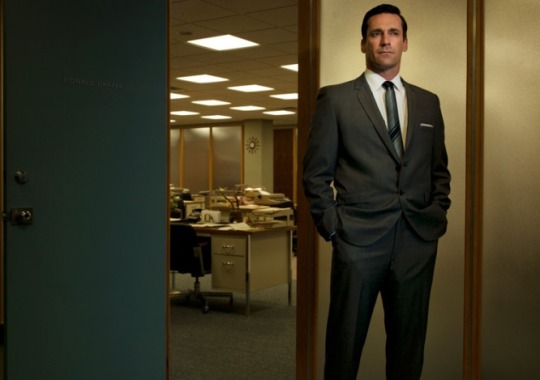
Minimize Habits That Lead To Negativity
Take a moment to think about any time you’ve lost control of your emotions. When did you last get angry, depressed, hateful, etc.? What do you do when you’re out talking to girls that hurts your success? Do you have unreasonable limiting beliefs? Do you believe you always need to be happy to be successful? Do you get frustrated when you have anxiety because of any of the above?
If you think about the above long enough and are mindful when such emotional states occur you will begin to notice a trend in what triggers them.
For me the biggest habits that lead to a negative state of mind, in which I lacked motivation, was depressed, and stayed inside all day, were my nutritional habits. I started to recognize a pattern: I’d go out drinking or eat highly processed foods, I’d wake up the next day tired and dehydrated, then I’d stay inside all day watching movies because I didn’t want to go to the gym or talk to people. The cycle would just endlessly repeat until the natural ebb and flow of things took me to a high point.
Maximize Habits That Lead To Positivity
Repeat the exercise above. When was the last time you felt on top of the world, when did you last feel invincible, when did you last have no anxieties? When were you on fire when talking to girls, what were you doing that made you so successful? What were the thoughts running through your head?
Again if you pay attention you will begin to see patterns. You’ll start to realize what habits lead to a great mood.
For me I felt the best when ‘rewarded’ with something. Whether it was having great sex, sharing something with a friend, new PRs in the gym, busting my ass in the library and getting a good grade, or learning a new skill.

The Keystone Habit
Roosh brought up keystone habits in a recent article titled “One Approach A Day.” Essentially it is an innocuous habit that has a much larger effect than planned.
For me I started a few keystone habits: I started the day off with a nice cold glass of lemon water and my vitamins. In doing this I started drinking more and more water leading me to be less dehydrated, more energetic and making better food choices.
I also made a rule that as soon as I start talking myself out of something reasonable I would force myself to do whatever it was I was trying to rationalize my way out of. Maybe I’d start thinking “I’m kind of sore and I still haven’t seen the new episode of Game of Thrones, I think I’ll go to the gym later.” I know I wouldn’t go to the gym later so I would immediately get up and put on my workout gear. Just by doing this I started getting in the mood for lifting — I’ve also heard of guys packing a gym bag every night and leaving it in their car.
The peaks and troughs of our emotional state should not define us. As a man, whether it be through eliminating negative triggers or forming positive habits, you should be fully in control of your emotions. Use the power of a keystone habit to enact much larger scale change so you can be in a perpetual state of positivity, or at the very least, neutrality.
Read Also: How To Change Your Bad Habits
1 note
·
View note
Text
Weekend Top Ten #458
Top Ten Family Films of Lockdown
So we stayed in the house and watched a lot of films this year.
It’s weird, because I always feel that I miss out on more films than I want, but this year obviously was crazy. The last film I saw at the cinema was Birds of Prey; I was hoping to see Tenet and Bill and Ted in the late summer, but I was working and never found time, and then everything started to go to shit again. But even at home, for some reason, I found it very hard to find the time to sit down and watch a movie on my own, despite there being more choice than ever before. Anyway, what I’m saying is it’s even harder than usual for me to try to do an accurate “best of the year” list.
But what we did do, as a family, is stay in the house and watch a lot of films together.
It’s now become a tradition, something we do every weekend; have a family movie night. And I couldn’t be more thrilled. I’ve always wanted to have something like this, and when the kids were tiny babies, I’d fantasise about how and when we’d get to enjoy a film together; about when I could introduce them to this movie or that, ones that were important to me. And sure, we’ve started to do that, but mostly we just think of things they’ll like, whether they’re new or old. And in that spirit, here are the ten best ones we’ve experienced.
I say “experienced” rather than just “the ten best films” because I’m ranking them here in terms of how the whole “family evening” went down; did I like the film, did the kids, was it new and exciting or a trip down memory lane… basically, how many boxes did it tick? Otherwise it’d just be full of my old favourites. Sometimes I was surprised by quite how much the kids took to a film I didn’t think they’d be as into; and sometimes I was disappointed that a film didn’t hold up. And it’s amusing when an older film really piques their interest. One thing I have discounted, though, is a film where we’d all been to see it at the cinema – Toy Story 4, for instance, which I enjoyed a lot more the second time around, but which felt like a cheat for this list as even the kids already knew it so well.
Anyway, this has been my main cinematic event of the year, and like the year’s supposed other big cinematic event, it sort of involves time travel in some way. Long may it continue. We’re focusing on Christmas movies from now on, but I do look forward to introducing the kids to E.T., Batman: Mask of the Phantasm, and Transformers: The Movie. Roll on 2021.

Bumblebee (2018): we’re a big Transformers family, I suppose, and this is a great film on all levels. It’s a nice, gentle story for the most part, a girl and her alien pal, full of humour and heart, but it’s also got, like, giant robots what punch each other. My kids loved it, and we loved it too, and it’s got that cool opening sequence on Cybertron that’s like my childhood come to life.
Spirited Away (2001): I was hoping we’d make our way through all the Ghibli films, except my kids ended up watching them on their own! Clearly I’ve taught them good taste. Anyway, this is obviously a masterpiece, full of deep sentiment and creepy visuals, with beautiful animation.
The Adventures of Tintin: The Secret of the Unicorn (2011): this was a pleasant surprise. My youngest has a Snowy plush so she was into it, and having seen it before I thought my kids would like it, but didn’t realise they’d love it, properly into the adventure, laughing at Serkis’ great take on Haddock, and very invested in earnest, smart, baby-faced Tintin. Plus Spielberg directs the heck out of it. Even better than I remembered.
Addams Family Values (1993): we watched both Addams Family films over Halloween, and they proved very popular. Satisfactorily creepy, consistently amusing, but what really won them over was Christina Ricci’s Wednesday. Values is the better film, wittier and offering more for the fantastic young cast to do; the climactic Thanksgiving performance is a joy to behold.
Detective Pikachu (2019): we’re also big Pokémon people, and despite the fact I’d taken both the mini trainers to the cinema to see this one, we all enjoyed it as a family. A suitably compelling mini-noir, with some terrific world building and great effects, it’s the humour and Ryan Reynolds’ performance as Pikachu that really lifts it. Pity the ending falls apart a bit.
The Parent Trap (1998): in my experience, kids love films about kids getting one over on adults, so there's good stuff here. It's really aged well, too; Lindsey Lohan is frankly terrific in the lead role(s). It's funny and sweet and enjoyable, although I always feel a bit sad to see Natasha Richardson being so great and adorable.
Hook (1991): Empire magazine once called Hook the lemon in Spielberg’s basket, but I’ve always thought that’s unfair; overlong, oversugared, and a little bit all over the place it may be, but it’s got a lot of imagination and it can be both spectacular and fun. Plus the scene of the children going missing is quite horrible. Anyway, I quite like it, but my kids loved it, to the point where I think they’ve watched it at least three times this year.
Honey, I Shrunk the Kids (1989): one of the first films we watched in lockdown and a great success! I was very pleased to discover it held up just as well as I thought. It’s a great old-fashioned adventure story, with the kids who don’t like each other kinda bonding as they make their way through the garden. The effects, once state-of-the-art, have dated, but it’s still as fun and funny as ever. It actually skews a tiny bit older than I’d remembered. Moranis, of course, is always a treat.
Mrs. Doubtfire (1993): I had worried this might be too old for my kids, but I was very pleasantly surprised; they sat through the more intense scenes of domestic discord and fortunately all the sex references went over their heads. Instead they got a sweet and frequently hilarious tale of a man cross-dressing to win his kids back. It has aged a tiny bit, sadly, in both its portrayal of gender and sexual norms, and in its almost movie-of-the-week depiction of divorce, but overall it remains as funny and sensitive as ever.
Lady and the Tramp (2019): this was another very pleasant surprise, one of Disney’s live-action “reimaginings” on Disney+, but one that was really genuinely very enjoyable. The dogs look great (as for the most part they’re real dogs), the performances are good, and the deviations from the original are mostly sensible and worthwhile. Also the diversity of its cast is to be applauded. Genuinely, it’s a lot better than the Lion King remake; in fact, it probably ranks quite high on the list of live-action do-overs when all’s said and done.
So there we are. Lockdown has had its ups and downs but at least we all sat round the tellybox and watched some good movies. what’s next? Well, a lot of Christmas films; I was disappointed in Noelle, to be honest, but looking forward to Jingle Jangle and Christmas Chronicles 2. And here’s to a new Heslop tradition of regular movie nights! Next year’s when I finally get them to watch a Marvel movie…
1 note
·
View note
Text
Dust, Volume 6, Number 11
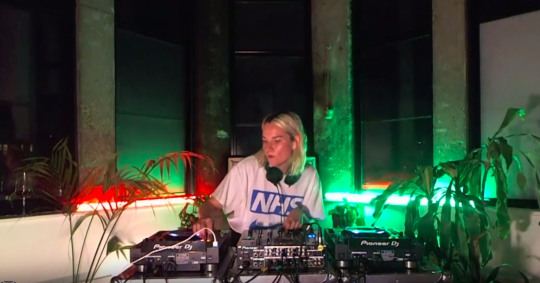
HAAi
As it was with September, so it is with October. After what felt like the dam breaking on all those albums optimistically held back by the pandemic, October continued to rain down releases and there was no shortage of them to cover. As ever, if diversity’s your thing, we have it: From pimp-rap to free jazz, death-metal to AM gold, jungle to Azerbaijani guitar jams, we got it all for you to peruse. Contributions this go ‘round come care of Ray Garraty, Ian Mathers, Bill Meyer, Jonathan Shaw, Andrew Forell, Tim Clarke, Justin Cober-Lake, Patrick Masterson and MIchael Rosenstein.
AllBlack — No Shame 3 (Play Runners Association/Empire)
youtube
Just when we thought that pimp-rap was going out of business, AllBlack blessed us with No Shame 3. It is a lot of what it claims: playfulness with no shame, ignorant beefs, endless balling during California nights and showing off in earnest. AllBlack alludes to the fact that even though he’s getting that rap check, he’s far from quitting the pimp game: “Made 40K in eight days, that was just off pimpin'.” But behind this happy façade is something darker that’s looming on: “As I got older, I ain't scared, I guess I'm cool with death / You speak the truth and they gon' knock you down like Malcolm X.” While admitting that rap is a cutthroat game, AllBlack is only one of the few artists of a younger generation who is ready to pay respects in his songs to the OGs — the godfathers of pimp-rap, to Willie D, Dru Down and Too $hort. The standout track here is “Pizza Rolls,” where DaBoii and Cash Kidd drop in to deliver the funniest lines.
Ray Garraty
Bardo Pond — Adrop/Circuit VIII (Three Lobed Recordings)
Adrop / Circuit VIII by Bardo Pond
There are plenty of reasons to do small, limited runs of certain releases, in music as in other artistic fields, ranging from the brutally practical/logistical to the aesthetic, but when the material released in that fashion is good enough, it can be a relief to see it given further life (and not just digitally). This year saw the mighty Three Lobed Recordings (who we featured in an anniversary Listed here) has seen fit to reissue on vinyl two Bardo Pond LP-length pieces that were originally issued in limited run series back in 2006 and 2008. They were in good (and varied) company then, but resonate together in a pretty special way, whether it’s the tripartite Adrop wandering from gnarled, crepuscular grind to violin-powered epiphany or back down to delicate nocturnal acoustics. The longer Circuit VIII doesn’t have as distinct phases but still builds to an all-time Bardo Pond-style crescendo, featuring Isabel Sollenberger’s only vocals of the duo. Even with a band and label this consistently on point, these particular recordings are worth the wider dissemination, whether considered as archival releases or just a hell of a double album.
Ian Mathers
John Butcher & Rhodri Davies — Japanese Duets (Weight of Wax)
Japanese Duets by John Butcher & Rhodri Davies
There’s a bittersweetness about Japanese Duets that’s as pungent as the puckered, perfectly placed reports that English saxophonist John Butcher sometimes punches out of his horns. This is the third in an ongoing series of download-only releases that Butcher, idled by COVID-19, has culled from his archive, The Memory of Live Music, and the unbearable lightness of its format, only accentuates the sense of lost opportunities and experiences. One of the things that a touring musician gains in exchange for their embrace of uncertainty is the chance to go to some unlikely place and undergo something extraordinary. The four-page PDF that comes with this download reproduces photos from Butcher and Welsh harpist Rhodri Davies’ 2004 tour of Japan, which took in swanky museums and shoebox-sized jazz cafes; each image looks like a moment worth living. But if all you can do is hear the evidence, that’s not exactly settling. This improvising duo was audibly on a roll, pushing reeds and strings to sound quite unlike their usual selves, and challenging each other to move beyond logic to the rightness of jointly made and imagined moments. Thanks, guys, for sharing the memories.
Bill Meyer
Ceremonial Bloodbath — The Tides of Blood (Sentient Ruin Laboratories)
The Tides of Blood by Ceremonial Bloodbath
Yikes — talk about truth in advertising. Canadian death-metal band Ceremonial Bloodbath delivers the goods promised by their moniker and this new LP’s title. It’s a repellent record created by dudes that play in a bunch of other death-metal bands based in British Columbia: Grave Infestation, Encoffinate (not Encoffination), Nightfucker and numerous others that tunnel even further under the broader public’s attention. Give these guys credit for their single-mindedness: None of those bands is likely to make you feel any happier about the human condition. Neither will listening to The Tides of Blood, but it’s a better record than any that those other acts have released. The songs are low-tech, dissonant and about as subtle as a bulldozer’s blade knocking through your front door. In other words, the record is largely in line with what we’ve come to expect from the death-metal recently dug up by Sentient Ruin Laboratories, and for a certain kind of listener, that’s a good thing. Check out “The Throat of Belial,” which comes on hard and fast, then downshifts into second gear and unleashes a tangled, coruscating sort-of-guitar-solo. The mechanical chug reasserts itself, then speeds up again, unleashing steam and the smell of something… organic. The song has a ruthless momentum, as does the rest of the record. Pretty good Halloween music if you want to scare all the trick-or-treaters off your lawn.
Jonathan Shaw
Cut Worms – Nobody Lives Here Anymore (Jagjaguwar)
youtube
Max Clarke evokes a wistful nostalgia for an America that existed perhaps only in the mind, the warm campfire glow of an era personified by The Everly Brothers’ harmonies, the twanging guitars of country rock and 1970s singer songwriters. On his new album as Cut Worms, Clarke literally doubles down on his musical project. Nobody Lives Here Anymore comes in at 17 songs that, while individually fine enough, meld into one another and gradually fade from the memory as the album unwinds. Clarke never quite transcends his influences and is not a strong enough lyricist to engage at this length. The effect is similar to that of The Traveling Wilburys where the whole is lesser than the sum of its parts. That said, Clarke is engaging company with a voice that splits the difference between the aforementioned siblings, Roy Orbison and Tom Petty. He has an ear for a melody and skillfully recreates an AM radio sound that trips the memory for anyone who grew up with this music either as inescapable background of their lives or soundtrack for their teen dreams and heartaches.
Andrew Forell
Dead End America — Crush the Machine (Southern Lord)
Crush the Machine by Dead End America
This new EP by Dead End America (DEA — see what they did there?) comprises four short, piledriving hardcore songs, all directly addressed to the current occupant of the Oval Office. “Bullet for 45 (Straight From a .45)” neatly captures the EP’s essential sentiments, and also suggests the general level of restraint exercised by the whole enterprise. Hint: Restraint and nuance are not Dead End America’s strong suits. That’s not surprising, given the folks involved. The band and record were conceived by Steve “Thee Hippy Slayer” Hanford, late of Poison Idea, and of this world. It’s pretty wonderful that this is some of the last music Hanford produced — pissed off and irreverent to the very end. Additional contributors include Nick “Rex Everything” Oliveri (the Dwarves), Mike IX Williams (Eyehategod), Blaine Cook (the Fartz) and Tony Avila (World of Lies). Sort of remarkable that a record including players from all those legendarily vile, venomous bands doesn’t just spontaneously self-combust; maybe it helps that they focus their collective rage on such a deserving target. RIP Steve Hanford. The wrong people are dying.
Jonathan Shaw
Chloe Alison Escott — Stars Under Contract (Chapter Music)
Stars Under Contract by Chloe Alison Escott
Chloe Alison Escott is the frontwoman of Tasmanian post-punk duo The Native Cats, and her pre-transition solo album, The Long O, released on Bedroom Suck back in 2014, received justified plaudits upon its release. (It remains a low-key favorite of mine.) New solo piano-and-vocals album Stars Under Contract was all recorded in one day by Evelyn Ida Morris (Pikelet), which lends these performances an on-the-fly liveliness. For the most part, it’s rollicking fun, with some wryly funny lyrics that betray Escott’s sideline in standup comedy. This performative confidence comes through in early highlight “There’s Money in the Basement,” which has the jaunty barroom bounce of “Benny and the Jets.” Later, Escott reaches for the heavens on single “Back Behind the Eyes Again,” with a truly heartbreaking piano progression. Though the 16 tracks are wisely interspersed with short instrumentals such as “What Are You Reaching For,” “Evening, Sunshine” and “Playfair,” 43 minutes is a lot of piano-and-vocals songs to get through in a single sitting. On closing track “Permanent Thief,” there’s a tantalizing flash of drum machine and bass, which could be a nod there’s another Native Cats album on the way soon.
Tim Clarke
Eiko Ishibashi — Mugen no Juunin - Immortal - Original Soundtrack (King)
youtube
If you sit up nights fretting about how Eiko Ishibashi and her partner, Jim O’Rourke, pay the bills, this music may be your melatonin for your worried mind. Immortal is the soundtrack for Blade of the Immortal, an anime adaption of a popular manga that’s been picked up by Amazon Prime. Ishibashi composed and played the music with contributions from Tetuzi Akiyama, joe Talia, Atsuko Hatano, and O’Rourke, who also mixed the music. Ishibashi’s music echoes the affect-stirring melodies of her song-oriented material and the careful sound placement of her recent electro-acoustic work for Black Truffle; when the swirl of keyboard tones looms over her piano on “Animal,” there’s no mistaking it for anyone else’s work. But this is still made for a mass market, with unabashed classical music lifts and big, booming electronic percussion that would make a multiplex’s walls throb if you gave it a chance. There’s no physical release or Bandcamp option, so if you want to check this out, Apple Music and iTunes are your options.
Bill Meyer
Ela Minus — Acts of Rebellion (Domino)
youtube
Colombian musician Gabriela Jimeno’s debut album as Ela Minus is a collection of original tracks that merge songcraft and club sounds into an assured mix of electronica on which she plays all the instruments and sings in both Spanish and English. After spending her teenage years drumming for hardcore band Ratón Pérez, Jimeno studied jazz drums as well as the design and construction of synthesizers, and she eschews the use of computers to create her music. She brings a DIY spirit to her work combined with meticulous production style that gives acts of rebellion the experimental edge of early 1980s independent synthpop. The highlight "Megapunk” is musically close in spirit to Cabaret Voltaire, its defiant lyrics — “There’s No Way Out But to Fight” — tying freedom of expression to wider human progress. A textured and nuanced album, Ela Minus joins an ever-growing group of South American producers to tune into.
Andrew Forell
Erik Friedlander — Sentinel (Skipstone)
Sentinel by Erik Friedlander
Cellist Erik Friedlander seems to pop up in the oddest places, playing now with the Mountain Goats, then with Dave Douglas, and finding a little time for film scoring on the side. It's reasonable that for new album Sentinel, he'd connect with a couple of other artists — guitarist Ava Mendoza and percussionist Diego Espinosa — equally comfortable with finding unexpected sounds in a variety of styles. The group, given their background, sounds their best when they're blending genres. “Flash” starts off as new jazz, turns into rock for a moment, then some strange cello lead pushes it into alien territory. At the edges of the trio's work, heavy rock often feels about to break out, but the group refrains from ever indulging that impulse. “Feeling You” even provides some light, pretty pop, allowing the band to show its full breadth.
Friedlander's compositions provide the basis for the album, but Sentinel never feels like just his album. The band, assembled for what sounds like a hurried set of takes, found their partnership quickly, turning the pieces into fluid performances. “Bristle Cone” lets all three members shine and functions like a microcosm of the disc as a whole: As soon as you think it's a guitar album, you start paying attention to the percussive elements; as soon as you remember it's experimental cello work, you're back to guitar rock. The trio's engagement with the music and with each other comes through, the playful innovation guiding each piece into a multifaceted whole.
Justin Cober-Lake
HAAi — Put Your Head Above the Parakeets EP (Mute)
Put Your Head Above The Parakeets by HAAi
Though it was Teneil Throssell’s mixes that initially made her name as HAAi (and remain strong even amid the pandemic, her latest for XLR8R another beauty), her own productions are a wonder unto themselves that demand repeat listens even as they come a trickling single or carefully cultivated EP at a time. The Karratha, Australia native, Coconut Beats hostess and Rinse and Worldwide FM veteran’s latest is the delightfully titled Keep Your Head Above the Parakeets EP, pure headphones music meant for sunrises, sunsets, walks in deep snow, rain-swept moors, you name it. Her talent is in balancing airy synth melodies with ever-shifting percussion influenced primarily by jungle, breaks and (ultimately) house; when people talk about psychedelic dance music, this is something like what I always hope to hear. Another unmissable missive.
Patrick Masterson
Hübsch, Martel, Zoubek — Ize (Insub)
Ize by HÜBSCH, MARTEL, ZOUBEK
Decades have passed since Derek Bailey wrote his book, Improvisation. At that time, it was already clear that the intentionally non-idiomatic music he pioneered and practiced was a subset of the more universal matter of improvising as a necessary aspect of playing music. It was also becoming clear that non-idiomatic improvisation’s aspirations and proscriptions amounted to a new but quite identifiable idiom, and this Swiss trio is okay with that. If you told Carl Ludwig Hübsch (tuba, objects),Pierre-Yves Martel (viola da gamba harmonica, pitch pipes) and Philip Zoubek (piano, synthesizer) that the music on Ize sounds a bit like the British ensemble AMM’s, they’d likely nod and thank you for noticing. They’re not trying to make a new kind of music, they’re trying to be good at a kind of music that they love, and on those terms, they succeed. Aside from the occasional Feldman-esque piano phrase, they mostly trade in layers of tone and texture, operating in complementary parallel to one another, taking the listener through states of meditative stillness and slow-motion vertigo.
Bill Meyer
J Majik — Your Sound - Photek & Digital V.I.P 12” (Infrared)
J Majik - Your Sound - Photek & Digital V.I.P by J Majik / Photek / Digital
Released on the same day as the “This Sound” single that allegedly was refashioned from “unfinished jungle project from the vaults,” “Your Sound” was further proof that UK drum n’ bass vet Jamie Spratling bka J Majik still has plenty of material from the golden era to get out into the world. The original is a certified mid-’90s Metalheadz classic, but Photek and Digital’s reworking on the a-side “originally only destined for the dubplate boxes of the ultra-elite” has been floating in the ether for years as an alternative; its light Amen sequences and booming bass will have you yearning for every closed club you can’t attend. J Majik’s remix of his own tune on the flip was originally the b-side to a 1997 Goldie VIP edit, so having a more readily available remaster here does it a world of good. One for the headz, obviously.
Patrick Masterson
KTL — VII (Editions Mego)
VII by KTL
Most of KTL’s recordings have been seeded by theater and film soundtrack commissions. But when Stephen O’Malley (Sunn 0))), Khanate) and Peter Rehberg (Pita, Fenn O’Berg) found themselves in Berlin this past March with more time on their hands than they expected, they booked themselves into Mouse On Mars’ MOM Paraverse Studio sans portfolio and set to work. The first track, “The Director,” seems to acknowledge the situation by introducing the Shephard-Risset glissando, a repeated scale that sounds like it is endlessly ascending or descending. The titular figure never arrives, but while you’re waiting, fat looped electronics impart the experience of going somewhere while leaving you exactly where you’re at. The director isn’t the only value missing from this equation; O’Malley’s default sonic signature, a massive metallic wall of sound, has been softened to a close-shaving buzz that rattles and circles around within Rehberg’s synthetic/sonic biodome. That’s right, while you’ve been baking bread and putting on that COVID-15, KTL has actually lost weight!
Bill Meyer
Lisa Cay Miller/Vicky Mettler/Raphaël Foisy-Couture — Grind Halts (Notice Recordings)
Grind Halts by Lisa Cay Miller/Vicky Mettler/Raphaël Foisy-Couture
Montreal-based guitarist Vicky Mettler, bassist Raphaël Foisy-Couture and Vancouver-based pianist Lisa Cay Miller are all new names to me. For their trio collaboration on Notice Recordings, the three work their way through a set of eight free improvisations that range from one and a half minutes to eight minutes long. The combination of piano, guitar and upright bass is striking from the start: Miller slips seamlessly between the keyboard and inside-string preparations, mostly eschewing readily identifiable sonorities of her instrument. Mettler’s resonant, brittle electric guitar is the perfect foil to Miller’s piano and one often has a hard time teasing apart where inside piano strings end and guitar strings begin. Add to that Foisy-Couture’s dark low-end bass, which he attacks with groaning scrapes, shuddering arco and assorted string treatments. The three engage in active improvisations, plying their respective instruments into a collective whole while steering clear of garrulous interaction. The fourth piece, “Lower” is as close to trio exchanges as things get, opening up the ensemble sound to allow shredded guitar textures, resounding piano chords and scabrous bass abrasions to accrue into pulsating timbral layers. A piece like “As It Spins” is more about process, adding in the rumble and clatter of assorted percussive detritus, used on their own and to activate the strings of the instruments, which jangle with resultant shimmering overtones. The pieces often segue one into the other, creating an enveloping sound-space throughout. Based on this one, I look forward to hearing more from each of the participants.
Michael Rosenstein
Mint Field — Sentimiento Mundial (Felte)
Sentimiento Mundial by Mint Field
Mexico City-based duo Estrella del Sol Sánchez (voice, guitar) and Sebastian Neyra (bass) enlist drummer Callum Brown to expand the range of their dreamily psychedelic shoegaze on Mint Field’s second album Sentimiento Mundial. Sánchez has the breathy cadence of Rachel Goswell and moves easily between an almost folky introspection in her guitar playing to squalling walls of sound underpinned by Brown’s often motorik drums on tracks like “Contingenicia” and “No te caigas.” The bulk of the album is more reflective, Sánchez’ Spanish vocals close to your ear as she concentrates on atmosphere and dynamics. The result is a dreamscape that lulls, then hits with febrile bursts of restless dread, an impressive collection that fans of 4AD in particular should recognize and embrace.
Andrew Forell
Takuji Naka/Tim Olive — Minouragatake (Notice Recordings)
Minouragatake by Takuji Naka/Tim Olive
Minouragatake (a mountain outside of Kyoto, Japan) is the fourth recording by Takuji Naka and Tim Olive, a duo that has played together for close to a decade now, melding together music of slowly evolving rich timbral abstraction. Each are consummate collaborators and for this session, they make their way across the seven untitled tracks with steadfast focus to the nuanced details of their respective sound sources. Naka utilizes “long loops of sagging/distressed cassette tape winding into and out of similarly distressed portable tape players, with real-time analog processing.” Olive uses his regular array of magnetic pickups and low-tech analog electronics, drawing out volatile hums and changeable striations that coalesce with his partner’s slowly devolving layers of sound. These pieces are imbued with unflappable deliberation, each sound integrated into the cohesive, gradually unfolding improvisations. Each of the pieces sound as if one is tuning in mid-stream and end with a sense that they could continue on indefinitely. Rather than adhering to any formal developmental arcs, the two patiently sit within unfurling sonic worlds as layers ebb and flow. Naka’s degraded tapes lend an aura of catching wafts from some distant celestial emission which Olive subtly shades and colors with hisses, whispered mutable fuzzed gradations and aural grit. Snatches of scumbled lyricism morph into static-laden swirls; washes of flaked and tattered textures disperse into shuddering thrums. Naka doesn’t record much so it’s good to hear another project from him. Olive has been on a particular roll as of late and this one is a laudable addition to his discography.
Michael Rosenstein
Okuden Quartet — Every Dog Has Its Day But It Doesn’t Matter Because Fat Cat Is Getting Fatter (ESP-Disk)
Every Dog Has Its Day But It Doesn't Matter Because Fat Cat Is Getting Fatter by Okuden Quartet: Mat Walerian/Matthew Shipp/William Parker/ Hamid Drake
Put aside the bleakness of this double album’s title because this music embodies the idea that things can get better. Not that there was anything wrong with Polish woodwinds player Mat Walerian’s previous recordings, which have all involved some combination of the musicians on this one. But Walerian has never sounded so strong on his various instruments (alto saxophone, bass and soprano clarinets, flute); so clear on how to get the most out of Matthew Shipp, William Parker and Hamid Drake; or so engaged with jazz, and not just the free jazz that he’s made with these gentlemen to date. By turns subdued, impassioned and bathed in all the shades of the blues, Walerian no longer sounds like a guy who has great taste in sidemen who happen to have played with some of the greats of our time, but a guy who sounds like he belongs in their company. Each lengthy track (they range from 11 to 18 minutes long) imparts a narrative feel without dispelling the mystery that makes you want to hear them again. Here’s hoping that when things start moving again, this band finds a way to move around the world and move us in person.
Bill Meyer
Om — It’s About Time (Intakt)
It’s About Time by OM - Urs Leimgruber, Christy Doran, Bobby Burri, Fredy Studer
To a fan, It’s About Time might sum up the feeling upon learning that the Swiss quartet Om finally recorded a new studio album 40 years after its predecessor, Cerberus (ECM). It also captures the existential question facing a quartet of improvisers, some of whose paths have often crossed during that time, but some of whom have taken very different roads. On the one hand, drummer Fredy Studer and guitarist Christy Doran play in a Jim Hendrix cover band with Jamaladeen Tacuma; on the other, soprano saxophonist Urs Leimgruber works mainly in freely improvised settings with the likes of Alvin Curran and Joelle Leandre these days. Burri seems to be the guy who has maintained connections with everybody. How to make sense of such a history without denying anyone’s musical identity? During their first go-around, between 1972 and 1982, Om was played polyrhythmic electric jazz. During the mostly low-profile gigs they’ve played since reconvening in 2008, they’ve had time to forge an updated vocabulary that is less groove-oriented but takes full advantage of the timbral resources on hand. While it’s evident that time has passed, it’s by no means a waste of time.
Bill Meyer
Rüstəm Quliyev — Azerbaijani Gitara (Bongo Joe)
youtube
Azerbaijani music, by and large, hasn't broken through to the American mainstream. That might not change, but the new anthology release of Rüstəm Quliyev's work, titled Azerbaijani Gitara, at least makes a case against our insularity. Quliyev's work, even for an insider, would be hard to pin down given that the overriding goal seems to be the synthesis of as many styles of music as possible. Western ears will be most comfortable with the psych-rock influences here. Quliyev also reworks Bollywood, folk, Middle Eastern dance and more on his electric guitar. Taken from recordings from 1999-2004, this nine-song collection sounds more coherent than that idea might suggest, but no less frantic. Quliyev plays with a persistent energy, his kinetic approach matched my his chops, often with a tone reminiscent of Carlos Santana (if we reach a little). On songs like “İran Təranələri,” he allows the piece to develop patiently, but these cuts rely on movement and virtuosity. Quliyev had a challenging life cut short by lung cancer, but his music finds itself unleashed through apparent joy.
Justin Cober-Lake
ShooterGang Kony — Still Kony 2 (Empire)
youtube
A fortnight shy of his 22nd birthday (this coming Wednesday, mark your calendars and send best wishes), Sacramento rapper ShooterGang Kony has dropped his second full-length project of the year in Still Kony 2, a skit-free set of songs with a Biggie homage as the cover that explores further his emotional depths while still retaining the bouncy Bay Area nature of his livelier side. There’s stuff like “Red Ice” and “Fasholy Good,” of course, but there’s also the stretch of sobering songs later in the tracklist, including “Overdose,” “Flaggin” and the particularly affecting “Do or Die.” No matter the type of beat, though, Kony feels completely at ease with his cadence and wholly in control of his verses despite occasionally verging on a Detroit-like dismissal of the beat. Even if you can’t see the geekin’, you can certainly feel it.
Patrick Masterson
Suuns — Fiction EP (Joyful Noise)
FICTION EP by SUUNS
For better or worse, Suuns’ new Fiction EP is pretty much the sound of 2020 encapsulated, not in the sense of distilling current musical trends, but rather in succinctly conveying the disorientating feeling of living through a year that has been such a traumatic mess. Across these six tracks, the Montreal-based band creates a fuzzy, feedback-streaked, claustrophobic racket that just about coalesces into song forms around breakneck rhythm tracks. “Fiction” and “Pray” will meet the expectations of anyone expecting Suuns to continue sounding like fellow noise-rockers Clinic, but elsewhere there’s surprising variation to the band’s sound palette. Opener “Look” emerges out of the darkness like a warped apparition, concluding with a chant of what sounds like “Sheep, sheep, sheep.” They enlist the help of Jerusalem In My Heart for droning instrumental “Breathe,” and Amber Webber lends ghostly vocals to “Death.” At the EP’s end, the Mothers of Invention’s wailing blues-rock classic “Trouble Every Day” is barely recognizable, foregrounding Zappa’s lyrics and chewing them up into a garbled rush of splenetic invective. Though short, there’s something satisfyingly ghastly and cathartic about this EP that really cuts through.
Tim Clarke
Women — Rarities 2007-2010 (Flemish Eye/Jagjaguwar)
Rarities 2007 - 2010 by Women
Some outlets rode much harder for Women than others when the band was still a dysfunctioning unit (RIP Cokemachineglow, namely), but there’s little doubt left a decade on that what the Calgary quartet had going was a volatile yet beautiful indie-rock ideal that hasn’t been duplicated in Viet Cong/Preoccupations or Cindy Lee since. These rarities, affixed to a deluxe decennial reissue of Public Strain due out in November, could all have made the final tracklistings of either of their full-lengths. The music veers between sunny ‘60s singalongs and dark guitar dissonance; I find myself thinking of The Walkmen’s first LP on “Bullfight” (a free release from 2011 in the aftermath of the band’s collapse the year before) and of The Chameleons on “Group Transport,” which is considerably more Janus-faced with its juxtaposed harmonies, for example. It took me much longer than it should have to come around on Women, but in case you’re still on the fence or also just never got around to them in the first place, perhaps this small coda will sway you in their favor once and for all.
Patrick Masterson
Yo La Tengo — Sleepless Night EP (Matador)
youtube
In July, Yo La Tengo released the abstract, droning instrumental EP We Have Amnesia Sometimes, harking back to the sound of their excellent soundtrack album The Sounds of the Sounds of Science (2002). This new Sleepless Night EP brings together five covers and one original, first released in conjunction with an L.A. exhibition by Japanese artist Yoshitomo Nara, who helped the band pick the songs. Sleepless Night opens with “Blues Stay Away” by The Delmore Brothers and “Wasn’t Born to Follow” by The Byrds, both fairly straight renditions of the blues and country-rock originals. The real keeper in this collection comes next in the form of Ronnie Lane’s “Roll On Babe,” beautifully sung by Georgia, which hypnotizes with its languid sway. Their cover of Dylan’s “It Takes a Lot to Laugh, It Takes a Train to Cry” also has Georgia take the lead over beatless organ, bass and guitar. “Bleeding” is the sole original, a shimmering atmospheric piece with ghostly vocals from Ira, which dissolves in a pool of pitchshifted reverb. Finally, “Smile a Little Smile for Me” strips out the rhythm section from the Flying Machine original and slows the tempo, Ira’s measured vocal performance lending the song an affectingly forlorn slant. Though the material here offers few surprises, it’s a reassuring release from a justifiably loved band at a time when we could all use a little more reassurance.
Tim Clarke
#dusted magazine#dust#allblack#yo la tengo#women#suuns#shootergang kony#rustam quliyev#om#okuden quartet#takuji naka#tim olive#mint field#lisa cay miller#vicky mettler#raphael foisy-couture#ktl#j majik#hubsch#martel#zoubek#haai#erik friedlander#ela minus#eiko ishibashi#chloe alison escott#dead end america#cut worms#ceremonial bloodbath#john butcher
1 note
·
View note
Text
More Lengthy Thoughts on 5.3
Spoilers under the cut. I can’t hold it in anymore and need to write it somewhere to let it out.
I’m sure like many others The Seat of Sacrifice really shook me internally. Some people started to feel for Elidibus. I did probably a little bit the moment when he forgot who he swore to to uphold his duty, but overall I still felt like he acted too much like a pompous dick so I didn’t feel that bad for him.
The only thing that pushed me a bit more positive is also the very reason why Emet-Selch is cemented as my favorite and that is that one moment in the trial when he shows up as his Amaurotine form to pull you from the rift before swaggering away. It’s not truly him because he’s definitely dead, but throughout 5.3′s story you see what he left behind for you. All of these things he must have planned and planted somehow. Maybe they were on a timer or something or he had some kind of a trick so that they only showed up for you and for you to find them and entrusted his Hythlodaeus with the Azem stone. He did all of this for you and to help his friend who lost his way and can no longer remember his purpose. The depth of his caring just broke me and saddened me even further.
And the big question for me and the main reason why I’m writing this post is because I am wondering when he planned this. When did he set all of this up? He obviously made the stones long in advance before and as someone who is pretty seriously depressed and burdened by the memory of his home he kept them secure and would be the best one to safeguard those stones and along those lines made the 14th one on his own as Hythlodaeus stated, but he planned them to show up for us. When did he decide that? He must have orchestrated for Hythlodaeus to find us around then too and to give us Azem’s.
And then at some point, he left that piece of himself to be ready to help us. That’s a huge how and when because we were in the Crystal Tower at the time.
Initially, I was thinking that perhaps he thought close to before we faced off against Vauthry he thought perhaps we may be worthy so he set all of it up just in case things would unfold where he would die. If he didn’t, then no worries nothing would activate and he could keep going. But if we were able to meet his challenge as the incarnation of his friend then he could finally rest in peace and rightfully we should be made whole if possible. That could definitely be set up around then at the last minute.
But what screws up that theory is the piece of himself showing up in the Crystal Tower.
He must have been planning it for a long time. Perhaps just observing in general what we’ve been doing with the death of Lahabrea and Elidibus asking him to return to his Solus body as a clone of his original. Tales from the Shadows indicates clearly he’s been looking for a way out and for another way for a long time. But with disappointment and things, he resigned himself to just sticking with the plan because nothing else seemed to be viable. Then we show up and miracles happen around us.
There’s some bit of time between his reappearance as Solus and when he shows up before us, so perhaps he’s observing from afar. He can see who we are and perhaps is a little sentimental about it, but also a spark of hope flutters in his heart that maybe, just maybe his old friend can do it and stop the cycle. So he watches and as he was asked to step onto the scene to try to keep up the effort, he does so obligingly as there’s technically no better option, but just in case he thinks about an alternate plan involving befriending us.
Obviously he’s probably talked with Elidibus before about the appearance of the Crystal Tower because he knows its origins and helped to set up the Allagan Empire as well back in the day, so he knows that it’s on Elidibus’ radar as a target for a possible place of showdown or something that they want to get their hands on. Taking that into account, that probably also influenced his decision to observe us up close and to cooperate and help us on our journey as a different approach to dealing with us. We probably swayed him a bit from our heroic acts on the Source that maybe we could do it, so he needed to start setting some stuff up just in case and part of that required access to the Crystal Tower. If he’s friends with Team Hero then he can have actual entry to it without issue and one of the moments he’s hiding from us or the Crystal Exarch before making his grand entrance to poke the bear a bit more in the Tower, he plants something that will trigger only in the right moment just in case in the future that he isn’t there. He had to have set this up during our travels with him. It’s possible he planted other small pieces of himself in other places just in case the showdown ended up happening there too, but still, he must have thought about it for awhile before to orchestrate it in that way.
His pain and the way he talked to us too. The stone perhaps is similar to the crystals that the Exarch’s soul and the souls of the Scions operates where the receiver has to be open to accepting it. So he talked a lot with us about our home, about who we were, and some hints here and there about our relationship back then. Small things here and there and knowledge into Hythlodaeus even that allows pieces of our story to come back to us so that we can accept our original seat. And even though he put us through a final trial against him, it was both a final test and also a way for him to show us and help us to remember our home and the legacy of our people and a way for him to basically be euthanized. He planned and set up everything including how he would walk away that one time just so that we could tell it was he who gave us these gifts.
Like the stones it wasn’t that surprising that he made those or kept them or that they’d be in Amaurot because he like made the replica city to basically revel in his depression and nostalgia. But the set up just for that final trial moment and to give us our stone, that had to have been his plan the whole time he was with us. If he was wrong then they’d win and they’d start the Calamity. If he was right though, it was big and important and the culmination of his love for his people and even that he felt for his friend would come to fruition. I’m just blown away about the amount of thought and planning that must have gone into that. Even caring not only for his people, but for us and even for Elidibus to understand his suffering and his obsession with duty. The hidden kindness he held to make this elaborate set of events so that we would be left with the best version of ourselves, but all of it in secret because we had to go into the Dying Gasp with us actually believing he was an annoying dick. This is a man who reveled in the enjoyment of the theatre and was an incredible patron of the arts when he was Solus and masqueraded several times as different people throughout the ages. He can act and act well he did to play the part of the villain while also leaving behind things to be of help.
But like Amaurot in itself he also like made recently like before you go in to the Tempest. He invites you there after you face off with Vauthry and are unable to contain the light and kidnaps the Crystal Exarch, but when exactly did he build it? It’s recent and the sahagin-like beasts there (I forgot their name) say that the water being moved and stuff has disrupted their society and blah blah blah. But how recently? It’s mentioned that the ruins look very similar to the city that appeared recently, but I’m having trouble remembering exactly when they say it showed up. But like he constructed it for us. He’s reveling in it, but he remade his home for us to see because of the above so that we would know. But more than just knowing, so that we could get our stone.
Also, on a sillier note, that shoebill. I’m on board with that shoebill being like his buddy or spy or something theory. I have a pet theory that since sometimes when he’s not like directly playing the part of a pompous Ascian bestowing small secrets upon helpless greedy mortals, he does just like he did in Raktika and like just hangs out in nature. In the forest the Amazon rabbit ladies said they found him sleeping under a tree. I totally believe that when he’s not in full Ascian get up, he probably just napped in different places or like sat randomly in spots that people wouldn’t really notice him but maybe an animal would. To that end, maybe one time he was like near a dock or something especially near Eulmore since he was instrumental in setting up Vauthry there. He was probably like chilling there or something and the shoebill happened to be near him and just randomly as people do sometimes when they’re with an animal, they talk to it. Like not even expecting it to respond or even to understand, but just like having a good dog companion that just sits with you, that shoebill sat there and listened to him ramble about this or that. Probably mostly mundane things. Maybe a little bit here and there about who he actually was or where he’s from, but mostly probably things that are not really that important. But after awhile he forms a bond with the shoebill and the shoebill comes back whenever he’s just sitting. Whether he actually trains it to spy on us or the shoebill just picked up on it like pets can sense a bit how their masters feel about someone, I don’t really know and we can’t be sure. But either way, that’s my head explanation as to why this animal keeps stalking us.
2 notes
·
View notes
Text

“And I bid you all a very fond F A R E W E L L” For @sweettifalockhart with all my love ♥
Warnings for: character death, cloti, a writer who is happy to rip your heart out.
Her eyes, the color of whiskey in a glass held up to the sunset; the color of romance he’d once mused to himself--though he’d not shared the sentiment out loud. He needed to fix that--complimenting her out loud, it was just that it was easier with his hands. They flowed in a way his mouth could not and kept up with his brain far easier--it just was simpler. He couldn’t exactly put much into words, but the shape of his hands--he hoped she knew. Tifa was far too patient; far too kind--but he was grateful all the same. ‘What would you do without me?’ she’d once said, and he couldn’t have denied the sentiment if he wanted to. But then that had been the start of all this hadn’t it? Cloud had known early on he was gay and she’d been fine with that--but it wasn’t like that with her.
She was special in a way no one else could be; no woman ever could be. He didn’t see them like that, no matter how much he’d tried--but the more she’d been by his side the more he realized it didn’t matter. It was a complicated matter for sure--he wasn’t straight and he still had yet to find any other female remotely attractive to him--but then he’d mostly given up on putting a label other than ‘love’ on their relationship. It just--was, and Cloud was ok with that. Their relationship had been slow as they took their time exploring the bond. He hated to admit that a lot of the reason for that was he’d still been hung up on Zack. It wasn’t his fault, nor his girlfriends, it was just that he’d never actually been given a chance to move on from his first love, let alone mourn his death. So they’d gone at his pace--slow and steady. He didn’t know if it was worth it, but the way Tifa would smile secretly from behind the counter and sending butterflies rushing through him spoke volumes. Even if it had been a struggle, they were happy and that was good enough.
Pushing up his goggles he paused, staring into the city popping up on the ruins of Midgar and couldn’t help his small smile. I’m happy now, Zack. It was habit...to sign to the air as if his dead friend was looking down and watching, even though he was certain he’d long since become just another fragment of the life stream. But then that was human nature wasn’t it? You liked to imagine that your deceased loved ones were still out there, watching over you--he knew the thought comforted him now that he’d healed some. It didn’t change the ache of missing their presence next to you--but it did ease it, if only a little. The point was he had a girlfriend, a son, a home, and there was peace. He revved the engine on fenrir and motored back into town, coming back after a particularly long delivery. The sense of peace he’d been feeling was quickly lost, replaced with this lingering sense of dread.
Having been a ‘savior’ more than he’d ever really wanted had honed his instincts to tell when something was off, but he couldn’t quite place it. The inability to figure out what was wrong left him even more on edge than if he knew. Deciding that dwelling on it til he was sick with worry wouldn’t help, he continued on his way to seventh heaven--keeping a wary eye out. If anything did go wrong, he’d deal with it then. Instead he tried to focus on the doors of the bar, then on Tifa. She’d heard him come in--but smiled and waved a happy hello to him. They were beyond words now (something he’d been so grateful for) and so he replied in kind, signing that it was good to be home before scooping her into a warm kiss. She always beamed at him afterwards and it sent his stomach tying itself into warm, happy knots. He loved seeing her happy; but most of all he loved being the reason for it. He knew he’d made her sad far too much--but at least he was making up for it now.
The dread didn’t leave his stomach all day, but he ignored it in favor of spending time with Tifa and Neku; it had been a while after all. They did, for all his nervousness, have a pleasant evening and he went to be practically glowing. It was because of this that he wanted to ignore the nag that pulled him out of sleep in the middle of the night, but it wouldn’t go away. Neku was sprawled out between himself and Tifa and he really didn’t want to leave, but he had people to protect and so he got up--stepping out into the night. It was chilly and quiet--but that was what had disturbed him. The quiet was almost deafening. At first he’d thought maybe he just needed his hearing aids--but even then it made no difference and it was like he hadn’t put them in at all. Gripping the hilt of the buster blade he stepped out onto the street, eyes narrowing at the shadows that were thick in the air. Why were there no lights on? Sure not a lot of people would be up at this time--but it’s not like no one was ever up at this time--and they’d put up street lamps.
There was a loud hissing noise and too late he realized there was a bomb. The explosion sent him flying, careening into the dirt and ground so the devices in his ears fell and shattered on the ground, leaving him even more disoriented. He was used to the ringing--having dealt with it often as the geostigma ate away at his body--but this time it was for a far different reason. The apartment he lived in was on fire, as well as two of the building around it. He realized that the explosives hadn’t quite done their job properly and had only blown up some of the supports on the complex. Sure it had blow a sizeable hole in one side, but the whole structure still stood--even if it was quickly blazing into the night sky. He was frozen for only a moment before he spotted his son stumbling from the wreckage. He was up like a shot, rushing to his side and checking him over. He looked panicked and scraped, clearly having clambered out of the burning rubble as quick as he could--but other than that he was mostly unhurt. It was his shaking hands, tugging at his shirt, that made him realize he was trying to sign something.
Tifa...stuck...still inside. It was all that would stick in his brain and he barely managed to tell Neku to find somewhere safe before he rushed right into the fire. Reckless, sure, but he’d fought and killed Sephiroth more times than he cared to count--he wasn’t letting a little fire stop him from protecting everything and everyone he loved. There was a barking sound and he realized in panic that the animals were also in there. It was probably a blessing, however, seeing as Sasha’s high pitched yip was the only thing that he could hear clearly of the dull roar thundering in his ears. It didn’t take long to find her, trapped in the flames and looking for a way out. It was then he realized she’d gone for Fenrir--saving the little kittens life and a beam had fallen in her path. Heaving heavily with the weight of the smoke taking over his lungs he leapt forward, using all his strength to fling himself to her side. The minute he was close, Sasha stopped barking and then slipped through a hole that hadn’t burned and ran off. He had no doubt she’d gone to look for Neku, smart dog that she was. Wrapping his arms around Tifa and the shaking kitten he looked for another way out; the hole was too small for them after all.
In the end he settled for hoisting her and the cat into his arms and leaping back through the flames. It was a lot of exertion and if he were normal the smoke he’d inhaled already would have made him pass out--but thankfully he was enhanced. His arm wrapped around her, holding her and Fenrir to his chest so their smoke intake was limited and moved as quickly as he could. The end was in sight, he could see his son and their dog standing at the edge--waiting nervously--they were almost there. But then, that was when things had always gone wrong hadn’t it? He was always almost there, happiness so close he could just about taste it. There was a crack and the building began to collapse, rushing toward them at a break neck speed and he reacted on instict. Tifa and the kitten went flying, rolling briefly in the dirt as half the building came crashing down on the blonde. She may have screamed for him but he couldn’t hear, couldn’t even feel his legs he realized.
It was then it occurred to him that this is what the bombs had been meant for. They’d heard rumors of ex-shinra trying to rebuild the empire, but he hadn’t put nearly as much stock in it as he should have. Clearly they’d been trying to kill him and now as he lay there, body broken under the weight of the wood--he realized that they’d succeeded. He might have laughed for the irony of it if he couldn’t see Tifa come into his vision. The fall had snuffed out most of the fire in this section and he took some comfort that he’d probably die from his broken spine before he burned alive. If this was an uprising--then his family needed to get out of there and find everyone else--save themselves. “Hey...” he croaked out, voice rough from smoke and the pain searing up from limbs he couldn’t really feel anymore. She tried, begged him to get up til she was red in the face with tears and her own throat raw. She tried to lift the beam but he’d said her name so low and rough that she was forced to give up. “My back is broken” he murmured into her hand, kissing a knuckle gently and lovingly as he used to.
Neku was suddenly at his side, clinging to Tifa as they both cried in their own way. It was sweet and he would have liked to go out like that, clutching Tifa’s hand and his other resting on his sons foot--but they needed to be safe. It took several tries but they finally left, vanishing into the night. He had no doubt they’d seek out barrett--hoping that he could pull Cloud out and save his life. The blonde knew they’d never make it back in time. He was proven right when a man with a gun came marching up, a cruel smile on his lips. He cocked the weapon, shifting so he could point it right at Clouds head and he couldn’t help but laugh. The only time they could bring him down was when he was already dying--it was a stupid house that had done him in. He’d fought monsters, nearly died once, only to be thrust back and save the world--which he’d done a lot--but a simple wooden beam had taken him down.
“Go on then.” he hissed as the man pressed the barrel of the gun to his head. “You can’t destroy what I built...” he hisses, not hearing how the other snorts. “And what I’ve built won’t let you rekindle what I destroyed.” Yeah, he knew that ShinRa would never rise again--even if he wasn’t there. A part of him felt regret as the gun rang out, finalizing his last moments -- but in the end he was at peace. Ironic, he thought, that he and his best friend had gone out the same way.
“Was I a hero?” “You were, to a great many people--but only I get to call you mine.” “And I always will be, Tifa.”
#( and this folks--is why you don't ship with me )#( I feel like his death got rushed a bit too much )#( but I've rewritten the ending three times )#( so I'm calling it good enough !! )#( The Moon And His Shooting Star ) ✧ CLOTI#( Some Greek Level Tragedy Bullshit ) ☆ DRABBLE#( She Who Showered The Earth With Stars ) ✧ SWEETTIFALOCKHEART
1 note
·
View note
Note
Has anyone done a comparison between what VF has said aboit the movies previously and what ended up happening in the movies for real? Could be interesting
Not that I’ve seen, Nonnie,
But I gave it a quick scan and it’s pretty spoiler light lol. Below the cut are some of the quotes I found interesting. As a direct comparison, the 2019 edition is longer and got some stunningly specific content concerning the relationship between Kylo and Rey, and more upfront “spoilers” than 2017 (we have more of an idea of where the movie’s starting at than in 2017 at the same point). There certainly weren’t any will they-won’t they/Star Crossed comments in the VF article from 2017. In fact, there’s not much mentioned about them together at all (which I’m sure is intentional because many people were surprised about them having a bond and not immediately killing each other). This year, they’re really deliberately setting the tone of what’s to come, which I appreciate.
We also heard a lot more about F/nn and P/e than in the 2019 article too; all in all, we got a fuck of a lot more in 2019, which is probably due to this being the last one? Pulling out all the stops? Making it super obvious?
They also talk a lot about Carrie and her passing, as well as spend a great deal of time talking to Mark, which is understandable.
Closer to the release of TLJ, there was this article from Anthony Breznican which delved more into the idea that maybe there’s more going on between these two than people realize (that maybe Rey was at risk for falling to the dark side, specifically).
In October 2017, there was this interview where Adam interviews Daisy that was both cute and kind of made it clear that they possibly spent more time filming together than some people realized, meaning that their characters would likely have much screentime together.
Additionally, there were some interesting updates to the SW Database that made us all freak the fuck out (specifically talking about a connection between Rey and Kylo) as well as a shitton of Reylo-centric covers.
I honestly think they’re intentionally being obvious here, because.... some people don’t seem to be getting the direction of this story, or don’t want to believe certain relationships/stories are going to be a huge focus of tRoS.
Anyways, quotes after the cut, but I linked the article up top if anyone is interested.
Cheers!
This quote really resonates:
Adam Driver, alluding both to Finn’s state and the scar seen on his own face in the trailer, told me, “I feel like almost everyone is in that rehabilitation state. You know, I don’t think that patricide is all that it’s cracked up to be. Maybe that’s where Kylo Ren is starting from. His external scar is probably as much an internal one.”
And this one concerning Rian Johnson and his headspace when writing the script:
But Johnson, in drawing up his screenplay, decided to raise the stakes further. “I started by writing the names of each of the characters,” he said, “and thinking, What’s the hardest thing they could be faced with?”
Rian on Luke training Rey:
The Last Jedi is to a large extent about the relationship between Luke and Rey, but Johnson cautions against any “one-to-one correlation” between, say, Yoda’s tutelage of young Luke in The Empire Strikes Back and old Luke’s tutelage of Rey. “There’s a training element to it,” he said, “but it’s not exactly what you would expect.”
Ha ha ha, a lot can change during the time between movies:
The final film of the trilogy, due in 2019 and for the moment assigned the simple working title Episode IX, will be directed by Colin Trevorrow, who did not yet have the big-budget feature Jurassic Worldunder his belt when he crossed Kennedy’s radar; he came to her attention via his first feature, the 2012 indie comedy Safety Not Guaranteed, and a recommendation from her friend Brad Bird, the Pixar auteur.
On the story group and their role during production:
The story group, which numbers 11 people, maintains the narrative continuity and integrity of all the Star Wars properties that exist across various platforms: animation, video games, novels, comic books, and, most important, movies. “The whole team reads each draft of the screenplay as it evolves,” Hart explained to me, “and we try, as much as we can, to smooth out anything that isn’t connecting.”
More on the story group and how Rian worked with them:
What the story group does not do, Hart said, is impose plot-point mandates on the filmmakers. Johnson told me he was surprised at how much leeway he was given to cook up the action of Episode VIII from scratch. “The pre-set was Episode VII, and that was kind of it,” he said. If anything, Johnson wanted more give-and-take with the Lucasfilm team, so he moved up to San Francisco for about six weeks during his writing process, taking an office two doors down from Hart’s and meeting with the full group twice a week.
I really miss Carrie:
Isaac, who filmed several scenes with Fisher, said that, like Hamill, she delivered a rich performance, giving her all as an actor, rather than treating Leia’s part as an exercise in feel-good sentimentalism. “We did this scene where Carrie has to slap me,” he said. “I think we did 27 takes in all, and Carrie leaned into it every time, man. She loved hitting me. Rian found such a wonderful way of working with her, and I think she really relished it.”
For his part, Johnson quickly formed a deep bond with Fisher as a fellow writer, spending long hours with her at the eccentric compound she shared with her mother, Debbie Reynolds, in the Coldwater Canyon section of Beverly Hills. “After I had a draft, I would sit down with her when I was working on re-writing,” he said. “Sitting with her on her bed, in her insane bedroom with all this crazy modern art around us, TCM on the TV, a constant stream of Coca-Cola, and Gary the dog slobbering at her feet.”
Fisher completed her part in Episode VIII late last summer, when principal photography on the film wrapped. “She was having a blast,” said Kennedy. “The minute she finished, she grabbed me and said, ‘I’d better be at the forefront of IX!’ Because Harrison was front and center on VII, and Mark is front and center on VIII. She thought IX would be her movie. And it would have been.” [Okay, crying a little bit--my comment]
#tros marketing#reylo#vanity fair#vf#asks and answers#anonymous asks#ask pacificwanderer#tlj marketing#comparison#long post#Anonymous
44 notes
·
View notes
Text
Seriously... I finished watching Black Sail and had several thoughts I want to keep in one post.
Spoilers ahead, of course.
Flint's ending: It's queerly romantic, in the most broad sense of the word. But it felt a bit odd to me. Not because I don't like it, I find it a good smart ending that doesn't imply “bury your gays”. But it felt unrealistic for the context of the series. Through the show, we saw Miranda telling Flint that she could not recognise herself in the way she had changed compared with the woman she was when Thomas was alive. Flint agreed in that respect, and made the same comparison with the man he was in that time. They wondered if Thomas could ever recognise them both now. The scene meant “we both changed too much”.
The message along the series is that loss and pain change you, transform you. Life is a painful continuously changing process. Even the characters that were “written in stone”, like Charles Vane, changed! So, with such reinforcement of the narrative related to “change”, Flint's ending feels troublesome.
How can Thomas, such a naïve and over-idealist man, embrace this Flint, so distant to the man he left in England? The level of tragedy and horror and blood that Flint's wake spread in those years in the real world can't be overlooked, not by Thomas who was a man who cared so much about the manners and the procedures.
Flint also killed Thomas' father. Imagine that scene where he knows this news... I don't know exactly if this news could be problematic for Thomas, since we did not see him too much to infer what kind of reaction he may have. He could be disappointed for his father, but that's different to wanting him dead, specially due to his lover's hand. How much of this event can hurt Thomas' love?
And Flint, in the end, abandoned Thomas' war. Flint himself, in the first time he is asked, said that Thomas would never put aside this war due to all what it means. In the second time he is asked, when he hesitated, it was more his own desire .
After all, Flint is so fucking tired of all this war and blood. I think that letting Silver get closer to him showed that; he was tired of fighting, he was tired of killing his closest partners just because the war demanded it. When he and Silver talked privately, and Flint disclosed his story to Silver, they joked about how they would end. Silver even joked that Flint should not worry to fear to be killed by him. And Flint's response was one of a such tired man. It transpired that he was in peace with the fact that, if Silver ever attempted against his life, he was going to let him do it. Flint is a man so alike to the one that belong to England and Thomas. How the hell this Thomas would see this man? I wonder.
So, for all that, even though I think this ending is nice and Flint truly wanted this [his idea of a Pirate Kingdom to have a place where all pirates can retire and live in peace was always in his plans even though he never allowed himself to be part of it, probably because Thomas was not in that Kingdom]. Flint has changed so much, that honestly, I think Thomas would be completely horrified of him. I don't know how much Thomas could look aside or forgive. This series is also about how forgiveness has limits too... so I wonder.
Sure, Thomas probably changed a lot, but his experience was far less violent and less mutable as Flint's. I don't know. I have mixed feeling with this ending. Maybe too cheesy and open for the deep darkness it hides.
Madi's ending: This was super sad to me. We saw in this series that all women had always been controlled and manipulated or coerced by men. Eleanor's story is exactly this, reflected in most women in the narrative. I thought Madi was going to be the exception... but it was not. Silver, the white man, decided for her what was best for her.
I know, war is not a solution in general... but he denied her anger. He decided for her. He did not allow her to make her own mistakes. And she ended up accepting it just fine. It felt odd. I suppose the best way to describe it is “it felt grey”, like most things in this series.
Sure, war was not the solution of anything... but this whole ending of never doing the revolution and taking comfort in half-measures that can be changed so easily without much consequences.... I mean, as long as Max lives in Nassau, there will be no slaves.... once she dies... what?. I suppose the series has the answer in several repeated scenes: “nothing lasts”. I suppose the freedom of the black people is something that “would not last” either. I felt a bit weird with that idea floating in the last episode.
Eleanor’s ending: Another woman in the series whose ending was so fucked up. I would not mind her story if she were the only woman whose narration is about how fucked up men control women's lives. But sadly, her story was just taking this narrative to the extreme... since her story is the reflection of the life of most women in this series. Anne is controlled by Jack and/or the guilt or gratefulness she has for him, Madi by Silver, Miranda by Flint... most women dancing to the whims of their men. Eleanor thought she was in control of everything, she was the independent strong woman... and yet, her control jumped from man to man, from his father, to Charles Vane, to Flint, to Scott, to the governor. She was never truly free of a man's control, and this is such a devastating truth for her. Her story is so sad... and a lot of her most disgusting betrayals were fuelled by those men. Super sad her ending.
John Silver ’s ending : He is my fave char. Probably his ending is the one I like the most. He was always smart enough to avoid death in the most disastrous situations. But in the process, he started to become darker. Over days, he became closer to Flint, to his thinking process, to his darkness. I understand he saw that he was getting close to become Flint at some point, and Madi put a stop to that. She changed things in his life. Flint also helped him to stop that process, opening himself to him. It's sad to me that Silver could find a way to take control over his own life by deciding over Madi. I know, breaking the cycles is a nice narrative... but I'm not so sure I like to see it when a white man decided such a thing, when you have a wise smart black woman there to do it.... But again, this series is all about grays. It was a nice but at least, realistic shade of gray.
Max's ending: Probably the best ending of all chars. She fought so much to be in control of her own life... and she finally could do it. With a level of intelligence that it was a pleasure to see. She was not even under the control of a man... she was men's toy. Her story is so fucking painful. And somehow, she survived thanks to her intelligence. In that regard, she is like Silver: both hard survivors thanks to their brains. At least she could overcome that fate of being in control of a man. She denied that chance of marry an idiot noble because she wanted to have control over her life and her decision of trying to retake Anne. Lesbian love in gray shades.
Anne's ending: I loved her char. But again, I felt so weird when her life is, once again, restrained to what she feels she owes to Jack. I thought I was going to find a scene of relief when she fought those men that saved her crew's lives. But no. It was just more of the same... the bodyguard of Jack. I don't resent it much though, because Jack truly loves her and cares for her in beautiful ways... but that scene of Anne resenting her own feeling of being in eternal debt with Jack stuck in my mind.
Billy's ending: this char was so surprising to me. He went from one extreme to the other... and he, more than any other char, showed that life, events, tragedy, pain, and loss, change people. And it changes them in ways from where there is not return.
Charles Vane ’s ending : He was a beast. There is almost nothing to say in his favour, he was evil-chaotic to the core. But his vulnerabilities were unbelievable when you contrast them with his personality. How such evil-chaotic man could do such gestures of (twisted) love? Sure, he did a lot for Eleanor in his wickedest ways, but the most surprising love I saw in him was for Jack and Anne. And honestly, being he the symbol of the beginning of the revolution is such a gray thing that this series used. It felt, like all things in this show, wrong and good at the same time. There was probably no other char in this story more “free” and “animal-savage-like” than him. He dismissed domesticity, he hated “peaceful” times. He was a char born in battle to die in battle. Revolution had to be born from this savage to be effective, so he being hanged was a reinforcement of that sentiment that had to be inspired in the revolution. But at the same time, he was absolutely random, selfish [in the beginning] and his behaviour was mostly the confirmation of all the demonization that the stories tell about pirates. He being the symbol that starts the revolution was also a way to tinge the revolution with cruelty and dirt.
I don't know, this series is fabulous. It's so gray that you can be thinking in each char, in each concept... and nothing is sacred, nothing is clean, nothing is pure. Nor good nor bad. Just a disgusting mixture of dirty and evilness and humanity. Masterpiece.
I loved this story, because its complexity makes the watchers think, and that's such a feat to do. But on the other hand, I felt the ending in general not very inspiring, tending to a moderate solution that, through history, we know it changes nothing. Moderate solutions [in times of slavery and empires] are absolutely prone to corruption and to return to the previous state of things.
The only thing I did not like was the unbalanced display of naked bodies or sex scenes when it came to women vs men. We saw all actress naked or having sex with other women and/or men in many, many, many times. In the whole series, only 2 men were displayed naked, and never was shown any gay sex scene. We only had 2 kisses between two men, very chaste, and almost hidden. I mean, I can't care less about nakedness in general or sex scenes, but I'm always annoyed when I see such a big unbalance when it comes to women vs men or straight sex vs gay sex vs lesbian sex. It made me feel that this serie was done thinking mainly in the male gaze. Hell, considering how most female chars are controlled by men [mostly in their endings, showing that their stories are not exactly stories of emancipation] made me confirm this.
But putting aside that, it was a hell of a story, and I loved it.
1 note
·
View note
Text
So I have some thoughts and feelings about Vishnal Rune Factory
I am aware that approximately two other people besides me care about this, but literally when has it ever stopped me from rambling at length
So basically, I love Vishnal from Rune Factory 4. Like, a lot. I never commit to anyone in farm sims but boy howdy, he managed to hit literally all the criteria I have to be considered a Favorite Character™. He did it so well, in fact, he’s earned a spot alongside characters like Cobalt or Lydia. But like those characters, while there are people who like him, I feel as though he doesn’t get enough credit. The complaints I’ve seen tend to be that he’s boring and that he has the worst proposal event. Hell, one of the first few results from googling him is a thread asking if he’s supposed to be a joke character. While I can see where this sentiment might come from, I’d like to explain the appeal in a lot of the things people find fault in him for (at least for me), and maybe offer a bit of a different perspective, I guess.
If I had to guess where a lot of these problems that people have with him come from, it’s probably the fact that he doesn’t have a lot of lore behind him. To be honest, Vishnal doesn’t really have a whole lot of plot significance. He doesn’t have any direct connection to the capitol of Norad like Arthur or Kiel (via his sister Forte), he’s got nothing to do with the Sechs empire like Doug, and he’s not a guardian like Dylas and Leon. Vishnal, despite working in a castle and serving Ventuswill (who we shall henceforth refer to as Venti), a literal dragon god, is an everyman by comparison. He’s just a guy trying to do his job the best he can.
Similarly, he also doesn’t have a whole lot of mystery or drama behind him either. With pretty much every other bachelor, there’s usually some kind of dark secret from their past that comes up and has to be dealt with, either through the main plot or through their proposal events. To just give you an idea of the kind of things we’re dealing with here, let’s do a rundown.
Doug’s entire tribe was killed by Sechs soldiers, but the empire fed him propaganda to make him believe that Venti was responsible so that he would work undercover for them in order to kill her and take the Rune Spheres.
Arthur was an illegitimate child of Norad’s king and believes that his mother hated him so much she had to take off her glasses so that she didn’t have to look at him, causing him to have severe trust issues (as well as a glasses fetish? Have fun with that, Freud).
Kiel (and by extension, his sister) is trapped in a well-meaning, but incredibly fucked up family dynamic that forced him to be incredibly sheltered while Forte took on the duties of a knight in a heavily male dominated society to protect him. However, since both of their parents are dead, they have no idea that they’re allowed to free themselves and become their own people.
Dylas sacrificed himself to become a guardian, fusing with a monster in order to act as a living life support to help keep Venti alive, but when he’s finally free, he’s hundreds of years into the future, where everything he knows is gone. It’s also implied that before he became a guardian, he was suicidal.
Leon, like Dylas, also sacrificed himself to become a guardian and was flung far into the future. However, he also has the added guilt of believing he left his childhood friend to live the rest of her life emotionally stunted because when he was younger, he made a promise to marry her if she stopped crying so much, but didn’t take it seriously as she did, and couldn’t have kept it even if he did.
Meanwhile, Vishnal has had an utterly average life. In order to help people, he wanted to become a doctor like his father, but felt he wasn’t smart enough, so when he met a butler named Sebastian, he was so impressed he decided to become a butler himself. Though he was worried his father wouldn’t approve of this way of helping people, he was ultimately supportive, helping him train and, through a friend’s connections, getting him to Selphia to work under Volkanon.
Vishnal is basically Clark from Connecticut in terms of how average he is by comparison. However, I wouldn’t say this is a bad thing. Even dealing with one of these traumatic backstories is a lot, let alone trying to harem them all (and don’t even get me started on the main plot’s drama). A lot of the resolutions to these character arcs are followed up by a proposal, and maybe it’s just my age and personal experiences (or the fact that I’m aroace), but when that happens, I don’t get the feeling of “YES, TAKE ME NOW!” I just think “…You literally just found out the thing that’s been screwing you up your entire life was a giant misunderstanding. I get that you’re happy but like, maybe take some time to sort yourself out? See a therapist maybe???”
But Vishnal, for all of his faults (of which there are many and I will get to that later), generally has his shit together. I respect that and find it a breath of fresh air compared to the cavalcade of angst in everyone else’s lives. Not to say that he doesn’t have any problems at all, because then that would be boring, but they tend to be more focused in the present, and are a bit more grounded in reality and less… spectacular. But like I said, we’ll get to that.
What he lacks in terms of dramatic backstory, he makes up for in personality. He’s very… intense, to put it mildly. While not completely hyper, he’s very high energy and it doesn’t take much to get him psyched up. He’s the type of person to put at least 110% effort in everything he does, and nearly everything he does goes towards his goal of becoming the world’s best butler. Unfortunately, as a result, he’s considered one-note. Now, I’m not going to sit here and say he doesn’t talk about butler things all the time, because he absolutely does, but for me, as someone who also tends to get super into things and talk about them endlessly (hence this entire ramble), I find him pretty endearing, if not a tad relatable in that regard. However, for all his single-mindedness, he is still a decently multifaceted character.
Probably the most important thing to note here is that he is a very good person, like “too good for this sinful earth” kind of good. He has a natural drive to help others and doesn’t have a mean word to say about anyone (though even he engages in the ultimate Selphian pastime of Teasing Doug™ on occasion). He’s also honest to a fault. It’s incredibly easy to tell if he’s trying to cover something up because he’s usually pretty much an open book and wears his heart on his sleeve. He seems to expect others to be the same way, as he has a bad habit of taking what people say at face value even if they’ve repeatedly shown not to be trustworthy. This often leads him to be the butt of many a joke or the victim of scams. Other times, lighthearted teasing falls flat as he takes it seriously and winds up getting his feelings hurt. But ever the optimist, he doesn’t let setbacks get him down for long.
He very much believes in the power of hard work overcoming any obstacle, and it seems in his mind, literally anything is possible if you train hard enough, and he’s constantly trying to prepare himself to master every possible scenario, from protecting important secrets by staying silent to becoming invincible to the common cold by constantly being soaked with water. It generally winds up doing him more harm than good, and even Doug worries about him a little bit because Vishnal will do pretty much anything if you tell him it’s special training (though this does not even remotely stop Doug from having a field day with it). Were this not a very “anime” kind of game, it would honestly be amazing if he hadn’t died from any of his training attempts.
Though it may come across as though he has no idea what is actually possible for a human to achieve, he actually seems to have quite a few hangups about his own limitations. He has a massive perfectionist complex and is incredibly hard on himself. He tends to beat himself up quite a bit when he makes mistakes (I mean the man looks utterly devastated every time he screws up lunch) and outright warns the player (who we shall henceforth refer to as Frey) that he may cause her trouble. However, he’s not quite as terrible as he might imply. While he is gullible and very much a klutz, he’s got a wide variety of skills and knowledge he rarely gives himself credit for. For instance, he’s not exactly street smart by any stretch of the imagination, but he’s well-read to a degree that he can actually read things from Arthur’s library (which says a lot because Arthur is a colossal nerd), and he’s knowledgeable on a number of subjects from farming to geography. On the lake date (when it’s not summer), you have the option to ask him more about the kind of training he would do, and he rattles off a list of insane skills (I.e. making tea so good as to become its own singularity…singularitea, if you will) like it’s no big deal. Mind you, given what someone like Volkanon is capable of, that may just be par for the course as far as butlers go in this universe, but for your average person, that’s honestly impressive, if not a bit terrifying.
His confidence (or lack thereof), however, tends to reflect in the quality of his work. In a small example, every so often, he offers Frey his attempt at curry rice. It’s hot garbage, but if she tells him it’s good, he admits he wasn’t very confident in it. However, we see in his prerequisite event (which is a much more overt example) that when he’s more confident in himself, he’s not only able to make actual food, but is downright hypercompetent in his job. For context, he is conned into buying an overpriced statue that, according to blacksmith and Professional Vishnal Scammer™ Bado, will allegedly make him an expert overnight. Wholly believing in this thing, he’s suddenly amazing… until he accidentally knocks it over and breaks it. Utterly devastated and unconvinced that his improved performance came from within, he’s suddenly infinitely worse than he was when he started. Things of course balance themselves out, but we come away realizing that if he had as much self-confidence as he did pure determination, he could easily reach a point where he’d be absolutely unstoppable.
We also see this lack of confidence manifest itself in regards to Frey. If she pursues a relationship, we get quite a bit of evidence that he doesn’t think he’s good enough for her. Before he formally asks her out, he lists all the things he does wrong; all the ways he’s a novice, essentially warning her of what she may have to deal with. However, if Frey’s conquered the RNG and made it this far, then it’s safe to say that she’s prepared to take the risk. On the airship date, he outright says once he becomes an expert, he’ll finally be the perfect man for her. Even during his own damn proposal event, he tells her he’s unreliable. This is incredibly far from the case, as even if he doesn’t really know what he’s doing, he’s doing everything he can to make this work. He works himself even harder to maximize his time with her, he buys (phony) charms from Bado to keep them together, he asks other bachelors for advice (as poor is it may be at times), he literally asks the entire town for date spot reviews, as well as just straight up reading up on how to be the best possible boyfriend.
Eventually, should the RNG gods be smiling, this brings us to the proposal event. Now, one might imagine that this event might follow the thread we’ve been building up here into him learning maybe not to beat himself up so much or becoming a little more self-confident, but no. While this sort of thing happens for a number of other bachelors/bachelorettes, where their prerequisite events foreshadow what’s to come in their proposal events, that isn’t quite the case here. While that development does occur to a degree, it’s a bit more subtle and is not really the focus of this event.
His proposal event instead mainly forces him to consider his priorities. So for some context, a butler judge has come, and if Vishnal does well, he may finally earn his first star and be one step closer to being the ultimate butler. In fact, his abilities are already recognized as worthy of the title, but there’s just once teensy little problem. You see, in butlerdom, your master and your partner being one in the same is a bit of a taboo. Dating your boss creates a whole host of problems, after all; not just for you, but your reputation. And so this is where the conundrum comes in. We already know he’s incredibly dedicated to this career choice to the point that if he doesn’t succeed, he will literally die trying, but he’s now just as dedicated to Frey. Being that this is a proposal event though, you pretty much already know how this is going to end, but just hear me out.
This is currently the biggest decision he’s ever made in his life, and is essentially the emotional equivalent of having to choose between losing your right hand or your left. He obviously doesn’t want to throw away years of hard work, but he’s also not the type to just leave someone behind in pursuit of his own interests. Frey ultimately saves him from waffling back and forth about it forever by breaking things off so he can pursue his dreams, but literally no one is happy with this. Even the judge feels bad and he’s the one who started it. But with this little problem out of the way, Vishnal is free to accept his new rank. Except he doesn’t. After a dramatic, heartfelt speech pointing out that this actually puts him in a better position to serve Frey, and how reputations shouldn’t matter more than protecting the person you’re entrusted to, he whisks her away and proposes. Before she can properly answer though, he’s called back to the castle. In the end, the judge is moved by his dedication, and so Vishnal can now have his cake and eat it too. Short, sweet, and to the point.
It’s probably about half the length of the other bachelors’ events, but that doesn’t necessarily mean it’s bad. It’s actually a pretty nice contrast between the other proposals. Leon, Arthur, and Kiel have the common thread of having to sort out baggage from their past before they decide to marry. Doug and Dylas, while their events are more lighthearted, are a bit more focused on a lack of communication and resulting misunderstandings that come from trying to surprise Frey with a ring. However, because Vishnal’s life isn’t a veritable conga line of angst and trauma, his obstacle to marriage is entirely in the present, and because he’s so open about his feelings, he and Frey actually have a chance to sit down and discuss where to go from here, so there’s no communication issues. Plus, his situation, while a bit dramatically handled because anime, is actually kind of relatable. Having to choose between a career and a relationship is a situation that happens to a pretty good number of people, and it’s rarely an easy decision. It’s a logical conflict for such a work focused character.
While it doesn’t really overtly follow up on the initial thread that seemed to have been laid out of him learning to be more confident in himself, the transition is definitely there, at least in regards to Frey. It’s just not quite as spelled out in events. Even in his proposal, he’s still self-deprecating, but it’s a far cry from the absolute list of faults he gave initially asking her out. Not to mention, it absolutely takes a whole lot of courage to one, choose love over your life’s dream, and two, to do it in the incredibly dramatic and utterly obliterating manner that he did. The relationship also changes some post-marriage. Post-marriage Vishnal is a much different beast than pre-marriage Vishnal. As we’ve discussed, in the dating phase, he’s a lot less sure of how boyfriend things work, and resorts to asking others for advice and outright studying. Now that he’s married, he’s less reliant on others and is much more forward. He actually tends to be the one to initiate romantic gestures, from goodnight kisses to using his own sappy lines as opposed to borrowing them from Leon, among other things. Truly a far cry from the days where he would agonize over whether or not to even hold Frey’s hand. Sadly, while date dialogue doesn’t really change (with the exception of the room date, where he literally states he’s past being shy and awkward), there’s definitely a more visible shift in the focus of his other dialogue from being even good enough for Frey to being more protective. Jury’s still out on how much this development has affected his work performance, as there’s no real new mentions of it after the fact (though after marriage he is finally capable of making edible curry rice…sometimes!), but at least some degree of his self-esteem is improving.
So basically, to summarize, Vishnal isn’t a bad character. He’s just handled differently than the other bachelors. He’s a bit more grounded in reality as far as his backstory and conflicts are concerned. His development also tends to happen outside of his events rather than being the feature, making it a bit more subtle, and thus a bit harder to spot from a glance, but it’s there. For as much fun as he is as a character, I admit he’s definitely very tame compared to the other bachelor options, even despite the localizers’ attempts to make him spicier, so he’s not for everyone. I can see why others might prefer someone a little more exciting or mysterious, like Leon (who seems to be like, god tier as far as RF4 bachelors go), but I hope I’ve at least adequately explained why Vishnal might be appealing to some and has more merit than just a joke character. After all, vanilla is a flavor too, and plenty of people like that.
Anyhoo, thanks for coming to my TED talk.
#kateh rambles#i know readmores don't usually work on mobile so like RIP to your dash i guess#long post#kateh's rf4 tag
5 notes
·
View notes
Note
Satsuki meta anon here again, apologies, but I was reading some meta that you wrote surrounding Soichiro/Isshin and his relatively necessity to abandon both his daughters, and wanted to contribute my own thoughts on the matter, specifically around the matter of difference of the nature of how alone both of them are. You nailed it completely with Ryuko. Isshin left Ryuko alone, wounded by his severance of their closeness in her early years and making it nearly impossible to bond with others. But-
-my reading of Satsuki’s situation is one of equal isolation, if of a different kind. Soichiro introduced her to a world where she can’t even trust her own mother, usually one of the, if not the most, strongest bonds a child could have at that age. Coupled with the fact that she was likely taught early on that being a child of a family with the wealth and power meant that people would try and use her for a piece of that, and you have a recipe for a grieving child incapable of trust without major investments of time and effort and frankly, some testing.
Soroi is in the employ of the family, paid by the family to serve Satsuki. In the beginning, while she accepted his attempts to comfort her via tea and an introduction of one of her closest friends, its very likely that she didn’t trust him right away even if she desperately wanted to bc of how closely money could play a part in that kind of trust. Yes Soichiro asked Soroi to look after her, but is that something he could have easily conveyed to her at that junction and have her believe it? I think the trust they attained by the time Satsuki went to middle school was very hard earned on Soroi’s part.
When it comes to Nonon, the light novel confirms that she didn’t find Satsuki interesting until she was very deeply troubled, a change that Satsuki very likely noticed the difference in her interest beyond that of two children of powerful families associating together. They may have been friends since preschool, but arguably Satsuki did not trust her until Nonon followed her away from a school that suited Nonon’s tastes and into a rougher one. Iori likely suffered from being placed in a similar boat as Soroi, not to be trusted for the sake of his uncle’s employment until proof otherwise (obviously earned as well, considering just how central Iori was to her plans and inner circle).
While Ryuko was utterly alone because of a broken ability to bond from separation anxiety turned to abandonment issues, Satsuki found herself alone among others who might very well sell her out for power or money, regardless of their true intentions. Both are very isolating situations. And I’d argue that trusting people with plans and secrets and perhaps your life are markedly different than fully entrusting your heart to them, which has been played up by the anime as a large difference between Ryuko and Satsuki. Where Ryuko opens her heart to Mako and Senketsu, Satsuki’s heart remains closed still until far later.
In fact, because of this, Ragyo saying ‘give your heart over to me’ (Netflix subs, I think I’ve seen it translated as ‘entrust your heart to me’ as well) has always stood out to me as understanding Satsuki doesn’t trust like that, which is what separates her from Nui and Rei.
Apologies for the length of this, and that I keep doing this your inbox, but this interpretation has been sitting inside of me since 2014.
Oh my goodness, Anon!
I hope this doesn’t come off wrong, but I think you really ought to be posting these analyses under your own name. You deserve credit for your excellent work! As much as I’m thrilled that someone would want to discuss these topics at such length with me—seriously, you do not have to apologize at all for engaging with my content so much because that is literally my goal—I feel that you should also be getting recognition for what you do. I know how much time and effort goes into writing stuff like this.
Of course, I do understand that there are valid reasons to wish to be anonymous. I just want to say that these are good, detailed posts that could stand very well on their own, without any input from me.
Regarding my input here, these asks remind me of a line from “KILL la KILL Digest -Naked Memories by Aikuro Mikisugi-,” a quick recap “episode” that was included as a DVD/Blu-ray extra. Narrated by Aikuro, the short briefly explains the entire plot of Kill la Kill and then sets up the OVA with its final lines: “As for Satsuki Kiryuin, who led such an intense life ever since she could remember, totally alone… What kind of clothes will she choose to wear from now on? That’s the one thing that intrigues me.”
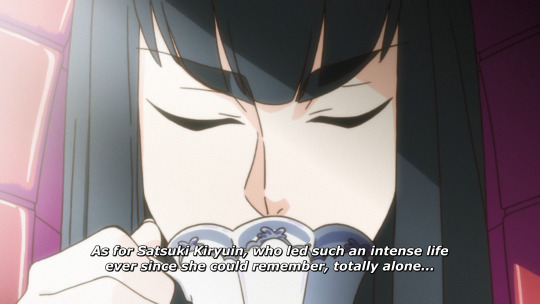
As you might expect, I always disagreed with the sentiment of Satsuki being “totally alone.” In the tags of one post, I even wrote, in response, “Nah man you’re thinking of Ryuko” and, “Satsuki had Soroi and Shiro and her Elite Four.” As I argued in the essay that you’re probably referring to, Isshin/Soichiro left Ryuko alone—and drj2008 even opened me up to the idea that he perhaps very purposely created and utilized Ryuko’s loneliness so that she would be so desperate for love that she’d bond more easily with Senketsu—but Isshin/Soichiro did at least assure that Satsuki would always have someone by her side when he told Soroi to look after her.
And I think that’s the key point of difference here. I’d never before considered that Soroi would need to gain Satsuki’s trust because I assumed he had it from the very start. My interpretation was that Soroi had to be a dear, close friend of Soichiro for Soichiro to ever ask him to look after Satsuki, and Satsuki—who adored her father, arguably to a troubling degree—wouldn’t question her father’s judgment. From the moment Soroi and Satsuki met, I believed that she would know, just by understanding Soroi’s relation to her father, that Soroi was someone to be trusted.
But I see now that my reading makes a lot of assumptions. Who knows when exactly Soroi told Satsuki that Soichiro had asked him to look after her? Satsuki might have been informed that Soroi was her father’s choice in some way (which is… actually quite curious, honestly), and Soroi might have told her that he knew everything early on, but you’re right—we don’t really know. I think your reading is very fair.
Concerning Nonon, I agree completely. I found Nonon’s part in the light novel to be absolutely tragic. Talking about the story, I once said, “It just shows how Satsuki did not trust Nonon at all.” Nonon was head-over-heels infatuated with Satsuki, but Satsuki didn’t even bother to tell Nonon when she was moving schools. That’s the exact opposite of trust.
I swear I don’t normally talk about my fanfiction in my essays as much as I have been in these responses, but I explored Satsuki and Nonon’s dynamic in a short Satsunon Roman Empire AU. In my piece, Nonon learns that Satsuki is going away by hearing some chatter, and to prove to Satsuki that she’s worth trusting, she runs to Satsuki before Satsuki leaves, declaring that she’s coming with no matter what. At the end of the fic—and this is the relevant part here—Satsuki meets with Nonon again after the world has been saved, and Satsuki finally opens her heart up, noting that she wants Nonon by her side, as a friend and equal, and she’s done with being treated as a goddess to be worshipped.
And I think that’s a big thing you’re touching on here, Anon. Satsuki may have had all these people around her, but many of them considered her to be something more than human. And that is lonely. It’s difficult to reveal your insecurities and doubts and fears to someone who sees you as a god. After all, they’re probably not going to listen; they think you’re “above” all that. Satsuki was very much isolated, just like Ryuko.
However, I still disagree with Aikuro’s assertion that Satsuki was “totally alone,” mainly due to Soroi. Regardless of how long Satsuki took to open up to Soroi, I think she most certainly had trusted him with her heart at least by the events of the series. The moment where the two converse about Soroi’s tea in episode 17 is probably the most telling example within the show itself; Satsuki smiles genuinely for Soroi and even reveals her hidden emotions, readily admitting that she may have been more compassionate in the past.
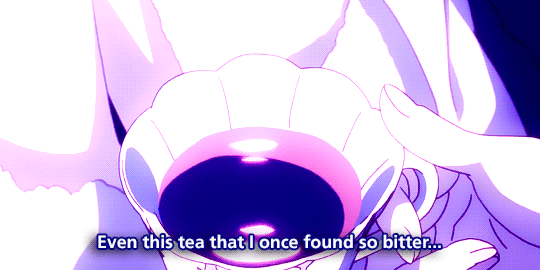
I can’t definitively say how much Satsuki let Shiro or the Elite Four in, but Soroi? There is complete and total trust here. And while I dislike comparing Soroi to Senketsu because I feel this too easily lends itself to the interpretation that Senketsu is a father figure to Ryuko (which is my absolute least favorite reading of Kill la Kill and one that I consider to be a complete and total misreading of the text #PleaseStopSenketsuIsRyuko’sDadTheories2k19), I do have to admit that Soroi is, for the majority of the anime, the one person whom Satsuki seems to truly be herself with, just as Senketsu is for Ryuko.
Concerning the episode 17 scene mentioned above, I think it’s also pretty telling that Satsuki’s moment with Soroi occurs just after an intimate conversation between Ryuko and Senketsu that the script even emphasizes as a heart-to-heart that Ryuko deliberately wanted to have with Senketsu and Senketsu alone. Sure, I’ve argued in the past that the real connection between the scenes comes from Ryuko’s later chat with Aikuro and the fact that both Aikuro and Satsuki are discussing Soichiro/Isshin, but it’s also true that both Ryuko and Satsuki have very vulnerable, humanizing moments here. Soroi knows Satsuki’s heart, and she reveals it to him, just as Ryuko (quite literally!) shares her heart with Senketsu.
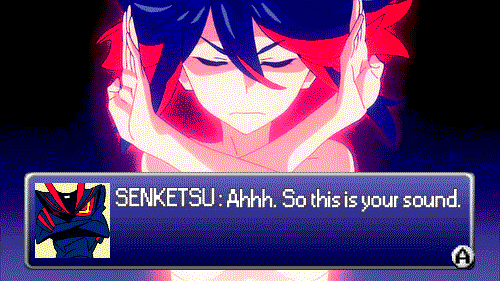
Of course, I think it’s clear that Ryuko’s relationship with Senketsu is one among peers while Soroi takes on a fatherly role for Satsuki in the place of Soichiro, but Soroi is still someone whom Satsuki trusts with her whole heart and soul. As pointed out, it may very well be true that Satsuki didn’t have that kind of trust in Soroi immediately, but I figure it can’t have taken too terribly long for the relationship between them to become close. After all, as noted in the aforementioned episode 17 scene, even young Satsuki smiled for Soroi when she had stopped smiling at school. Satsuki wasn’t being genuine, yes, but she was still breaking her hard guise for Soroi, and 18-year-old Satsuki is even surprised that she wasn’t honest back then, implying that she feels they’ve been as close as they are since practically the beginning.
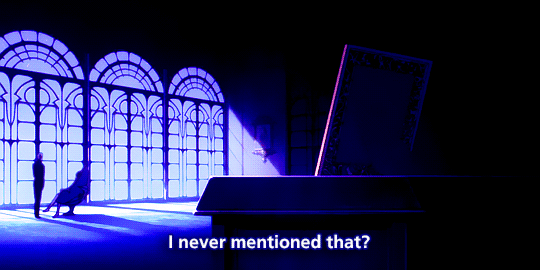
I know this got terribly long, but I don’t at all disagree that Satsuki had also been subjected to an isolating situation. It is lonesome to feel, as outlined in an early advertisement introducing Satsuki’s character, that “humans are clothes-wearing pigs” whom she must “dominate,” “rule over,” and “destroy,” all while “relying on no one.” It is awful to believe that you have to do everything all alone, without sharing your true self with anyone.
And it’s sad, too! Satsuki’s struggles to truly trust others lead her to inadvertently hurt the people she cares about, and there’s something especially tragic about how Satsuki used and manipulated her own sister—whom Satsuki was fighting for all along!—rather than tell the girl the truth and trust her. As I’ve written in the past, “While Satsuki is not truly against Ryuko, her plan prevents them from being close. The thought of Satsuki fills Ryuko with hatred… when they could have been allies and friends. Satsuki’s tired, sad frown as Ryuko returns to normal [after going berserk in episode 12], juxtaposed with the Mankanshoku family’s shock and Nui’s bemusement, does well in hinting that maybe Satsuki wishes she had Mako’s power herself… and she’s sorry that she doesn’t.”
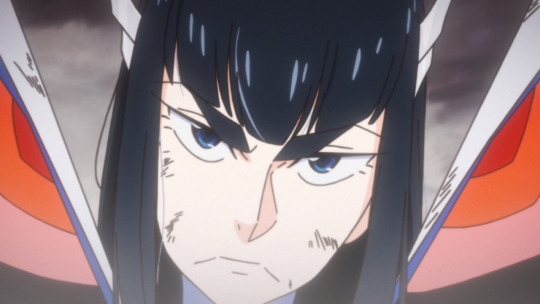
But more than all this, even Ryuko points out how alone Satsuki is after fighting Satsuki to a draw in episode 15. Ryuko only gets as far as she does by putting her complete and utter faith in Senketsu—and notably here, she follows through with his strategy even without knowing exactly what he intends to do—and she recognizes that Satsuki… doesn’t bond like that.
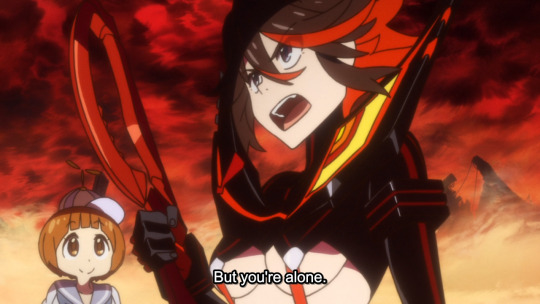
In pushing a point like this, I think the show definitely wants viewers to notice that Satsuki is stuck in a hard, isolating situation where she feels she can’t entrust her heart to anyone.
But I think the show also wants viewers to notice that Satsuki is more than capable of loving and trusting in the same way that Ryuko does. Ryuko doesn’t have a clue about someone like Soroi when she accuses Satsuki of being by herself, and as I’ve emphasized all throughout this monster of a post, I wholeheartedly believe that at least Soroi had fully earned Satsuki’s trust, even if it took a moment. Satsuki just about always had someone she felt safe with, whereas Ryuko… lost all that when her father abandoned her and didn’t find it again until she met the Mankanshokus and Senketsu. There’s a reason that one of Ryuko’s defining features is her loneliness, pointed out in her character introduction with the line, “Ever since I could remember, I was alone,” in her (and Senketsu’s) theme song “Before my body is dry” with lines like, “But I’m all alone,” and, “Don’t wanna be all alone,” in her fantasy world in episodes 20-21, and even by the cast, such as when the Mankanshokus note that Ryuko has to be super lonely to talk to her clothes or when even Ragyo tells Satsuki to go join her “lonely little sister” in death.
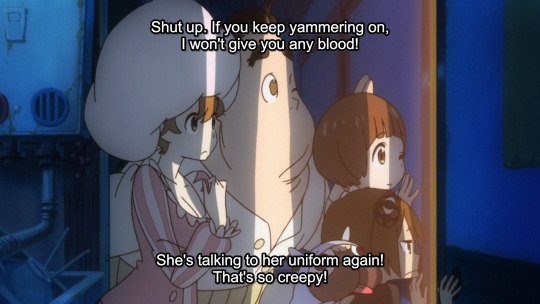
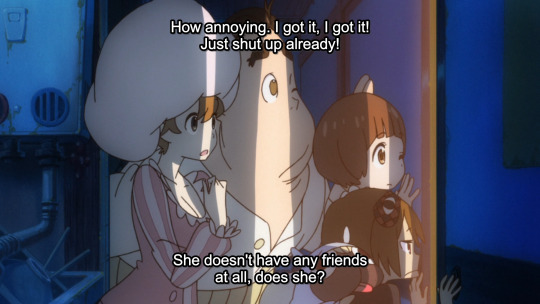
Ryuko gets a lot of heat for not being as strong as Satsuki upon learning her true origins, but I argue that you can’t really blame her. Even if Satsuki closed off her heart to most people, she undoubtedly grew up with a support system that Ryuko did not have until practically adulthood. Satsuki manages to keep her head up and carry on not only because of her immeasurable resolve and ambition, but also because she has a lifetime of love and support. Satsuki is not as alone as Ryuko claims (and I’d really like the Satsuki-centric Kill la Kill the Game: IF to elaborate on Ryuko understanding as much), and I feel that Soroi is genuinely an unsung hero of Kill la Kill. Could Satsuki have been nearly as strong without his influence?
I guess this is maybe a bit off topic, though.
In any case, I definitely agree that Satsuki struggled to open her heart to others, and I definitely agree that this is a hard, sad, awful place to be in. Part of what makes Satsuki’s team-up with Senketsu near the end of the series so sweet to me is that it is here that Satsuki really begins to open up. She doesn’t look down on Senketsu, she acknowledges his feelings, and in a cut moment from the script, she even outright tells him to wear her, thereby fully and completely trusting him to work with her and save Ryuko. Senketsu noting that his and Satsuki’s “hearts are as one” in episode 21 is one of the most heartwarming things in the entire anime when you consider everything that Satsuki has gone through. She’s been afraid to trust and afraid to show her true self to anyone, and yet… to save her sister, she opens up her heart to someone she had once considered evil and incapable of love.
And after this? Satsuki, despite saying in her introduction that she will be “bowing down to no one,” bows down to Ryuko.
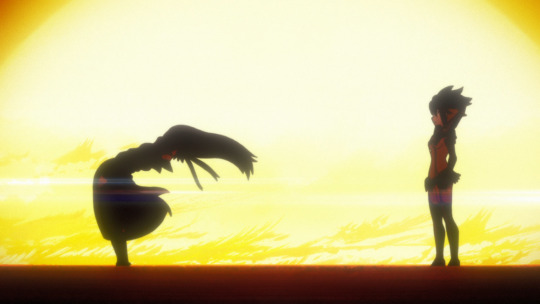
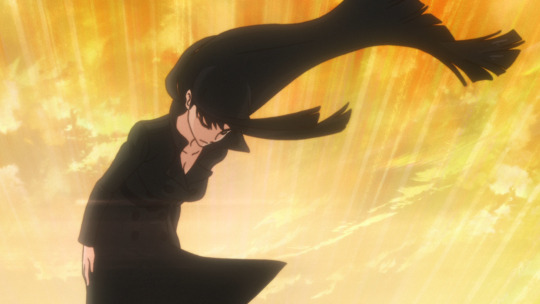
And she smiles openly.
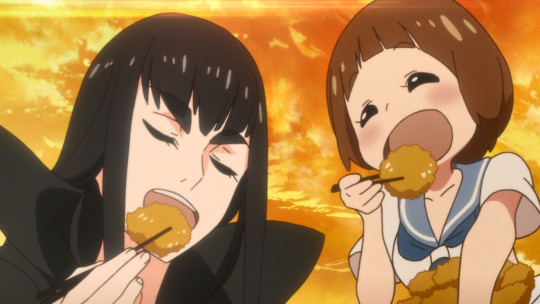
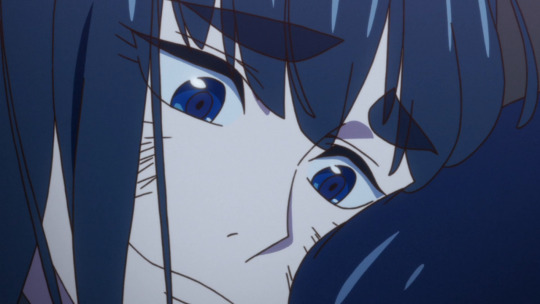
She laughs.
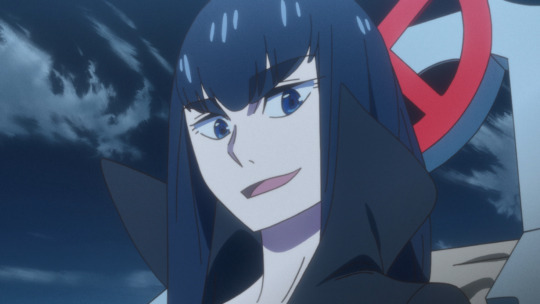
Satsuki was absolutely stuck in this lonesome, isolating position. But just like Ryuko, she gets out of it—and just like Ryuko, it’s so incredibly, incredibly sweet that she does.
#kill la kill#satsuki kiryuin#mitsuzo soroi#ryuko matoi#isshin matoi#soichiro kiryuin#senketsu#Anonymous#replies#ramblings#klk meta#gifs i made#whoops sorry this got way more out of hand than i expected ^^;#also dang i never realized how many 's'-names are in this show
68 notes
·
View notes